Mele Kyari Blames Oil Output Decline on Underinvestment, Theft, Pipeline Constraints
www.thisdaylive.com

www.thisdaylive.com
Emmanuel Addeh in Abuja President of Iran, Ebrahim Raisi and Foreign Minister Hossein Amir Abdollahian, who were on board the helicopter that suffered a “hard landing” in Iran’s East Azerbaijan province, were still missing as of 3.45 a.m Monday, as search and rescue efforts continued. Aside Foreign Minister, Abdollahian; Governor of Eastern Azerbaijan province, Malek Rahmati, Tabriz’s Friday prayer
Imam Mohammad Ali Alehashem as well as a pilot, co-pilot, crew chief, head of security and another bodyguard were also reported to be on board the helicopter. However, it was learnt that adverse weather conditions,
including heavy fog, were hampering rescue efforts even as the helicopter was still missing.
But some state media outlets, including IRNA, were reporting that the site had been located, although they were silent on the state of the
Iranian leader and other persons on board.
Islamic Revolutionary Guard Corps (IRGC) commander-in-chief Hossein Salami had also arrived at the general area of the crash to help lead search-and-rescue efforts.
This was going on as a crisis management meeting was in session with top IRGC commanders, ministers, the first vice president
Insists it’s best for effective security, functional economy Nigeria has police-citizen ratio of 1-650, far cry from United Nations minimum ratio of 1-460
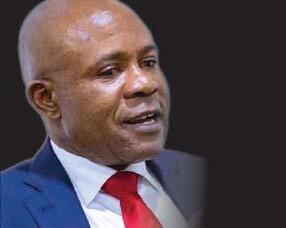


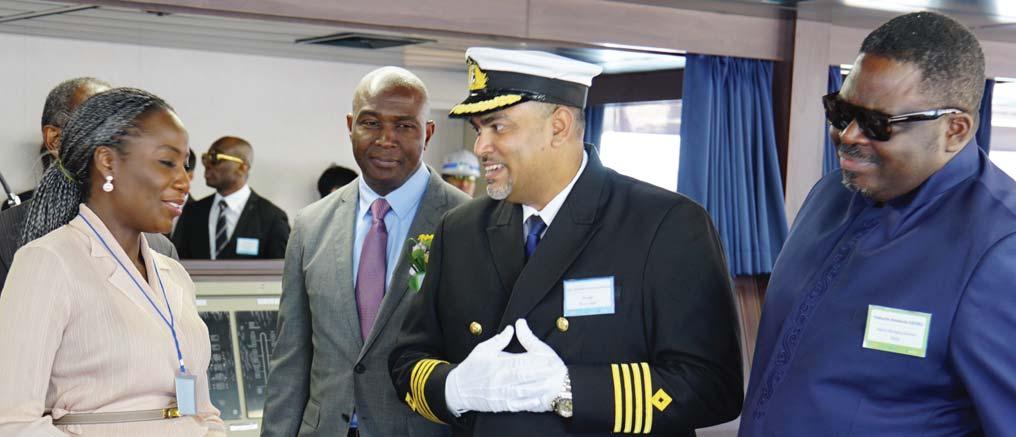
L-R: Mrs. Olu Verheijen, Special Adviser to the President on Energy and Vessel Godmother, christens AKTORAS, an eco-friendly vessel chartered by Bonny Gas Transport Limited (BGT), in Mokpo, South Korea. With her are Dr. Philip Mshelbila, BGT Vice President and NLNG’s MD/CEO, Captain De Silveira Sydney Ignatius, Vessel Master, and Mr. Olakunle Osobu, BGT Director and NLNG’s Deputy MD, during the ceremony on Friday



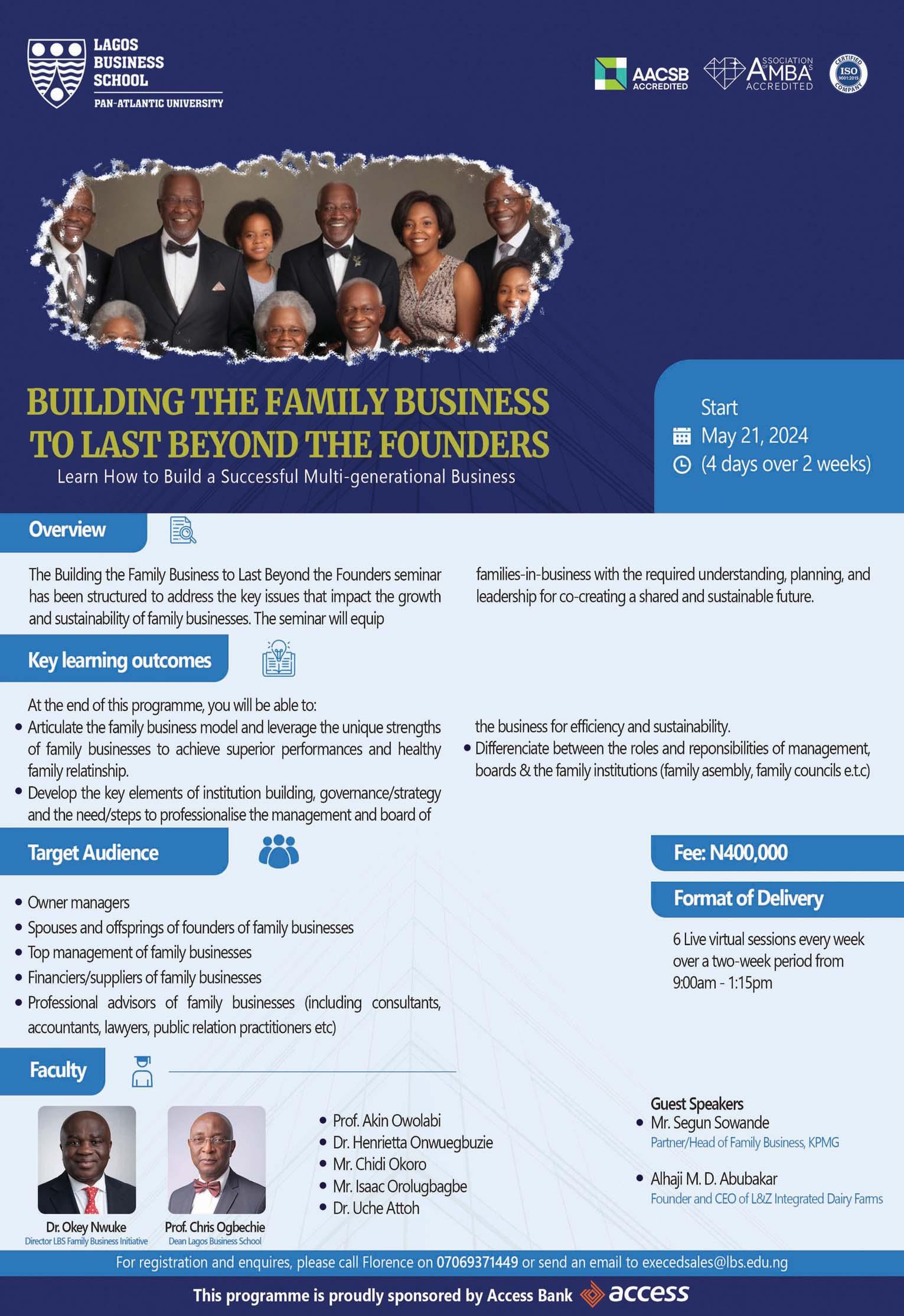
As the Monetary Policy Committee (MPC) of the Central Bank of Nigeria (CBN) meets today to assess the state of the economy following recent consecutive increases in the benchmark lending rate, analysts yesterday warned that the continued monetary tightening stance was hurting manufacturing and small businesses.
This would be the third MPC meeting under the current CBN governor, Mr. Olayemi Cardoso.
The February and March meetings witnessed hikes in Monetary Policy Rate (MPR) totalling 600 basis points. It was one of the most aggressive efforts to tame the mounting inflationary pressures, which further soared to 33.69 per cent, with the food index at 40.53 per cent in April.
Cardoso’s recent public utterances already suggest the apex bank will further tighten monetary policy tools to rein in inflation.
The CBN governor also declared that the bank had reverted to its
orthodox policy regime with a primary mandate to ensure price stability – even if at the expense of growth.
However, the committee might be preoccupied with the increasing inflationary pressures, and fluctuations in Foreign Exchange (FX) in recent times, as the local currency had shed most of the gains it recorded in the past few weeks that earned it the most performing currency in the world.
Nonetheless, analysts said given that previous increases in lending
rates had neither tamed inflation nor stabilised FX volatility, the MPC ought to hold current policy instruments constant to allow previous decisions to permeate the system.
They particularly observed that the current inflationary attacks could not be addressed by monetary policy alone, as some of the kickers were structural issues.
President, Association of Capital Market Academics of Nigeria, Professor Uche Uwaleke, said MPC was likely to increase MPR by at least 100 basis points this month.
Uwaleke said, “They had raised it by four per cent in February and added two per cent in March.
In line with the tightening stance of the CBN, we should expect another increase of at least one percentage point.
‘Inflation rose year on year in April despite the aggressive 600bps hike in the MPR between February and March and the exchange rate has yet to stabilize. So, MPC will still be concerned about the need to narrow the negative interest rate.

“Again, following the IMFWorld Bank spring meetings last Cardoso
of multi-level police by governors, when established. Bamidele said this in a statement yesterday in Abuja.
He said state police remained the best way to guarantee adequate security for Nigerians and the national assets, as well as create a functional economy.
The representative of Ekiti Central Senatorial District argued that the current unitary policing structure was no longer desirable as a result of the country's huge population.
He stated that the National Assembly was under obligation to provide a legal framework that would provide clearly defined preconditions, to which subnational governments must conform before they could establish their own police formations.
Bamidele added that the role of all the 36 state Houses of Assembly was equally indispensable in the quest to adopt the decentralised police system, because at least, the two-thirds of the state legislatures must approve the proposal before it could become effective.
He said the legal framework must be actionable and definite, evident and transparent, to allay public concern about state police.
Bamidele said, "It must convincingly address thorny issues that can, in the future, encourage the arbitrary use of state police by governors.
“It must clearly set out globally acceptable standards for unambiguous definition of the investigative, operational and prosecutorial powers of state police.
"There must be well-structured welfare packages that will discourage unethical practices, minimum security equipment that will encourage efficiency, mainstreaming accountability and transparency mechanisms into the state police operations as well as promoting professionalism across all strata of police operatives, among others.
"Providing a legal framework for the establishment of state police should not be confused with its actual implementation, when eventually adopted.
"Each of the sub-national
governments is at liberty to set its own timeline for the operationalisation of state police within its jurisdiction.
"By implication, sub-national governments can choose to operationalise their own police formations at their own pace.
"Every state, already prepared for its operationalisation, can go ahead with it without further delay.
"The development of the legal framework will prevent sub-national governments from hiding under vigilante groups to arm people unconstitutionally.
"The National Assembly must comprehensively set out the legal framework for establishing state police so that all sub-national governments can follow laid-down principles and procedures in bid to protect people’s lives and secure collective assets.
"The legal framework, no doubt, entails setting a globally acceptable policing standard, an assignment the National Assembly must carry out in outright demonstration of our spirit of nationalism, non-partisanism and utter allegiance to the Federal Republic of Nigeria.”
Bamidele added, "As a people of collective purpose, therefore, we are also under obligation to deviate from the shadow of our horrible past and embrace innovative approaches to our collective challenges.
"One of such approaches is the establishment of the state police, which in truth should be objectively designed to avoid cases of misuse for political ends."
Like other models, Bamidele said the benefits of state police outweighed its costs in all ramifications and "now is the time for us as a people of collective purpose to do the needful in the national interest".
He equally said, "Globally, also, demography often determines the size, strategy and structure of the police system a federation will adopt.
"This singular attribute largely defines the way most emerging democracies protect their citizens; secure their collective assets and create an
IRANIAN PRESIDENT, FOREIGN MINISTER, OTHERS MISSING AFTER HELICOPTER'S 'HARD LANDING' IN MOUNTAINOUS TERRAIN
and local officials, according to state media.
Turkey agreed to send 32 mountain rescue specialists to help the country in the search for the helicopter carrying the president Raisi, the government’s emergency aid agency AFAD said.
The team and 32 vehicles have been deployed from centres in eastern Turkey, said AFAD in a post on X. It added that Iran had requested the use of a helicopter with night vision.
However, it was gathered that signals had been reportedly detected by the armed forces from the helicopter and the mobile phone of a member of the flight crew.
The two-blade aircraft was said to be a medium-sized helicopter that has a 15-seat capacity, with one pilot and 14 passengers.
It is unclear how many people
were on Raisi’s helicopter, including flight crew and potential security personnel. Several remarks also poured from across the globe.
“Russia is ready to extend all necessary help in the search for the missing helicopter and the investigation of the reasons for the incident,” RIA quoted a foreign ministry spokesperson as saying.
The European Commission said it was activating satellite mapping service to aid search efforts, following a request for assistance from Iran, the European commissioner for crisis management said.
The European Commission’s Copernicus Emergency Management Service provides mapping products based on satellite imagery.
Crisis management commissioner Janez Lenarcic said on X that the
environment for a functional economy.
"Nigeria, as one of the world’s fastest growing populations, cannot continue operating a unitarist security architecture despite its strong federal tendencies.
"Such a policing model cannot meaningfully address existential threats to our internal cohesion and stability."
The principal officer noted that the current unitarist policing structure worked, when it was first adopted because the country had a smaller population compared to the current situation.
According to him, "Unlike in 1979, when we had a population of 70.75 million, Nigeria is now a federation of 229 million people, currently the world’s sixth biggest country, as shown in the demographic data of the United Nations.
"Contrarily, as revealed in the recent presentation of the Inspector-General of Police, Mr. Kayode Egbetokun, Nigeria has a police-citizen ratio of 1-650.
"This ratio is a far cry from a ratio of 1-460, which according to the United Nations, is a minimum requirement for every sovereign state or territory worldwide.
"This shortfall further reinforces the dysfunctionality of the centrally controlled model we are currently operating. Effective policing, therefore, is always a function of understanding the security environment.
"This evidently requires all operatives to understand the peculiarities of the security context without ambiguity. It also means they understand the culture, history, language and values of the people they are engaged to protect.
"It entails that they have built, even maintained a network of social capital that can help them function effectively.
"This suggests that they are familiar with their areas of responsibility, mainly the socio-economic dynamics that often breed internal challenges within the security environment.
"As currently constituted, the Nigeria Police does not possess any of these attributes, which I strongly believe, is central to crafting an alternative national security architecture that will guarantee the protection of lives and property.
"In other words, the dysfunctionality of the current police system directly correlates to the prevalence of criminal incidents in virtually all states of the federation.
"This further justifies the public demand for an alternative police system that can deepen internal stability and incentivise diverse investors from within and without."
Bamidele explained that Nigeria was operating a decentralised policing system with each regional, provincial and district government having their separate command units, until the 1966 military coup that demolished the structure.
He said, "However, the progressives do not in any way share the conviction of the conservatives on the issue of the
April, the CBN has received praise from the IMF and some global Rating Agencies, such as Fitch, for its monetary policy tightening stance.
“MPC will be mindful of that
Continued on page 36
decentralisation of the police.
"Rather, in absolute terms, they propose the need to recraft Sections 214-216 of the 1999 Constitution to introduce local, state or regional police into the country’s security architecture.
"This also suggests the exigency of devolving policing powers to other federating units – local and state governments. It is not entirely new to Nigeria’s political system.
"Until the promulgation of Decree No. 34 that birthed the unification of Nigeria in 1966, we had practised the decentralised police system under the First Republic.
"In this dispensation, as established in Section 105(7-8) of the 1963 Constitution, each regional, provincial and district government was statutorily vested with the power to create and operate its own police.
"However, the 1966 coup heralded the military rule that dismantled the decentralised police structure we embraced at independence."
the Path Ahead."
At the event well attended by top oil and gas industry players and investors, Kyari revealed that NNPCL was leading the task of reversing the unpalatable trend in the industry with its rig share programme. He added that the company planned to drill a cumulative 53 wells as part of efforts to ramp up production.
Kyari stated that as things were, it might be impossible to promise a two million barrels per day (bpd) oil production target.
Nigeria's production had been hovering between 1.2 million bpd and 1.4 million bpd year-to-date, lagging below the Organisation of Petroleum Exporting Countries (OPEC) quota of 1.58 million bpd for 2024 and far below the estimated production capacity of 2.6 million bpd.
The current oil production was also below the 1.78 million bpd projected output in the 2024 national budget, with a benchmark price of $77.96 per barrel.
But sharing his thoughts at the occasion, Kyari said the focus of NNPCL, the government and the stakeholders was to ensure the utilisation of resources available to Nigeria to increase oil production and tackle many issues confronting the country.
He said increasing oil production with the huge security challenges on the onshore assets was difficult, adding that aside the security issues, availability of infrastructure to deliver the crude oil volumes to the market is also a headache to the industry
With those challenges, Kyari stated that it would be difficult to convince investors to commit their money into oil production in Nigeria, when the produce would not get to the terminal or to the market due to security issues and infrastructure deficit.
The GCEO said due to the security concerns, operators had resorted to barging and trucking their crude to the terminals, not minding the high cost, against best global industry practice.
Kyari explained, "I can see a number of people who have got marginal fields. Yes, they are drilling, but they are concerned about how to take the production to market.
“Everybody is thinking of barging. We know barging is an abnormality. Nobody is going to spend at least $7, in some cases, $21 to transport a barrel of oil to the terminal. So, barging is not normal, barging is not economical, but that's what we are doing today.
"But the good news is that there is substantial work that is being done by government that I'm aware. Nobody speaks about it. But I know that this will come to pass. It's already subsiding. We are already seeing the results.
"I know I cannot promise two million barrels per day. It's not possible today. But is it practical? Yes. As at today's data, we are inching close to 1.7 million barrels per day. Should we celebrate this? No. And I can tell you why. On April 17, 2020, without drilling new wells, our production shot up to 2.5 million barrels a day."
Kyari attributed the sharp rise in oil production during COVID to the lockdown that forced oil thieves and pipeline vandals to shut down their illegal operations.
He stated that the industry must resolve the security issues and be able to take control of the pipeline infrastructure for delivery of crude to the terminals and the market.
Kyari pointed out that another reason for the underinvestment was the unattractive fiscal environment that existed before the enactment of the Petroleum Industry Act (PIA).
He said Nigeria struggled to change the fiscal terms since year 2000 until 2021, when PIA was passed, which brought a robust fiscal term that was enticing to investors. This was before the advent of energy transition that thwarted those gains in the fiscal terms, with the defunding of fossil fuels business by banks.
Kyari revealed that NNPCL was
trying to reverse the ugly trend in the industry through a number of initiatives, including its rig share programme and a plan to drill a cumulative 53 wells as part of efforts to ramp up production.
He stated, "For instance, in our plans for 2024... just NNPC basket between our JV and PSC partners, we have a line of sight, commitments and plans of drilling up to 26 gas exploratory and appraisal wells, over 16 gas development wells, 21 oil exploratory wells.”
He said there was still an undersupply of close to three million bpd in the market today, which he explained was in line with the projections that oil price will not go below $80 on average in the next 24 months.
Kyari said that was why oil producing countries were rushing to produce their oil now that the price was still high, saying Nigeria is also taking its own steps, which include the NNPC's rig share programme and the plan to drill 53 wells.
He stated, "We are doing something about that because once you have the assurance that your production will get to market, then you can get people to put money into drilling. And that's part of the package we are doing.
"We are going to come up with a rig share programme so that the rig owners can have an assurance that when they come to this country... the cost of the rig itself will go down, we have an assurance that the rig can stay up to two to five years.
"We have been doing one rig programme, which is unbelievable. But we want to change this and this industry will align with it, so that we have a line of sight around our commitments for robust drilling activities to actually take place and increase production."
The GCEO stated that the issues around fiscal terms and the waning investment in the Nigerian oil and gas industry prompted President Bola
Tinubu to make right fiscal policies to attract investments in the gas sector, particularly the Non-Associated Gas (NAG), through his recent executive orders.
By the executive orders, Kyari said the president softened the fiscal environment, making investors now ready to take business decisions. He disclosed that almost three major gas development projects would be taking off this year as a result of the presidential intervention.
"As we speak now, there is substantial acceleration of those decisions. I can tell you that at the back of the executive orders, there are almost three substantial gas projects that are going to take off this year," he said.
Kyari also said project contracting got enmeshed in bottlenecks and compromised, as briefcase contractors got involved, adding that even the Nigerian content development, which was to build local capacity and retain value, also got messy.
According to him, the combination of compromises along the value chain resulted in most of the critical contractors leaving the country.
But the good news, Kyari said, was that in the last one month, the foreign contractors were showing intentions to come back.
"We will bring them back in our best interest. And this cascades outside NNPC and our partner companies," he said.
Kyari explained further that it was the compromises in the contracting prices that led to the hike in oil production cost to as high as between $60 and $70 per barrel.
He revealed that the implication was that the companies indulged in that act took the value from procurement rather than from production, thus, making achievement of production growth difficult.
He said the president had stopped the ugly practice through the executive orders and the outcomes were now becoming glaring.
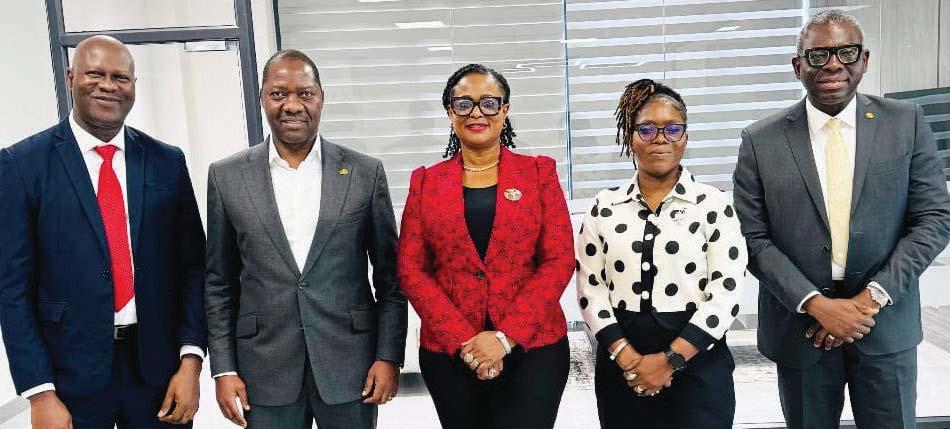
Emmanuel Addeh in Abuja
Chief Executive of Nigerian Upstream Petroleum Regulatory Commission (NUPRC), Mr Gbenga Komolafe, has stated that with the growing global investment in renewables and Electric Vehicles (EVs), Nigeria must not delay in getting its hydrocarbon resources out of the ground.
In an interview with THISDAY, Komolafe also called for a change of mind-set by oil-producing communities, maintaining that efforts by the commission to attract investment will be fruitless if the business environment remains hostile.
He explained that for investors to be persuaded by the persistent pressure being mounted by NUPRC, especially with its recent road show abroad, they must be assured of the security of their investments.
According to Komolafe, “We are still trying to do the job of a pastor that is trying to convert hardened sinners. Well, that's the job we are
doing now to get investment into the oil upstream. But we are not giving up. We are doing everything.
“Because the truth of the matter is that the industry is facing a very critical moment. The mind (of oilbearing areas) needs to shift, and this needs to shift for two reasons. The first reason is that, whether we like it or not, the world is going decarbonised, I mean, with the footprint of renewables.
“Whether we like it or not, EVs are out. And more researches are coming with the incorporation of Artificial Intelligence (AI) and all that. We know that fossil fuels will still continue to reign, but the competition, I mean, the competition with fossil fuels in terms of funding has become so high, which will cut the funding.
“So, to that extent, the first logical thing to look at is that all the funding that is going into renewables now used to go to fossil fuels. So, we are monitoring the trend. The rate of growth of investment in renewables is far
outstripping that of fossil fuels.
That is the truth.”
He expressed concern that if Nigeria’s God-given resources were not aggressively explored and exploited, it could become like the coal in Enugu, which nobody was currently fighting over.
Komolafe stated, “So, the mind shift for us should be for those two reasons: The first reason is that because of the global footprint in energy transition, the momentum is getting high with immediate consequence of defunding.
“So, if that is the case, it now means that if we are able to get investors, we should be very sensitive to how we handle them by creating a congenial and favourable atmosphere for these investments to thrive. And if that happens, then the multiplier effect of that will cushion the economic situation.”
Komolafe emphasised that while the commission was doing everything within its powers to draw the attention of the world to why Nigeria remained a good
destination for investors, it would be appropriate to extract cooperation from the communities for their own economic prosperity.
The NUPRC boss and his team were in the United States last week for a roadshow as Nigeria ramped up efforts to draw international attention to the ongoing oil blocks bid round.
Nigeria has over 37 billion reserves of crude oil and over 209 TCF of gas, but has been unable to fully take advantage of the resources due partly due to waning investment in the sector as well as insecurity in the Niger Delta.
Komolafe said, “Before we said we wanted to go and attract investors offshore. Look, if people like me don't do what we are doing, the result will just be like coal in Enugu. It will become useless. I mean, who is bothered about what is happening in Enugu now? Nobody is bothered about it. They have coal, but it is useless.
The Nigerian Association of Chambers of Commerce, Industry, Mines and Agriculture (NACCIMA) has received a delegation from Hunan Province, China, at the Abuja Chamber of Commerce and Industry (ACCI) office, as part of renewed efforts to strengthen the bilateral trade relationship between Nigeria and China.
The 22-member delegation, led by the Director General of the Department of Commerce of Hunan Province, Shen Yumou, included government officials, business leaders, and representatives from the Bank of China.
They were joined by Dr. Victor Ayemere, the NACCIMA Coordinator in China and Chairman of Zeenab
Foods Limited. In a speech on behalf of the National President of NACCIMA, the ACCI President, Chief Emeka Obegolu SAN, reaffirmed NACCIMA’s commitment to fostering sustainable economic ties and addressing the challenges faced by Nigerian exporters in the Chinese market.
The meeting highlighted the need to expand the range of Nigerian agro commodities included on China's protocol list, and the concerns regarding the issuance and acceptance of letters of credit between Nigerian and Chinese banks.
The Director General of Hunan's Department of Commerce, Mr. Shen, acknowledged the strength of the
bilateral relationship and expressed a willingness to enhance cooperation as part of the broader China-Africa Initiative.
He also announced the upcoming China-Africa Economic Trade Expo to be hosted in Nigeria in November 2024, promising further collaboration details to NACCIMA.
NACCIMA's President, Hon. Dele Kelvin Oye Esq., in his speech, underscored the importance of the current discussions as a pathway to increased trade opportunities and highlighted the need for dialogue to resolve the issues surrounding financial instruments critical to international trade.
The Association is poised to work closely with the Hunan delegation
and relevant stakeholders to pave the way for a more inclusive trade agreement that benefits both Nigerian exporters and Chinese importers and to support the establishment of a Nigerian business presence in Hunan.
NACCIMA remains dedicated to enhancing its role as a pivotal force in the advancement of commerce and industry, not only within the Nigerian economy but also in its international engagements, particularly with China.
The meeting concluded with a commitment to ongoing dialogue and collaboration, and a group photo that symbolized the shared vision of prosperity and strong economic ties between Nigeria and Hunan Province.
“They have coal, the coal is there, nobody is quarrelling over it now. Yes, the coal is under the ground there abundantly, nobody is using coal to drive trains, locomotives now, nobody.
“So, the same way we are asking for support. We need to do it fast so that the multiplier effect of getting these investors will impact on our life and funds from there can be used to develop our critical infrastructure.
“So, the mind-set has to change. Whether we like it or not, the era of militancy should be done with. These investors, if we are able to attract some of them, then we are ready.
“Thank God, now we have the Petroleum Industry Act (PIA), so we can inculcate social inclusion, so that we can have a conducive, congenial operating atmosphere.”
Onyebuchi Ezigbo in Abuja
Amid concerns over moves by the federal government to establish a new Health Maintenance Organisation (HMO) to cater for federal civil servants, the Ministry of Health and Social Welfare has said that no such facility is being set up.
A statement posted by the Ministry of Defence on its website on Thursday had said the new HMO would be known as the Federal Civil Service Health Maintenance Limited.
The statement quoted the Permanent Secretary of Ministry of Defence, Dr Ibrahim Kana, as having has that President Bola Tinubu had approved the creation of a new HMO to be called FCSHML.
However, the Minister of Health and Social Welfare, Prof. Muhammad Pate faulted the announcement made by the Ministry of Defence on the approval of the creation of a new HMO for civil servants.
In a post on his X handle, Pate said: "I am very surprised to see this announcement on a matter that is far from being concluded. President Bola Tinubu’s administration is focused in the health sector on
expanding financial protection for all Nigerians, not only a few privileged ones.
"The forces that held back progress on health insurance (only about 7 per cent population or 16 million of Nigerians covered in more than 20 years) waking up to undermine efforts to reform the National Health Insurance Authority (NHIA) to accelerate coverage for all Nigerians.
"I urge the proponents of this ‘project’ to tarry a bit, not conflate power with knowledge, and work through this effort constructively and as part of the NHIA reforms underway. Urging all involved to carefully consider the implications of undermining Nigeria’s progress on Universal Health Coverage (UHC) for narrow and very short term interests".
The minister further explained that the reform being carried in the health insurance scheme will expand coverage for civil servants, including through a properly established and appropriately regulated Federal Civil Service HMO coverage for retirees. He said that the facility will at the same time expand protection for millions of poor and vulnerable Nigerians, not only for the federal civil servants.
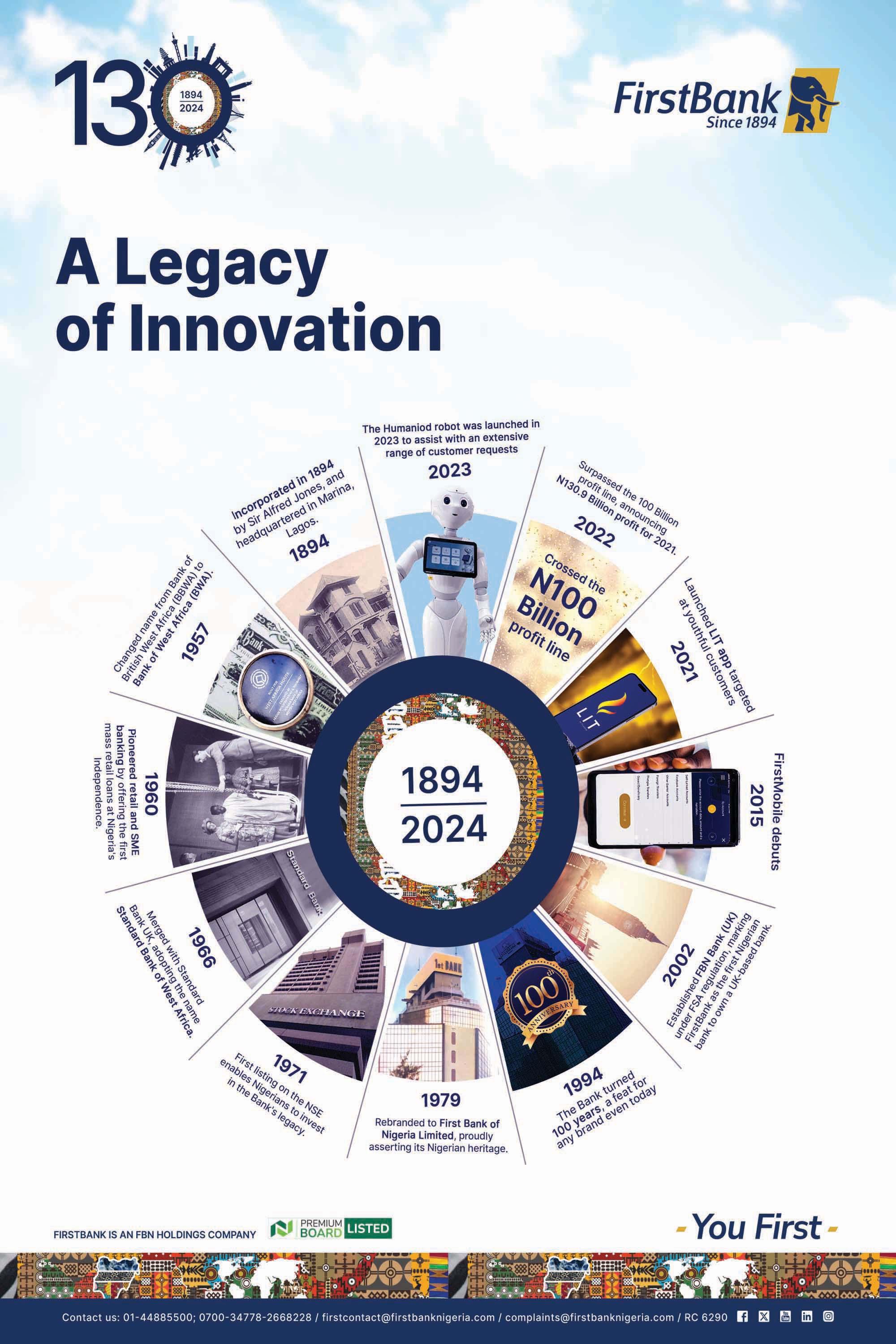

L-R: Co-Founder and Chief Executive Officer, Peach Payments, Mr. Rahul Jain; Senior Vice President and Head of Sub-Saharan Africa Region , Visa, Aida Diarra; Director of Payment Systems, National Bank of Rwanda (NBR),Mr. Christian Kajeneri;, Senior Director, Corporate Communications, Sub-Saharan Africa, Visa, Lesego Charlie; and Chief Executive Officer, KCB Group Plc, Mr. Paul Russo, during an Innovation for Inclusion panel discussion in Kigali, Rwanda ... recently
The Minister of Housing and Urban Development, Ahmed Dangiwa, yesterday said he was set to commence the nationwide official groundbreaking for the phase 1 of the Renewed Hope Cities and Estates project, beginning with 1,250 housing units in four states in Northern Nigeria.
The exercise follows the programme's official launch by President Bola Tinubu, with a 3,112-housing unit project in Karsana, Abuja, in February 2024.
However, the federal government called on a couple of states that hadn't provided land for the commencement of the projects to do so, in order to fast-track the national housing plan of the Tinubu government. The successful completion of the contracting process and mobilisation of reputable developers to start work has set the stage for this significant development, the minister said. Dangiwa, a statement by his Special Assistant on Media and Strategy, Mark Chieshe, said, will
President Bola Ahmed Tinubu, former President Olusegun Obasanjo, Deputy Secretary-General of the United Nations, Ms. Amina Mohammed among others, will Wednesday attend a summit on the state of democracy in Africa.
The summit organised by Olusegun Obasanjo Presidential Library and the Shehu Musa Yar'Adua Foundation, would take place against a backdrop of significant political changes, including a recent surge in military coups in various African countries.
In a statement issued yesterday by the organisers of the event, the summit, which is supported by the Ford Foundation and Trust Africa, it said the programme scheduled to hold Wednesday May 22, 2024, at the Shehu Musa Yar'Adua Centre, Abuja.
It said the summit would evaluate and discuss challenges and opportunities for democratic governance across the continent.
Former President Obasanjo, Deputy Secretary-General of the United Nations, Mohammed among others would deliver keynote speeches.
The statement read: “The summit will serve as a high-profile forum to evaluate and discuss challenges and opportunities for democratic governance across the continent.
“Taking place against a backdrop of significant political changes, including a recent surge in military coups, the summit will address pressing threats to fragile democratic processes in various African countries.
“H. E. Bola Tinubu will serve as
special guest of honour. The event will feature a series of engaging discussions, with keynote speeches from distinguished leaders including H.E. Olusegun Obasanjo and Ms. Amina Mohammed, Deputy Secretary-General of the United Nations. Mr. Darren Walker, President of the Ford Foundation, will also deliver special remarks on the pivotal role of civic engagement in bolstering democratic institutions.
“The summit will discuss a range of critical topics, including the achievements and challenges of the current democratic landscape in Africa, the impact of military coups on democratic integrity, and the exploration of alternative democratic models that reflect Africa’s historical and cultural contexts.
“Additional insights will be drawn from Afrobarometer surveys on citizen sentiments and perceptions of democracy, as well as strategies for strengthening democratic resilience against both external and internal threats.”
It added that the summit seeks to foster constructive dialogue among African leaders, policymakers, academics, and civil society representatives, with the goal of enhancing understanding of Africa’s democratic state.
It is also expected to promote intercontinental collaboration for sustainable governance, and developing actionable strategies to tackle challenges to democracy and governance on the continent.
The event is anticipated to attract a diverse audience, including government officials, civil society leaders, scholars, and the public, who are all stakeholders in the future of democratic governance in Africa.
officially flag off construction activities at the project sites in the four states, namely: Katsina, Kano, Yobe, and Gombe from Wednesday to Saturday.
“We are committed to our promise to the president to turn the country into a huge construction site and unlock the potential of the housing sector to create jobs, catalyse economic growth, and contribute to the $1 trillion economy while boosting national development.
“The 1,250 units that we are breaking ground for in Katsina, Kano, Yobe, and Gombe is only a start. After this, we shall be proceeding to other parts of the country,”Dangiwa said.
The minister noted that under the 2023 supplementary budget, the ministry had awarded contracts for 3,500 housing units in 13 states since December 2023.
These, he said, include 500 housing units in Kano as well as 250 housing units in 12 other states, including Katsina, Sokoto, Yobe, Gombe, Nasarawa, Benue, Osun, Oyo, Abia, Ebonyi, Delta and Akwa Ibom.
“The Renewed Hope City in Kano comprises: 100 units of one-bedroom (semi-detached bungalows), 300 units of two-bedrooms (semidetached bungalows), 100 units of three-bedrooms (semi-detached bungalows).
“Also, the Renewed Hope Estates in Katsina, Yobe, and Gombe each comprise: 50 units of one-bedroom (semidetached bungalows), 100 units of two-bedrooms (semidetached bungalows), 50 units of three-bedrooms (semi-detached bungalows)
“To enhance affordability and ease of offtake, we used organic
designs where one bedroom can be expanded to two-bedrooms and three-bedrooms as the income of beneficiaries increase over time,” Dangiwa said.
At an average of 25 direct and indirect jobs per housing unit, the 1,250 housing units, he stressed, are estimated to create 31,250 skilled and unskilled jobs in these states.
“Construction work at the sites will also stimulate local economic activity, benefiting the communities and the broader economy.
“The housing projects also seek to address social inequality by providing a broad range of affordable ownership options. These include: single digit and up to 30-year mortgage loans to be provided by the Federal Mortgage Bank of Nigeria (FMBN), Rent-to-Own options
where beneficiaries can move in and pay towards homeownership in monthly, quarterly, or annual instalments and Outright Purchase for high income earners.
“The 1,250 housing units are being funded under the N50 billion 2023 supplementary budget of the Federal Ministry of Housing and Urban Development,” he added. The minister assured all state governments that the Renewed Hope Housing Programme was designed to cover all the states in the country.
He stated that states that were not covered under the 2023 supplementary budget will be covered under the 2024 Budget.
“He therefore called on all state governments who are yet to provide land for siting the projects to do so to enable the ministry finalise project plans,” the minister was quoted to have said.
In a bid to address growing cases of unethical practices in organ donation and transplantation in the country, federal government has said it will soon launch new national guidelines to regulate operators in the sector.
This is as the Transplant Association of Nigeria (TAN) urged the government to invest funds in medical infrastructure to address organ transplant tourism by investing in the local subsector.
Despite having a sufficient number of medical professionals in the field, Nigeria still faces significant challenges due to inadequate infrastructure and equipment with only 15 kidney transplant centres in the country.
The Coordinating Minister of Health and Social Welfare, Prof. Ali Pate, who was represented by Director of Trauma Department, Dr. Karmil Soretire spoke during the Living Kidney Donor Day event at the weekend.
Organised by Nisa Medical Group in Abuja, Pate said the event was an opportunity to take stock and appraise the progress, challenges and change and to chart new ways forward.
He said that the number of patients affected by the chronic kidney disease had been on the
rise affecting an estimated 843.6 million individuals worldwide as at 2017.
The minister listed some of the risk factors of kidney disease in Nigeria to include, high blood pressure, hypertension, diabetes and infections causing inflammation of the kidney.
Pate said that an alarm was raised in 2019 about two new causes of Kidney disease in Nigeria which were identified as toxicity caused by prolonged consumption of traditional herbal concoction and exposure to harmful chemicals due to use of skin bleaching cream.
He noted that other causes of kidney disease are high cholesterol level in the blood, kidney stones, environmental pollution and unsafe drinking water, abuse of analgesics and use of pesticides by farmers.
In his remarks, the Chief Executive Officer of NISA Medical Group, Dr. Ibrahim Wada said the event was the second edition of the Living Kidney Donors Day being celebrated by the hospital group in collaboration with its partners - the Clarion Call Care to honour the heroic act by the donors.
Wada said: " Your extraordinary act has helped to inspire us and bring hope to countless lives in need".
He said that the event was meant
to educate, inspire and empower people with information on the remarkable experience of the living donors.
Speaking on the concerns generated by allegations of organ harvesting against some hospitals in the country, Wada said: “This insidious and important practice exploits the vulnerable and undermines the ethical foundations organ transplantation. Ultimately we are all harmed".
As part of measures to combat the crime of organ harvesting, Wada said that NISA was committed to using donor awareness and education campaign as a powerful tool.
He said that by raising awareness about the risks of unethical implications of organ trafficking, the world can protect potential donors and recipients alike. Also, he said that through community outreach, educational campaigns and policy advocacy the group aims to foster a culture of informed and voluntary donation.
According to the physician, there was a drive to create a safe and supporting environment for donors, ensuring their health and wellbeing before, during and after the donation.
Wada said that the highlight of the engagement was on donor
protection mechanism. He said that NISA Group recognises the importance of safeguarding kidney donors through comprehensive medical care, psychological support and robust medical frameworks.
Vice President of TAN Prof. Aliyu Abdu said there are more than 15 centres in Nigeria where kidney transplant are being carried out. He however said that out the 15 kidney transplant centres, only a few are currently active, adding that the challenges that the facilities are facing are enormous. Abdu said that most of the active kidney transplant centres are owned and operated by the private sector.
On the issue of alleged abuses and unethical practices associated with organ transplant in Nigeria, Abdu said that TAN was working with the Federal Ministry of Health and Social Welfare to develop new guidelines that will sanitise organ transplant business in the country.
"I want to assure Nigerians that TAN is working hard to bring sanity to these specialised medical services. We are happy to inform you that the Federal Ministry of Health and Social Welfare has established a committee that is working on producing guidelines on organ transplantation in Nigeria to ensure that ethical practices are maintained in the sector," he said.
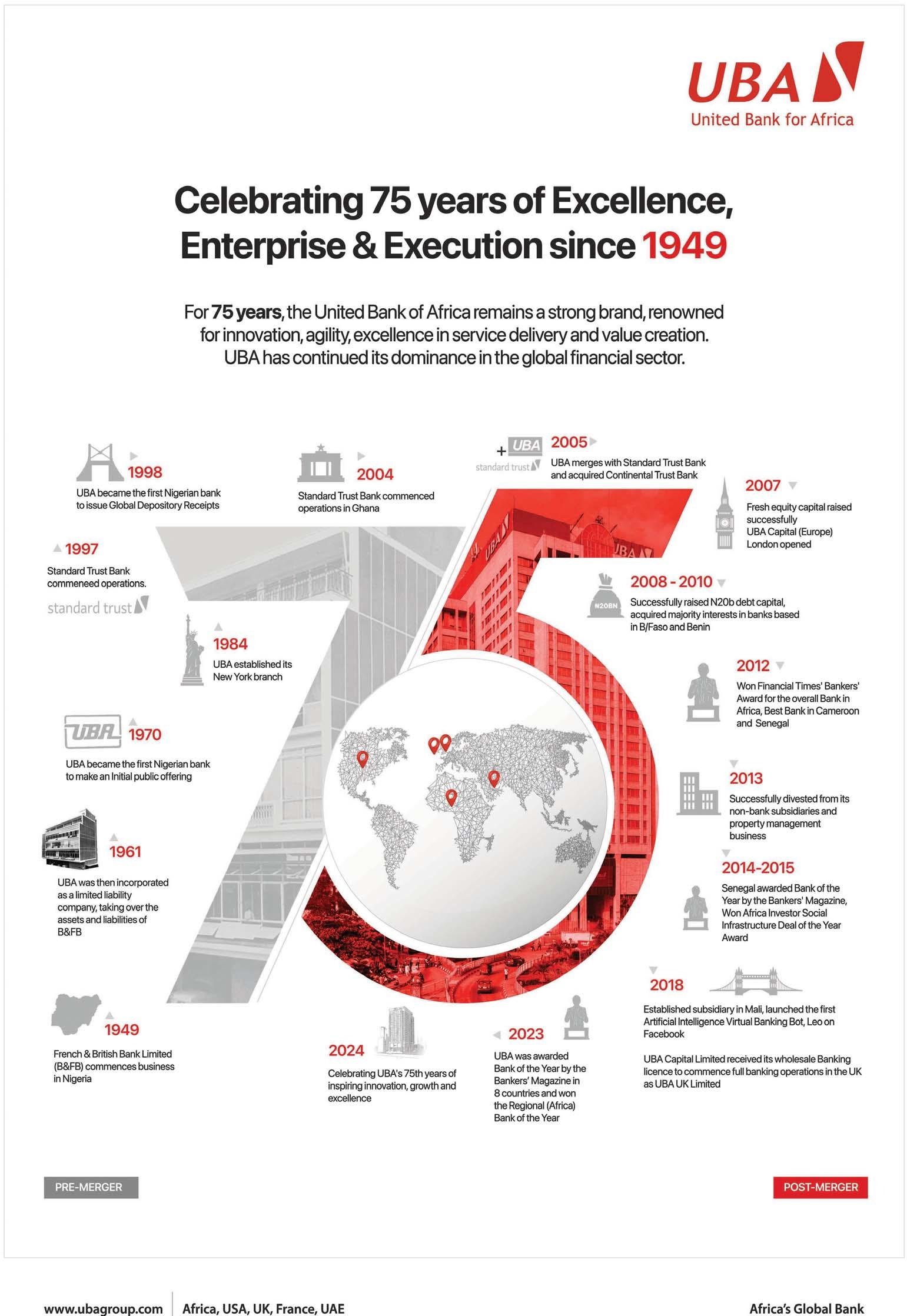
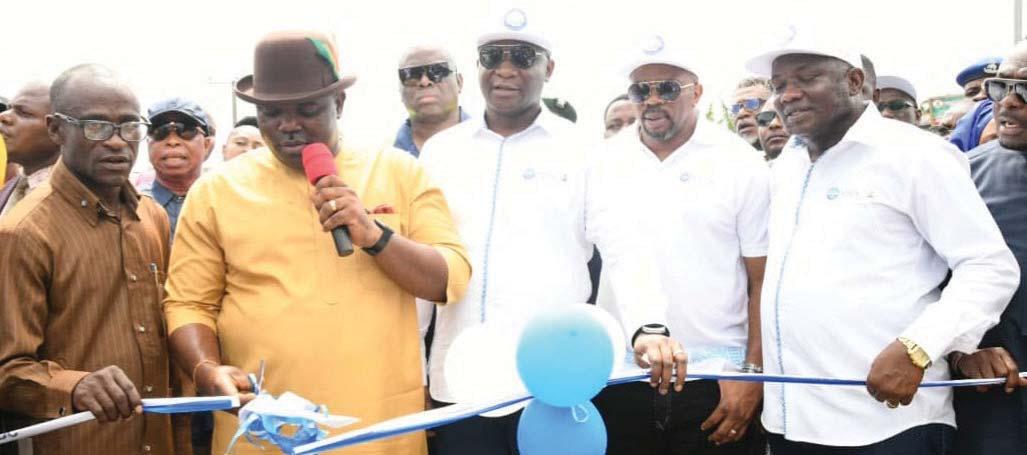
Emmanuel Addeh in Abuja
Britain will spend more than £10 billion or $12.7 billion compensating thousands of people who were treated with blood contaminated with HIV or hepatitis C in the 1970s and 1980s, Reuters quoted the Sunday Times as reporting yesterday.
The infected blood scandal is widely seen as one of the worst treatment disasters in the history of the statefunded National Health Service.
An estimated 30,000 people were given contaminated blood, with about 3,000 of those believed to have died. Many more lives have been affected by disease and some of those infected have never been traced.
Victims and their families are still calling for justice, compensation and answers over how it was allowed to happen despite warnings over the risks.
The blood and blood products, some of which were imported from the United States, were administered to people needing transfusions or as treatment for haemophilia.
Ahead of the publication of an independent inquiry report on Monday, the Sunday Times said Prime Minister Rishi Sunak would make an official apology. The government would then announce a compensation package financed by borrowing as early as Tuesday (tomorrow).
"I think this is the worst scandal of my lifetime," Finance Minister, Jeremy Hunt, told the paper.
"I think that the families have got every right to be incredibly angry that generations of politicians, including me when I was health secretary, have not acted fast enough to address the scandal," he added.
He did not confirm the cost or funding arrangements of the compensation scheme.
Former prime minister David Cameron in 2015 apologised for the scandal following a report into its impact in Scotland. In 2017, under prime minister Theresa May, the government announced the public inquiry.
The inquiry will publish its findings on Monday (today) having considered
questions including whether the contaminated treatments should have been stopped sooner and whether there were attempts to cover up the problem.
The government has already paid 100,000 pounds of interim compensation to some victims at an estimated cost of around 400 million pounds following a recommendation from the inquiry in 2022.
In April this year, it was reported that commercial blood product at the centre of the biggest treatment scandal in the history of the National Health Service (NHS) was approved for use after government officials were told convicts were among the paid donors and virus contamination “should be assumed.”
The product, given to haemophiliacs to enable their blood to clot, was injected into thousands of patients in the UK in the 1970s and 1980s, including young children, who were infected with the diseases.
A single batch could contain plasma from 20,000 donors harvested in US prisons and some of the poorest
neighbourhoods of America, where drug use and sexual infections were rife. One infected donation would contaminate the entire batch, a report quoted by THISDAY said.
The inquiry headed by Sir Brian Langstaff is expected to make a submission on the scandal, which has killed about 3,000 people. He had already concluded “wrongs were done at individual, collective and systemic levels”.
The drug firm, Bayer, provided 7,000 documents to the inquiry, which revealed its subsidiary, Cutter Laboratories, warned in licensing application documents in the 1970s that its commercial blood product Koate, may contain viruses.
The product, known as a factor VIII concentrate, was approved in August 1976 along with similar treatments that were a conduit for deadly viruses for several years.
Des Collins, of Collins Solicitors, acting for 1,500 infected or affected people, said the licensing documents were “shocking” and products should not have been approved until viral
Michael Olugbode in Abuja
The National Drug Law Enforcement Agency (NDLEA) has declared a couple, Kazeem Omogoriola Owoalade and Rashidat Ayinke Owoalade wanted over their alleged involvement in running a drug cartel. A statement yesterday by the spokesman of the anti-narcotics agency, Femi Babafemi, said the couple was declared wanted following the arrest of four members of the syndicate in Lagos.
He added that a Sports Utility Vehicle was recovered and two houses already traced to them sealed for forfeiture to the federal government. Babafemi said two members of the syndicate: Imran Olalekan and Ishola Olalekan were arrested on April 3, 2024 following their bid to export 3.4 kilogrammes cocaine on a Qatar
Airlines flight going to Oman through the Murtala Muhammed International Airport, Lagos.
He said while Imran was the courier conveying the drug consignment to Oman, Ishola recruited him for the head of the cartel, which investigation has now revealed to be Owoalade whose Indian residence permit bears Abdul Qassim Adisa Balogun based in India. He revealed that efforts to dismantle his network in Nigeria paid off after five weeks of surveillance and follow up operations when another member of the syndicate, Hamed Saheed who works directly with the baron was arrested last Tuesday at Abule Egba area of Lagos.
The NDLEA spokesman added that it was indeed Saheed who lodged Imran in a hotel a day before his aborted trip to Oman and equally dropped him and Ishola at the Lagos airport
the day they were arrested.
He disclosed that during a search of Saheed’s house, NDLEA operatives recovered some phenacetine, a cutting agent for Cocaine, weighing 900 grammes.
He was said to have confessed that the recovered substance was what was left of the consignment Imran was taking to Oman the day he was arrested.
“Saheed’s arrest led to a follow up operation at the home of the Owoalade couple at 20 Eyiaro street, Ogudu Orioke, Lagos where another suspect was arrested and a new model Toyota RAV4 SUV marked FKJ-773 JJ belonging to Rashidat and additional 400 grams of Cocaine recovered in addition to already prepared suitcases to be used for illicit drug concealment, digital weighing scales and other paraphernalia,” he said.
He stressed that NDLEA officers of the Directorate of Operations and General Investigations (DOGI) attached to a courier firm in Lagos last Wednesday intercepted two parcels, containing cocaine and amphetamine concealed in steel bolts and shea butter.
While the cocaine weighing 587 grammes, was concealed in eight steel bolt screws going to China, the amphetamine consignment packed in vape pens and hidden in shea butter was going to the United Kingdom.
He said an attempt by Emeka Nwadiaro (a.k.a Mega) to export 3.6 kilgrammes Loud, a strain of cannabis concealed in 36 water flasks to Dubai, UAE was also thwarted at a logistic company in Port Harcourt, Rivers state last Thursday while a swift follow up operation led to the arrest of the owner of the consignment, Emeka Nwadiaro in Onitsha, Anambra state same day.
inactivation was available. “There was a huge failure by ministers and successive administrations,” he had said.
Stuart Cantrill, 50, whose father Barrie died in 1989 from an Aidsrelated illness after contracting HIV from a commercial blood product for haemophilia, said: “There were clearly some in the NHS and in government who were aware of the risks and chose to ignore them. They went ahead and used a product which was almost certain to infect everyone.”
Experts in the 1970s considered the risk of a patient contracting hepatitis B from the pooled products was outweighed by the benefits of treatment, but did not consider the presence of more deadly viruses which had not then been identified, specifically hepatitis C and HIV. When the cases of Aids were first reported in the 1980s, officials and ministers failed to act over the risk of the disease being spread by the contaminated blood. The Observer flagged the risk in January 1983, warning: “A commercial blood product imported into Britain from the United States may pose a grave threat to the health of haemophiliacs.” Four months later, the Mail on Sunday warned of hospitals using killer blood. It warned the pooled blood products from the US might be infected with HIV and “threatening the lives of thousands of British people”.
Kuni Tyessi in Abuja
The Speaker of the Cross River State House of Assembly, Elvert Ayambem, has disclosed that the State Assembly will stop and revoke wrong and illegal contracts that were signed and entered into by the past administration of Prof. Ben Ayade. He said the move is as a result of a probe into the activities of the Ayade-led administration, and the State Assembly is poised to ensuring that every wrong approach to executing contracts, concessions and spending of public funds is looked into owing to the high debt profile of the state.
Speaking to newsmen in Abuja, Ayambem also disclosed that Ayade's successor and present governor of the state, Senator Bassey Otu was not finding things easy due to the state’s heavy indebtedness.
He said: "The loans that the previous administration acquired has relatively placed us on edge right now. You can't quantify it because it is much and it is heavy, which is relatively placing the House on an edge.
"And we discovered lately that almost all those ones that are viable
were under concession two days before leaving the office. And who are those people that these projects were ‘concessioned’ to, you realise that it's friends and family.
“But all of them are concessioned to one person. You bring this one, he would say the name of the company is this, this other one the name of the company is this.
"Meanwhile, you have 90 per cent ownership in those companies. I can tell you that in all of these projects you hear about concessioning, no dime was paid into Cross River State Government coffers. Not one dime. Prove me anywhere, not one dime was deposited into Cross River State account.
"We understand that the governor is going through a lot because of the loans. That is our worries too. I wish the governor we have today came and met a sizable loan that he can repay, it would have helped a great deal. You know he is trying to finish the Airport, that International Cargo Airport in Obudu.” According to the speaker, despite Cross River State government having 30 per cent shares in Transcorp (Metropolitan) Hotel, but no trace of anything was paid into the state's coffers.

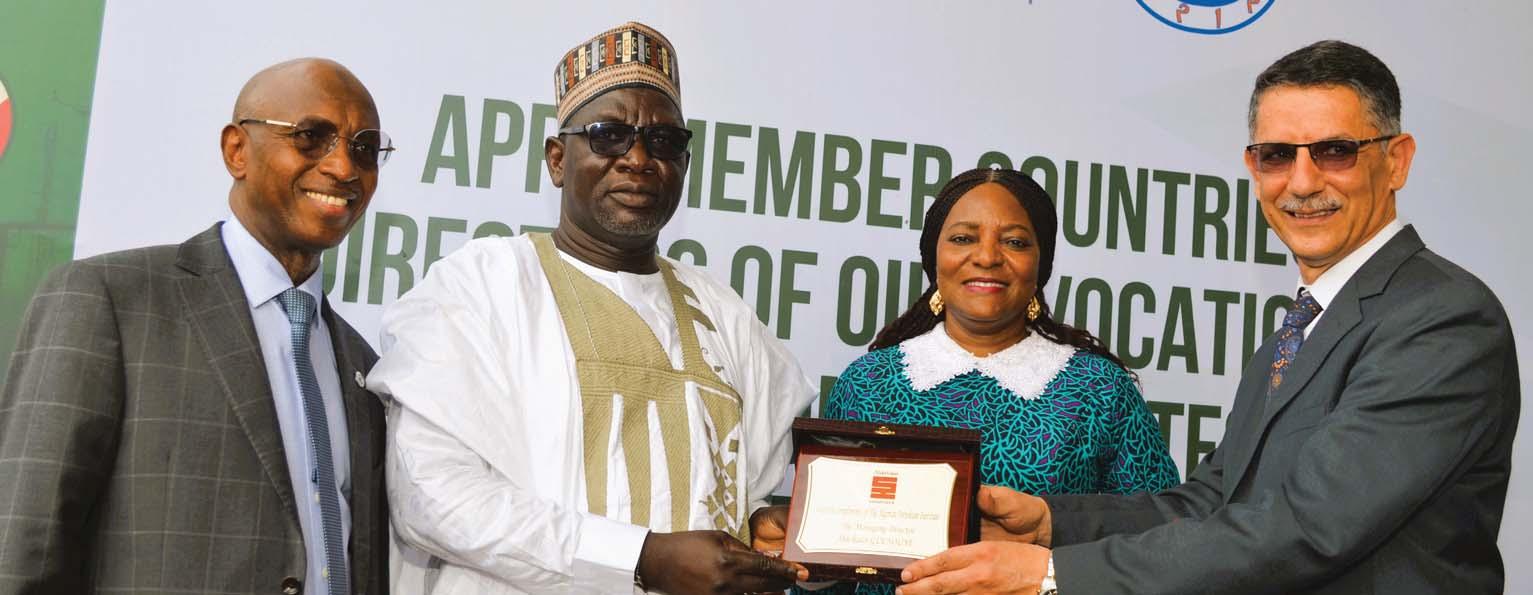
Emmanuel Addeh and Michael Olugbode in Abuja
The leader of an attempted coup yesterday in the Democratic Republic of Congo (DRC) has been killed and some 50 people, including three American citizens arrested, a spokesman for the Central African country's army told Reuters.
Gunfire rang out around 4 a.m. in the capital Kinshasa, a Reuters reporter said, while armed men attacked the presidency in the city centre, according to spokesman Sylvain Ekenge.
Another attack took place at the
nearby home of Vital Kamerhe, a member of parliament who is tipped to become speaker, Kamerhe's spokesman, Michel Moto Muhima, and the Japanese ambassador said in posts on X.
Muhima said two guards and an attacker had been killed in that incident. Ekenge also said one attacker was killed there.
A shell fired from Kinshasa hit the city of Brazzaville in neighbouring Republic of Congo, injuring several people, that country's government said in a statement, adding that one person had been hospitalised.
Ekenge named Christian
Afroflavour Food Festival (AFFF) has announced that it set to take the festival to the Maryland in the United States and Manchester in the UK, urging all interested participants to come experience the vibrant spirit of Africa through music, fashion, art, lifestyle, and cuisine.
It said in a statement that the event will be in Manchester on July 6, 2024, and Maryland on August 3, 2024, explaining that the unique celebration will unite foodies, fashionistas, music enthusiasts, art lovers, industry practitioners, and culture lovers for an unforgettable experience.
It invited all and sundry to get ready to immerse themselves in the heart and soul of the African continent at the AfroFlavour Food Festival as well as discover the best of African cuisine, music, lifestyle, and art in a dynamic and engaging atmosphere.
The Food Festival is a unique fusion of music, lifestyle, and culinary delights, designed to take the culinary curious on an unforgettable journey through the heart and soul of the African continent, it said .
“At AfroFlavour, our vision is to grow the global African food industry through festivals, conferences, advocacy and specialised platforms like our African Export Pavilion. We will contribute to mainstreaming
African cuisine into a billion-dollar market catalysing industrialization and exports in African economies.
“Featuring a range of activities, including an African Food Business Conference for entrepreneurs, fashion and art stalls, runway presentations, and exciting food contests like the "Jollof Wars," this festival offers something for everyone.
“Children and teenagers can also enjoy fun activities, while attendees can indulge in culinary delights from top chefs, restaurants, and street food vendors,” the statement said.
"We are excited to bring the vibrant spirit of Africa to Manchester and America," said Lucky Idike Jr., founder of AfroFlavour Festival.
"Our goal is to showcase African food, culture, and entrepreneurship in a way that is entertaining and enriching for all who attend," he added.
It urged everyone not to miss the chance to experience the diverse flavours of Africa at AfroFlavour Food Festival and to join an unforgettable night of Afro Vibes music with DJ BLOX, enjoy great music, delicious food, and a sense of community celebrating African culture.
For more information and ticket purchases, it urged interested persons to visit https://afroflavour.org, @ afroflavourevent, among others.
Malanga, a US-based Congolese politician, as the leader of the attempted coup.
"Malanga was definitively neutralised during the attack on the Palais de la Nation, a certain Aboubacar was neutralised during the attack on the residence of Vital Kamarhe and the others - around 50 including three American citizens - were arrested and are currently undergoing interrogation by the specialised services of the Armed
Forces," Ekenge told Reuters.
He said Malanga first attempted and aborted a coup in 2017 and that one of the American citizens arrested was Malanga's son.
A Facebook page appearing to belong to Malanga posted a livestreamed video of what appeared to be the attack.
"We, the militants, are tired. We cannot drag on with Tshisekedi and Kamerhe, they have done too many stupid things in this
country," Malanga said in Lingala in the video, which has not been independently verified by Reuters.
US Ambassador Lucy Tamlyn said in a post on social media that she was "very concerned" by reports that American citizens had allegedly been involved in the events.
"Please be assured that we will cooperate with the DRC authorities to the fullest extent as they investigate these criminal acts and hold accountable any U.S.
citizen involved in criminal acts," she said.
The US embassy had earlier issued a security alert warning of "ongoing activity by DRC security elements" and reports of gunfire in the area.
The United Nations' stabilisation mission in the DRC said that its chief, Bintou Keita, condemned the incidents in the strongest terms and offered her support to the Congolese authorities in a post on X.
The United States and Africa’s most populous nation, Nigeria, have begun the implementation of an ‘open skies’ air transport agreement, about 24 years after the bilateral deal first commenced provisional application.
A statement by the US Embassy on its website at the weekend, stated that the agreement now establishes a modern civil aviation relationship with Nigeria.
According to the release, this is consistent with the US Open Skies international aviation policy, and upholds high standards of aviation safety and security.
It stressed that the agreement includes provisions for unrestricted capacity and frequency of flights,
open route rights, a liberal charter regime, and open code-sharing opportunities.
According to the statement, the US-Nigeria Air Transport Agreement marked a significant step forward in liberalising the international civil aviation sector in Africa.
It noted that the bilateral agreement strengthens the strong economic and commercial partnership between both countries, promotes people-to-people ties, and creates new opportunities for airlines, travel companies, and customers.
Besides, it explained that with the US-Nigeria Air Transport Agreement, air carriers can provide more affordable, convenient, and efficient air services to travellers and shippers, thereby promoting
tourism and commerce.
The move, it said, aims to minimise the US government’s interference and maximise operational flexibility for airlines, fostering a competitive and consumer-friendly aviation environment.
The US Department of State, which oversees civil air transportation agreements, says that Open Skies agreements have expanded cooperative marketing opportunities.
In addition , it stresses that it liberalised charter regulations, and improved overall flexibility for airline operations, all while maintaining high standards of safety and security.
“The US-Nigeria Air Transport Agreement, which has been provisionally applied since 2000, entered into force on May 13, 2024.
This bilateral agreement establishes a modern civil aviation relationship with Nigeria consistent with US Open Skies international aviation policy and with commitments to high standards of aviation safety and security.
“The agreement includes provisions that allow for unrestricted capacity and frequency of services, open route rights, a liberal charter regime, and open code-sharing opportunities.
“This agreement with Nigeria is a step forward in liberalising the international civil aviation sector in Africa and further expands our strong economic and commercial partnership, promotes peopleto-people ties, and creates new opportunities for airlines, travel companies, and customers.
Emmanuel Addeh in Abuja
United Nations (UN) experts have urged Nigerian authorities to immediately and unconditionally release Yahaya Sharif-Aminu, who was convicted of blasphemy for writing a song and sharing it on a social messaging service and sentenced to death in 2020.
They urged the Nigerian government to abolish the imposition of the death penalty for the crime of blasphemy and
ensure it is restricted to the "most serious crimes”, after a fair trial upholding fundamental safeguards, in accordance with the country’s obligations under international human rights law.
The experts include: Alexandra Xanthaki, Special Rapporteur in the field of cultural rights; Nazila Ghanea, Special Rapporteur on freedom of religion or belief and Irene Khan, Special Rapporteur on the promotion and protection of the right to freedom of opinion and expression.
Others are: Margaret Satterthwaite, Special Rapporteur on the independence of judges and lawyers as well as Morris Tidball-Binz, Special Rapporteur on extrajudicial, summary, or arbitrary executions.
A statement on the website of the Office of the High Commissioner for Human Rights (OHCR) described Special Rapporteurs as Independent Experts and Working Groups which are part of what is known as the Special Procedures of the Human
Rights Council. Special Procedures, it said, are the largest body of independent experts in the UN Human Rights system and is the general name of the Council’s independent fact-finding and monitoring mechanisms. Special Procedures mandate-holders are independent human rights experts appointed by the Human Rights Council to address either specific country situations or thematic issues in all parts of the world.

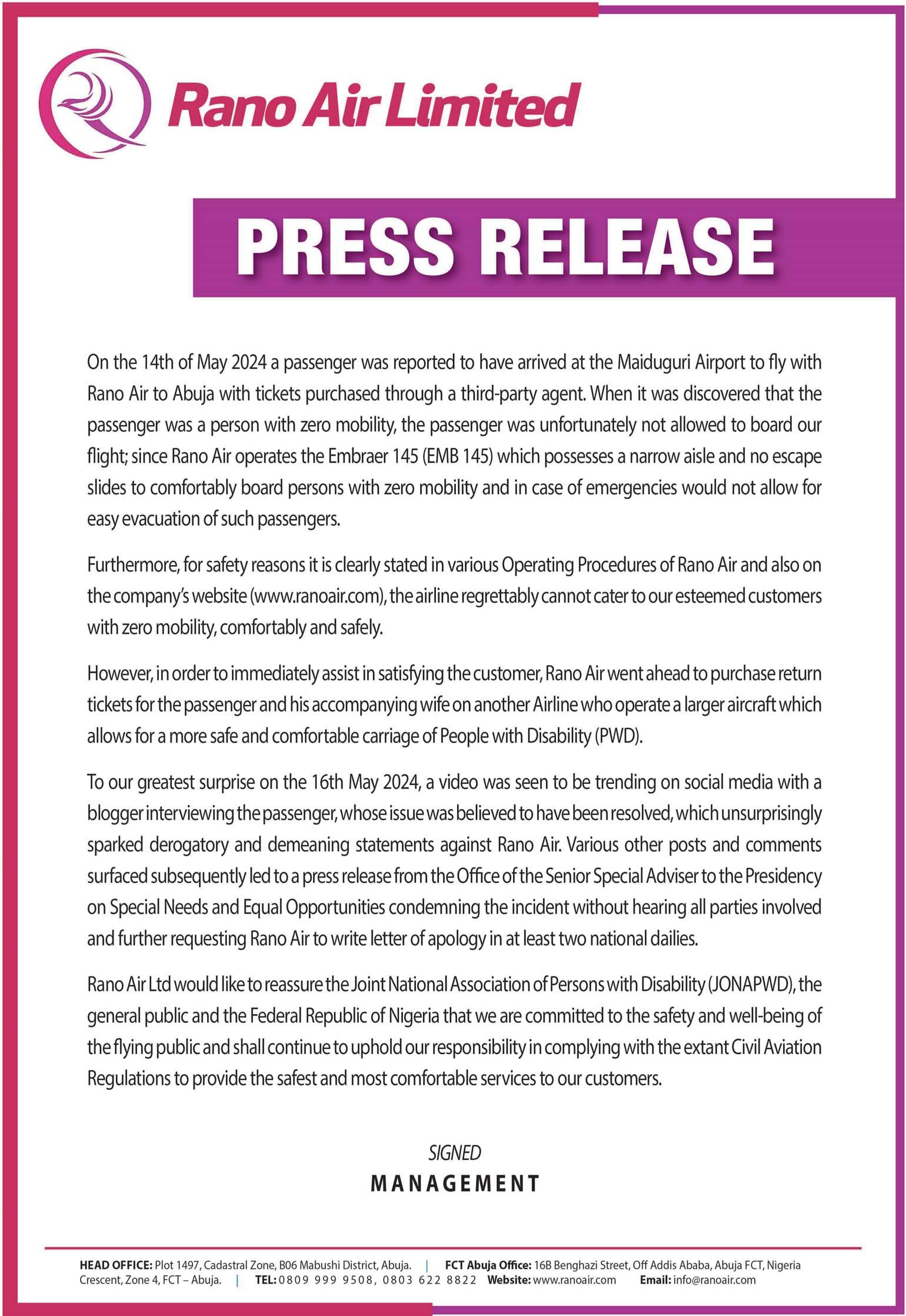

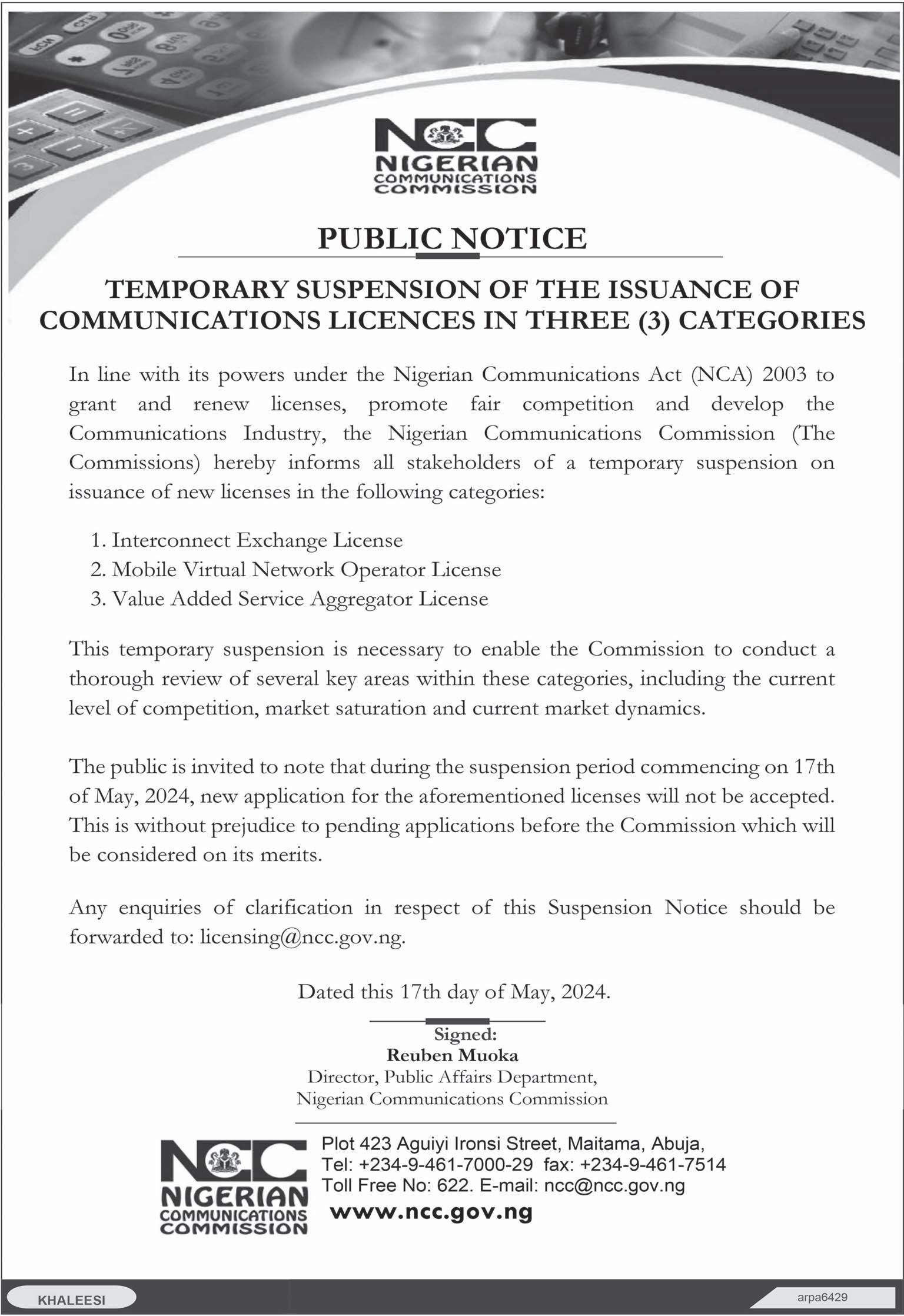
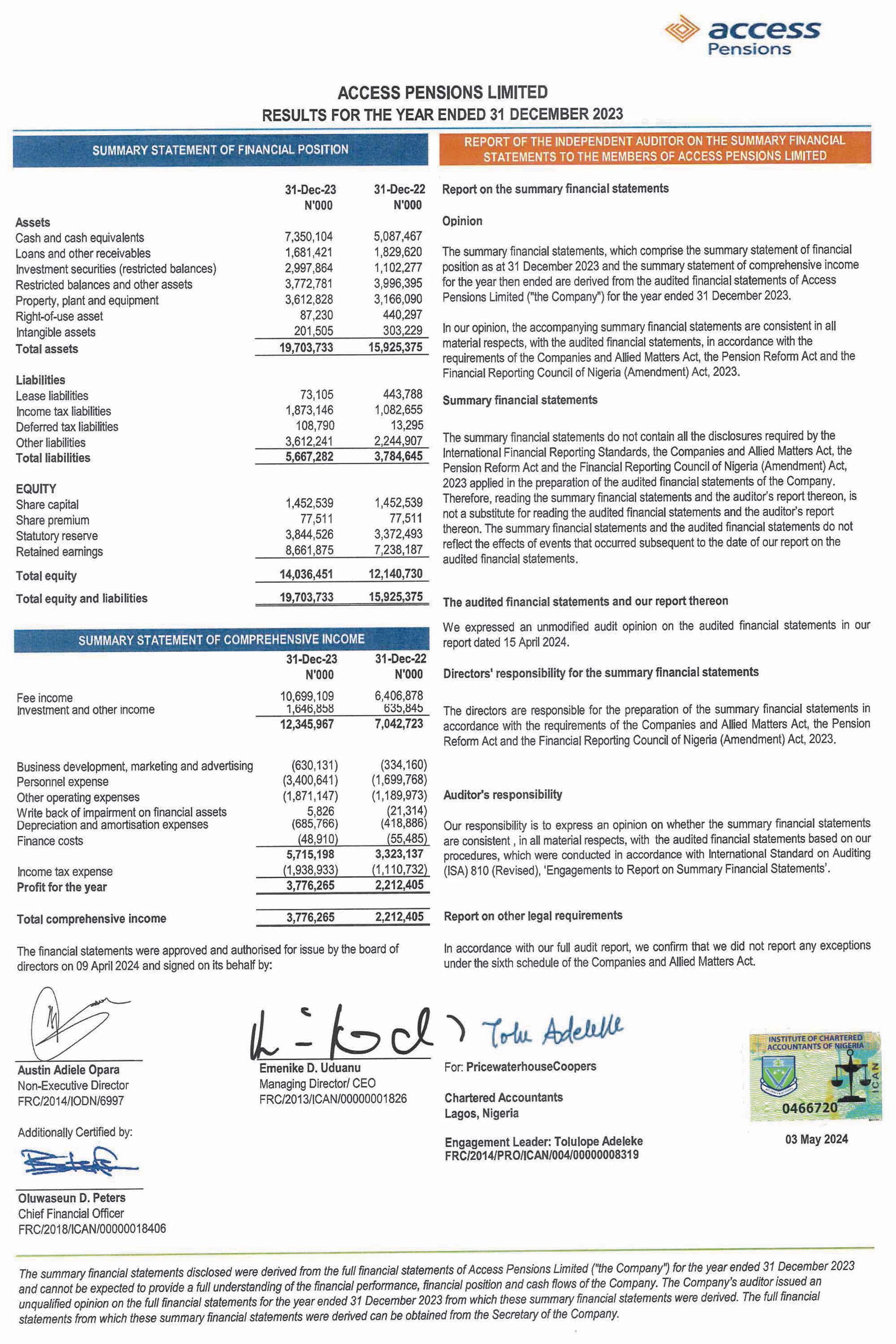
Speakers of the 36 state Houses of Assembly under the aegis of Conference of Speakers of State Legislatures of Nigeria as well as Civil Society Organisations have thrown their weight behind the agitation for the creation of State Police. Sunday Aborisade reports.
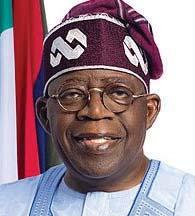


The 36 state houses of assembly in Nigeria recently threw their weight behind the agitation for the creation of state police.
They argued that it was the best way to tackle insecurity in Nigeria. They made the call in a communique issued at the end of their meeting in Abuja. The communique was signed by their Chairman, Rt Hon Adebo Ogundoyin.
The speakers pledged their support for the creation of state police if included as part of the constitution review.
Part of the Communique read: “The Conference strongly advocates for state policing to check the negative trend of insecurity in our country.
“To achieve this, the Conference appeals to the National Assembly, Presidency and other relevant stakeholders to leverage on the ongoing constitution review exercise.
“The Conference observed that in spite of the constitutional provisions that grant Financial Autonomy to the State Legislature, the implementation has been observed in breach. We therefore, call on all the relevant stakeholders to comply with all the provisions in the Constitution and not by breach.”
President Bola Tinubu, had on Thursday, February 15, 2024, met with state governors in Abuja during which they considered “the possibility of setting up state police.
Details of the meeting were disclosed by Information Minister Mohammed Idris who addressed journalists after the meeting.
The Minister had said, “Now, there is also a discussion around the issue of state police.
“The federal government and the state governments are mulling the possibility of setting up state police”.
Idris said attendees at the meeting agreed on the need for state police but more discussions are still needed on how to implement it.
His words, “This is still going to be further discussed. A lot of work has to be done in that direction. Both the federal government and the state governments agree to the necessity of having state police, now this is a significant shift. But like I said, more work needs to be done in that direction.
“A lot of meetings will have to happen between the federal government and the subnationals to see the modalities of achieving state policing.”
Meanwhile, the representative of Kaduna Central Senatorial District in the 8th National Assembly, Senator Shehu Sani, opposed the
establishment of the state Police in a post on his verified X handle following the meeting between Tinubu and the governors.
He explained why he will not support the proposed creation of state police across the country saying having state police may lead to anarchy.
State police, he noted, could be used by governors for election rigging, adding that there would also be recruitment of the state’s ruling party thugs into the force.
Similarly, the Inspector General of Police (IGP) Kayode Egbetokun on 22 April, 2024, registered strong opposition to the proposal for the establishment of state-controlled police forces.
He cited a wide range of challenges and potential risks. The IGP articulated the position of the leadership of the Nigeria Police Force, at a forum organised by the House of Representatives
He asserted that the country was not yet prepared for such a transition
Highlighting the obstacles that currently beset the Nigeria Police Force, the IGP enumerated a series of critical challenges.
Egbetokun raised the concern over inadequate manpower and operational resources essential for effective policing.
He also underscored the scarcity of
essential equipment such as vehicles, arms, ammunition, communication devices, drones, aerial surveillance cameras, security helicopters, and armored vehicles, stressing their pivotal role in maintaining law and order.
Egbetokun expressed concern about the readiness and capacity of personnel, pointing to deficiencies in training programmes as a significant area of concern.
He said the acknowledgment of institutional shortcomings underscores the need for comprehensive reforms within the Nigeria Police Force to enhance its capabilities and efficiency.
In addition to operational challenges, the IGP raised substantive issues regarding the potential ramifications of implementing statecontrolled police forces.
He cautioned against the likelihood of conflicts of jurisdiction arising from overlapping authorities between federal and state law enforcement agencies.
Egbetokun expressed apprehension about the susceptibility of state police forces to abuse by state governors, highlighting the risks inherent in entrusting localized law enforcement powers without adequate checks and balances.
Also, the Minister of Budget and Economic Planning, Atiku Bagudu, penultimate week, said his opposition to state policing in Nigeria has not changed.
He nevertheless conceded to the stance of President Tinubu who is promoting state policing.
The Conference strongly advocates for state policing to check the negative trend of insecurity in our country. To achieve this, the Conference appeals to the National Assembly, Presidency and other relevant stakeholders to leverage on the ongoing constitution review exercise. The Conference observed that in spite of the constitutional provisions that grant Financial Autonomy to the State Legislature, the implementation has been observed in breach. We therefore, call on all the relevant stakeholders to comply with all the provisions in the Constitution and not by breach.
In 2012, Bagudu, then a senator, said Nigeria was not ready to operate state police. His main argument, similar to that of many critics of the proposal, was that it would be abused by state governors, many of whom have shown the penchant to be intolerant of criticism. However, some security experts and Civil Society Organisations (CSOs) have applauded the backing of the creation of State Police by 36 State Assembly Speakers.
The security experts and CSOs in separate interviews with THISDAY, argued that creation of State Police would go a long way to address some of the country’s security challenges.
Commenting on the development, Major General Obashina Ogunbiyi (rtd), noted that it was a good step in the right direction.
He said: “I think it is a good step in the right direction because the people have been clamouring for that and in terms of aiding the security of the community, this is very important.
“If parts of the community are recruited as policemen, it would go a long way in improving the security architecture of the state. This is because they are more familiar with people in the community and know who is who. It will aid in the dispensation of security for each state.
On the fear of abuse, he reiterated that State Governors need to think more about the security and safety of their state which is far bigger than politics, if the state police must achieve its purpose.
According to Ogunbiyi: “If we have honest leadership at the State level, that should not pose a challenge as such. But the advantages override the disadvantages.”
Also speaking on the matter, ex-Comptroller, Nigeria Immigration Service (NIS), Zone A, Lagos State Border Patrol Command, Chukwuemeka Obua said, “That is the way to go.”
He said, “At this moment in the security architecture of Nigeria, the creation of state policing is imperative, we should have done it yesterday and that’s the way we can get a high level of security.
“You bring in somebody who doesn’t understand the language, culture and nitty-gritty of his environment he won’t be able to even source for intelligence.
“If the people are speaking a language he doesn’t even understand, how will he know what they are talking about for him to be able to source for intelligence?
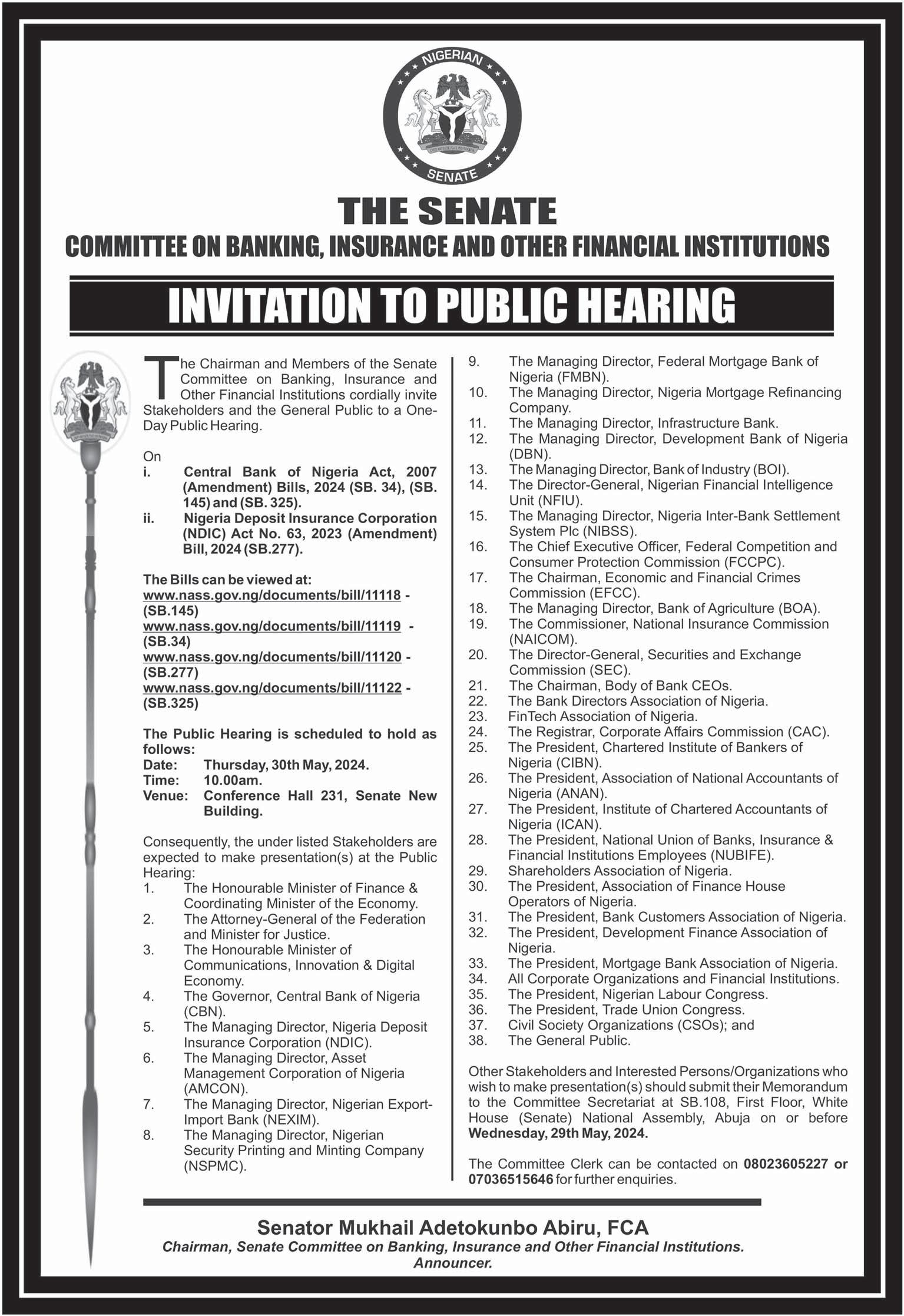


www.thisdaylive.com
TINUBU'S BIG BETS ON GAS
The administration is committed to the development of gas infrastructure to enhance energy supply to boost industrial growth, writes ABDULAZIZ ABDULAZIZ

See page 21
JUDGES AND POLITICAL MATING GAMES CHIDI ANSELM ODINKALU deplores the manner of appointments in the judiciary

See page 21
EDITORIAL
THE CHALLENGE OF UNIVERSAL HEALTH COVERAGE

opinion@thisdaylive.com
AI provides immediate feedback and personalised guidance, but it lacks the emotional inte lligence, creativity, and ethical judgment that define effective human leadership., argues LINUS OKORIE
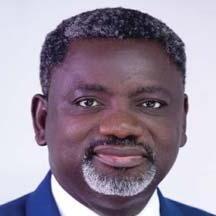
Does the prominence of artificial intelligence foretell a leadership crisis, or is it a catalyst for redefining the very essence of what it means to lead?
The 21st century has ushered in an era characterized by realities like rapid technological advancements, globalization, individualism and diversity. Leaders must navigate the fine line between leveraging technology as a powerful asset and avoiding its pitfalls as a time-consuming distraction. Leaders must master the effective use of technology to remain agile and relevant in a fastpaced world. Artificial intelligence, data analytics, and digital communication tools are not just tools but enablers that, when used effectively, can drive innovation and organizational success.
Artificial Intelligence (AI) has emerged as one of the most transformative technologies of our time. Its rapid evolution and integration into various aspects of our lives have led to discussions and debates about its dominance. In this article, we will explore the concept of AI domination and humancentred leadership.
The rise of artificial intelligence. Is it a signal of the impending robot apocalypse or just another excuse for humans to panic about something they don’t understand?
Artificial intelligence (AI) has the potential to bring about significant changes in society and transform various sectors. AI can be used to improve efficiency and productivity in various industries, such as healthcare, finance, and transportation. For example, in the healthcare sector, AI can be used to analyze medical data and assist doctors in making more accurate diagnoses and treatment recommendations. It can also be used to monitor patient health and alert healthcare providers to potential problems.
Despite all of this, possible scenarios include replacement of the entire human workforce due to automation, takeover by AI, and the popular notion of a robot uprising. Some public figures, such as Stephen Hawking and Elon Musk, have even advocated research into precautionary measures to ensure future superintelligent machines remain under human control. Harvard Business Review conducted a survey of more than 600 employees across multiple industries. The result indicated that these employees have more confidence in AI than in their human bosses in certain areas of leadership.
Towards the end of 2022, the world was thrown into an agitation when OpenAI, a US-based AI firm, released a revolutionary solution called “ChatGPT” which could converse, reply to text messages sent by humans and answer almost any question with minimal error as if it were human itself and all-knowing. This solution that is likened to be an advanced search engine are useful tools in the workplace. This is used to write news articles, public speeches, academic papers, computer codes and can go as far as analyzing vast amounts of data and identifying patterns more accurately than any human being.
With AI, you can reduce or eliminate the bias that come with a leader’s mental state, background, and personal relationships/preferences, which positions AI to excel in the areas of planning, strategy and

decision-making. AI can also be more consistent and less variable than humans, which is beneficial in certain areas of leadership like performing repetitive tasks, making them more efficient and cost effective. For example, in the manufacturing sector, robots and automation can perform tasks like welding, assembly, and packaging. Similarly, AI-powered chatbots can handle customer inquiries, reducing the need for human customer service representatives. AI can also offer employees more personalized, immediate feedback on their performance. AI can analyze an employee’s strengths and areas of improvement and offer guidance, training, or other resources to help them grow.
As organizations navigate the complexities of the modern world, the truth remains steadfast – the best leaders cannot be replaced by AI. Humans may be imperfect but authentic. On the flip side, AI may be faster but robotic. This knowledge helps us all to agree that while AI can provide immediate feedback and personalized guidance, it lacks the emotional intelligence, creativity, and ethical judgment that define effective human leadership.
Human-centered leadership places people at the core of decision-making processes, acknowledging the unique strengths and capabilities that humans bring to the table. This leadership approach is not about resisting technological change but embracing it while maintaining a steadfast commitment to the wellbeing and development of individuals within the organization.
One of the cornerstones of human-centered leadership is emotional intelligence, a trait deeply ingrained in human nature. The ability to understand, connect, and empathize with others is an important skill that goes beyond the capabilities of AI. Leaders who can navigate the intricacies of human emotions foster a positive organizational culture and build strong, resilient teams.
While AI excels at processing data and performing specific tasks, it lacks the capacity for visionary thinking and creativity inherent in human leaders. The best leaders possess the ability to envision the future, think strategically, and innovate in ways that go beyond the algorithmic capabilities of AI. Creative problem-solving and the ability to adapt to dynamic environments are hallmarks of human leadership.
Leadership often requires making decisions in ambiguous and rapidly changing situations. The best leaders exhibit a remarkable capacity for adaptive
decision-making, drawing on intuition, experience, and a deep understanding of context. Unlike AI, which relies on pre-programmed algorithms, human leaders can navigate uncertainties and make decisions based on a comprehensive understanding of the nuances involved.
Leadership involves more than just directing tasks; it entails inspiring and motivating teams to achieve their full potential. The interpersonal skills of effective leaders, such as communication, encouragement, and fostering a sense of purpose, are deeply rooted in human connections. AI lacks the emotional resonance to truly inspire and motivate individuals toward a shared vision.
Moreover, in the course of playing their role, leaders often face complex ethical dilemmas that require nuanced judgment and moral reasoning. Human leaders bring a moral compass to their decision-making, considering the impact on individuals, society, and the long-term well-being of the organization. This ethical dimension is a crucial aspect of leadership that transcends the capabilities of AI, which lacks inherent values and a sense of morality.
The truth remains that employees still want to be led by fellow humans, not technology. Humancentered leadership involves uplifting others while harnessing the tremendous benefits of technological advancements. This delicate balance fosters collaboration, propelling businesses toward collective success. In the world of AI, humancentered leadership emerges as the beacon guiding organizations through the complex interplay between technology and humanity. Through the promotion of collaboration, prioritization of emotional intelligence, empowerment of employees, and conscientious navigation of ethical considerations, leaders shape a future where AI enhances, rather than diminishes, the human experience in the workplace. The embrace of human-centered leadership ensures a symbiotic relationship between humans and AI, fostering a harmonious and innovative environment that propels organizations towards unparalleled success in the digital age.
MFR is a leadership development expert spanning 30 years in the research, teaching and coaching of leadership in Africa and across the world. He is the CEO of the GOTNI Leadership Centre.
 Editor, Editorial Page PETER ISHAKA
Email peter.ishaka@thisdaylive.com
Editor, Editorial Page PETER ISHAKA
Email peter.ishaka@thisdaylive.com
The states, local governments, as well as private sector organisations should be enlisted in the scheme
During the Universal Health Coverage (UHC) Day Walk last December, the Coordinating Minister of Health and Social Welfare, Mohammed Pate promised to expand the quality of healthcare services that Nigerians access through the primary healthcare systems and hospitals. “We expect that states will complement with the participation of every stakeholder, to ensure that the society is healthier,” Pate said at the occasion. “This action requires that everyone has access to the minister must move from rhetoric to action on this issue if he is to make any meaningful impact.
Like Nigeria, most of the countries that have made appreciable progress in achieving UHC have also implemented some form of comprehensive government-led health
Unfortunately, despite a reform of the sector in our country and the law already put in place, majority of the population are not covered by any health insurance schemes. That is perhaps because the scheme is driven by the executive at the federal level rather than by the three tiers of government and the private sector. Many of the states and local governments are yet to come on board. For the health of our people, it is important that critical stakeholders begin to address this challenge.

The idea of cashless treatment for those insured makes it imperative for them to get immediate treatment during sudden ill-health
T H I S D AY
EDITOR SHAKA MOMODU
DEPUTY EDITOR WALE OLALEYE
MANAGING DIRECTOR ENIOLA BELLO
DEPUTY MANAGING DIRECTOR ISRAEL IWEGBU
CHAIRMAN EDITORIAL BOARD OLUSEGUN ADENIYI
EDITOR NATION’S CAPITAL IYOBOSA UWUGIAREN THE OMBUDSMAN KAYODE KOMOLAFE
In Nigeria today, hundreds of thousands of citizens die on account of lack of access to quality healthcare which a functional health insurance scheme could have guaranteed at all levels. Admitted that guaranteeing health insurance for the society, we National Health Insurance Scheme (NHIS) is the system-wide inequalities in its implementation for the healthcare needs of most Nigerians.
Ordinarily, the main goal of the NHIS is “to facilitate
EDITOR-IN-CHIEF/CHAIRMAN NDUKA OBAIGBENA
GROUP EXECUTIVE DIRECTORS ENIOLA BELLO, KAYODE KOMOLAFE, ISRAEL IWEGBU, EMMANUEL EFENI
DIVISIONAL DIRECTORS SHAKA MOMODU, PETER IWEGBU, ANTHONY OGEDENGBE
DEPUTY DIVISIONAL DIRECTOR OJOGUN VICTOR DANBOYI
SNR. ASSOCIATE DIRECTOR ERIC OJEH
ASSOCIATE DIRECTOR PATRICK EIMIUHI
CONTROLLERS ABIMBOLA TAIWO, UCHENNA DIBIAGWU, NDUKA MOSERI
DIRECTOR, PRINTING PRODUCTION CHUKS ONWUDINJO
TO SEND EMAIL: first name.surname@thisdaylive.com
com along with photograph, email address and phone numbers of the writer.
sharing for people, against high cost of healthcare, through various pre-payment programmes prior to practice cannot guarantee proactive protection for the country’s sick population. The fact that other federating units outside the federal government do not participate in the NHIS makes it somewhat governments, as well as private sector organisations enlisted in the scheme should therefore be a priority. Indeed, as it stands with the NHIS, only a small proportion of Nigerians have prepaid healthcare, and this is not right if we must lead or keep a healthy population. To therefore achieve the UHC which the country has signed on to, we are of the strong view that strengthening and adopting a comprehensive social health insurance scheme would have to happen and quickly too. We also believe that reforming the country’s healthcare
of a social health insurance in Nigeria would also be strengthened with the inclusion of 36 states into the scheme and getting them to set up and manage their own insurance schemes in line with the provisions of a reviewed NHIS.
works in a country like ours are many. One, the idea of cashless treatment for those insured makes it imperative for them to get immediate treatment during sudden ill-health while the premium paid on health insurance is usually tax deductible. It is therefore important for Pate to work with all the stakeholders in the health sectors and authorities in the states on this issue. Until we can extend health insurance to all citizens, the country’s push for UHC will be a mirage.
]The recent appointment of Mallam Isa Yuguda as the Chairman of the Governing Council of the National Open University of Nigeria (NOUN) has sparked hope for a new era of growth and excellence at the institution. As a former minister and governor, Yuguda brings a wealth of experience to the table, which will be crucial in shaping the future of NOUN.lenges. NOUN has struggled with issues of funding, infrastructure, and quality of education, which have hindered its ability to reach its full potential.
One of the primary challenges is the need to improve the university's infrastructure, including its virtual learning platform, to enhance the learning experience for students. Another challenge is addressing the issue of funding, which has been a perennial problem for NOUN. The new leadership must ex-
plore innovative ways to secure sustainable funding to support the university's programs and initiatives.
The quality of education is also a critical area that requires attention. NOUN must ensure that its programs meet the highest standards of academic excellence, and that its graduates are competitive in the job market.
Despite these challenges, the prospects for NOUN are bright. With the right leadership and support, the university has the potential to become a center of academic excellence, providing access to quality education for millions of Nigerians. The new leadership must also focus on building strategic partnerships with local and international organizations to enhance the university's research and innovation capabilities.
Furthermore, NOUN must leverage technology to
expand its reach and improve its services, including online learning platforms and digital resources. It has the potential to play a critical role in addressing Nigeria's development challenges, including poverty, to quality education, NOUN can help build a more skilled and competitive workforce, which is essential for driving economic growth and development. challenges, but the prospects for growth and excellence are bright. With the right vision, leadership, and support, NOUN can become a beacon of hope for millions of Nigerians, providing access to quality education and driving national development.
Mukhtar Jarmajo, Wuse 2, Abuja
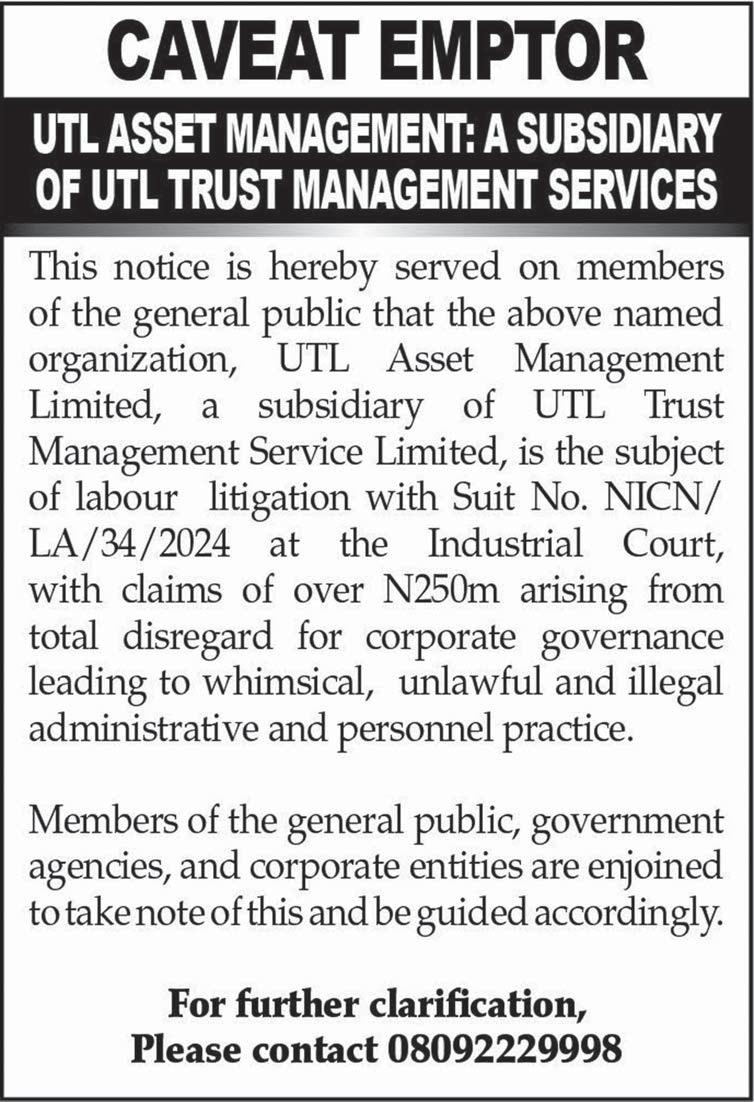
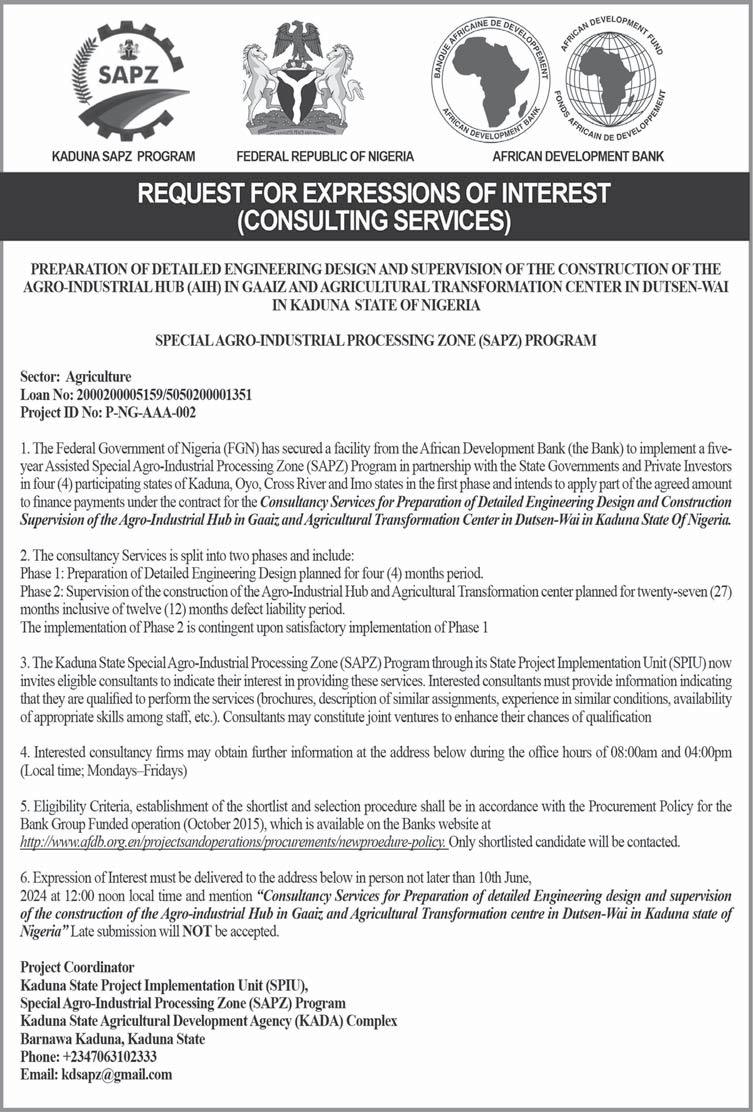
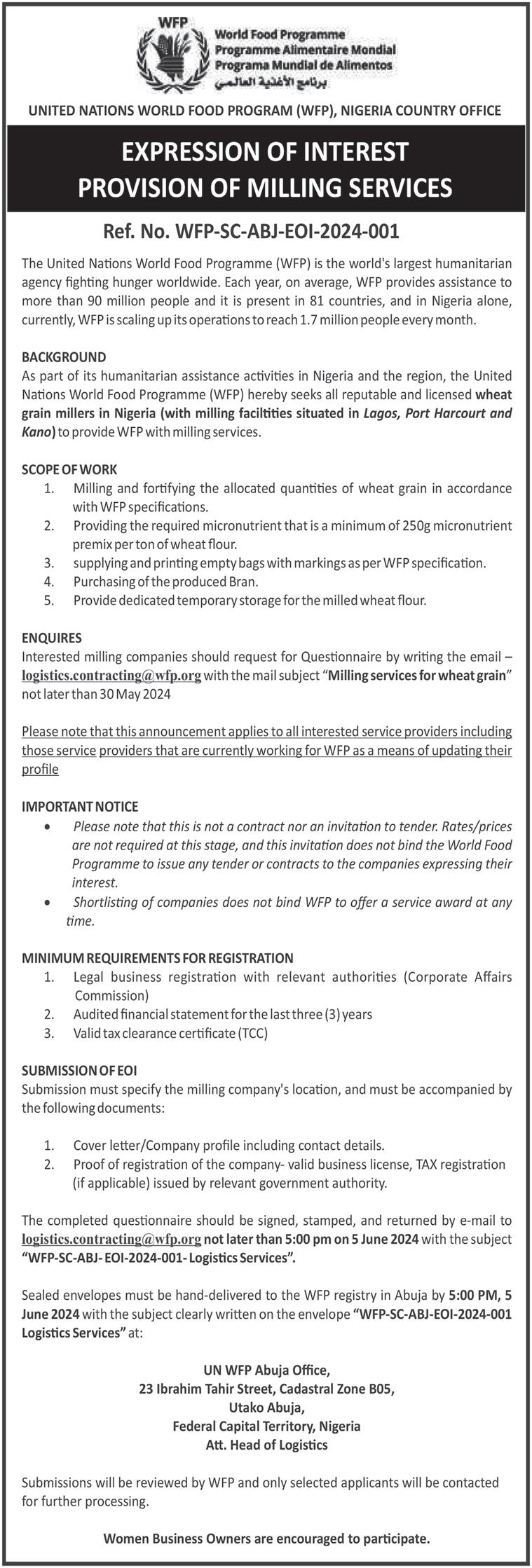
 Kayode Tokede
Kayode Tokede
Since the Central Bank of Nigeria (CBN) announced the banking sector recapitulation exercise, March 28, 2024, investors who invested in banking stocks have lost a whooping N1.85trillion in market value, THSDAY can report.
Despite reporting impressive results for the full year ended December 31, 2023 and first quarter ended March 31, 2024 (unaudited), the stock prices of Nigerian Banks on the Nigerian Exchange Limited (NGX) have continued to nosedive as investors trade their stocks with caution amid CBN new policy of recapitulation.
Between March 28, 2024 and May, 17, 2024, the NGX Banking Index has emerged as the worst
performing Index, dropping by -11.78 per cent Year-till-Date (YtD), while the index used in measuring the overall market performance (NGX All-Share Index) closed at positive 31.23 per cent YtD. In terms of market value, listed Tier-1 banks recorded significant decline as their stock price continued to dwindle.
THISDAY analysis of trading numbers showed that FBN Holdings, Guaranty Trust Holdings Plc and Zenith Bank Plc have depreciated by a combined N1.19 trillion since the CBN announced recapitalisation exercise for Nigerian banks.
As the stock price of FBN Holdings depreciated by 12.6 per cent to close May 17, 2024 at N22.95, its market value fell by N452.28 billion. The old financial institution had
cancelled plans to raise N300 billion capital amid resignation of Managing Director, First Bank Nigeria Limited, Dr. Adesola Adeduntan.
For GTCO, as its stock price also dropped by 12.60 per cent to N39.90 per share, its market value lost about N370.8billion since the CBN announcement March 28, 2024.
The shareholders of GTCO in May 2024 approved the company’s plan to establish a capital raising programme of $750 million either through public offerings, private placements, rights issues and/or other transaction modes.
In addition, the market value of Zenith Bank went down by N364.2 billion as its stock price dropped by 11.6 per cent to close May 17, 2024 at N32.90 per share from N44.50 per share on March 28, 2024.
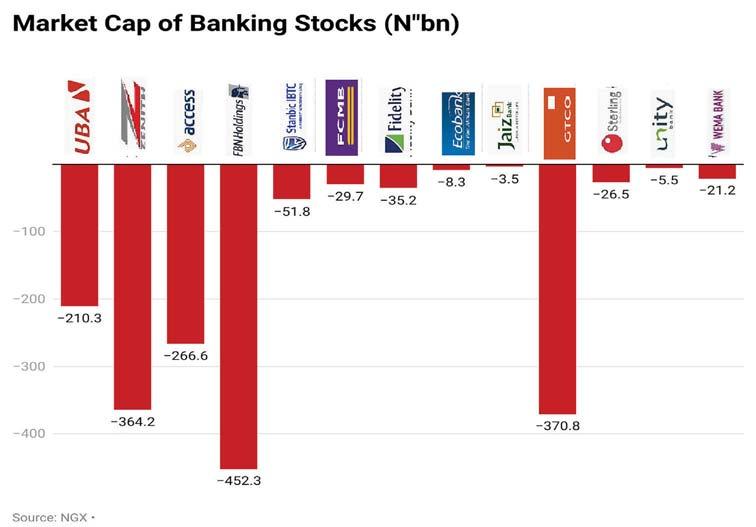
Zenith Bank had revealed that it is taking urgent steps to meet the new N500 billion capitalisation requirement as directed by the CBN.
Other notable banks with significant decline in market value include: Access Holdings, N266.6billion; UBA, N210.3billion and Fidelity Bank Plc, N35.2billion between March 28, 2024 to May 17, 2024.
Analysts have attributed the dwindling banking stocks to panic profit-taking by investors who don’t understand the impact of CBN’s banking sector recapitalisation.
“Banking sector recapitalisation in Nigeria provides a lot of opportunities because these banks are healthy and have a lot of resources. If not CBN removed retained earnings, no banks would need the public
to raise fresh capital.
“All these banks have robust retained earnings. CBN is looking for another means to mop-up liquidity in the system and of course, they wanted the banks to be aggressive in mop-up of money in the system using right issues, among other means.
“Banks like Zenith Bank, UBA, GTCO, FBN Holdings and Access Holdings have strong retained earnings which the CBN does not want them to utilise,” said Chief Operating Officer of InvestData Consulting Limited, Mr. Ambrose Omordion
He however, urged investors to buy these banks stocks as they are currently trading at a lower price.
He added that, “These banks’ stocks are dropping but it is an
opportunity for investors to take a position. There is no need to panic since the capital market is meant for the long term.”
In 2023, the Governor of the CBN suggested the possibility of raising the minimum capital requirement for banks, despite the sector’s relative stability in recent years.
He noted that the proposed increase is based on the observation that many banks lack sufficient capital to back an economy aiming for a Gross Domestic Product (GDP) of $1 trillion, as targeted by the Federal Government.
Recall that on March 28, 2024, the CBN revised the minimum capital requirements for Banks.
Amid inconsistent sensitisation, a total of 16 listed companies on the Nigerian Exchange Limited (NGX) reported a sum of N96.92billion outstanding unclaimed dividend in 2023, according to investigation by THISDAY.
This is an increase of 10.04 per cent from N88.07billion outstanding unclaimed dividend in 2022.
Unclaimed dividend are dividends paid by a company but are yet to be claimed by shareholders.
The total value of unclaimed
dividends according to Securities and Exchange Commission (SEC) has risen to N190 billion, representing a 7.35 per cent increase from N177 billion recorded in 2021.
THISDAY analysis of the companies’ audited result and accounts for the period ended December 31, 2023 revealed that Zenith Bank Plc, followed by Access Holdings Plc have the highest amount of unclaimed dividend in the banking industry.
According to 2023 audited results, Zenith Bank’s reported N30.12billion unclaimed dividend, representing an increase of 1.18 per
cent from N29.7 billion reported in 2022., while Access Holdings reported N21.4billion unclaimed dividend in 2023, an increase of 15.3 per cent from N18.55billion in 2022.
As United Bank for Africa Plc announced N14.9 billion unclaimed dividend in 2023, about 17.9 per cent from N12.63billion in 2022, Nestle Nigeria announced N7.76 billion unclaimed dividend in 2023, a growth of 2.28 per cent from N7.58billion reported in 2022.
Notable companies with unclaimed dividend around N4 billon include; Guaranty Trust Holdings Plc
(GTCO) with N4.09billion unclaimed dividend in 2023, an increase of 3.4 per cent from N3.95billion in 2022; Dangote Cement with N4.7 billion unclaimed dividend in 2023, a growth of 7 per cent from N4.4 billion in 2022 while Stanbic IBTC Holdings closed 2023 financial year with N4.91billion unclaimed dividend in 2023, representing an increase of 57 per cent from N3.13billion in 2022.
Others: FCMB Group, N2.1 billion; Lafarge Africa N2.07 billion; Transcorp Incorporated, N1.73 billion; Nigerian Breweries Plc, N1.1 billion; Nascon Allied Industries Plc, N725million; BUA Cement
Plc, N714.15million; MTN Nigeria Communication Plc, N381.5milion; Transcorp Hotel Plc, N211.96million and Dangote Sugar Plc, N39.3million unclaimed dividend reported in 2023 financial year.
According to capital market stakeholders, as these companies declared dividend payout in audited results for period ended December 31, 2023, unclaimed dividend in the Nigerian capital market is expected to soar when audited results for period ended December 31, 2024 are released to the investing public. Over the years, the SEC has strived to curb escalating issue of unclaimed
dividends in the capital market, albeit with limited success as the amount continues to rise annually.
The former Director-General SEC, Mr. Lamido Yuguda had launched e-Dividend Mandate Management System (eDMMS), making it easier for investors to mandate their accounts for electronic dividends. Yuguda had in 2023 reiterated that unclaimed Trust Fund established by the government would protect unclaimed dividends in the capital market.
Gilbert Ekugbe
The President, Nigerian-Indonesian Chamber of Commerce and Industry (NICCI), Ishmael Adegorioye Balogun, has stated that trade volume between Nigeria and Indonesia has hit over $6 billion in 2023.
He said this at a press conference to announce the Nigeria-Indonesia Investment and Trade Forum (NIITF) scheduled to be held in Kano.
He said trade between both countries increased from $4.7 billion in 2022 to an estimated $6 billion in 2023.
He, however, stated that the vision of NICCI is to promote bilateral trade and investment between Nigeria and Indonesia.
“In performing this task, we position Nigeria as the No.1 investment destination in Africa.
Currently, Nigeria is Indonesia’s No. 1 trading partner in the continent of Africa with trade
balances of 4.7 Billion USD as at 2022,” he added
He noted that the board and management of NICCI is very intentional in the continuous promotion and engagement between the two counties either through trade forums, trade fairs, bilateral symposiums and deliberations that continues to create opportunities for interactions and negotiations that promotes both countries bilateral trade and investment balances.
“The purpose of this gathering is to inform the Business community on the upcoming 3rd edition of the Nigerian-Indonesian Investment and Trade Forum taking place on June 3rd at the prestigious Abuja Continental Hotel,” he added.
He said the theme for this year’s NIITF is “Indonesia meets Nigeria.. an opportunity for expansion of Bilateral investment and Trade”.
The inaugural edition of NIITF was held in Jakarta, Indonesia
in October 2022. The former Vice President of Nigeria, Prof. Yemi Osinbajo, SAN was our keynote speaker with several top government and private sector-led executives,” he said.
”The 2nd edition was held in Jakarta, Indonesia in October 2023. The executive Governor of Enugu State, His excellency, Dr. Peter Mbah was our keynote speaker with several other high profile delegates from Nigeria and Indonesia.
“This year, we have decided to bring Indonesians to experience Nigeria in its full entirety. To this extent, NICCI has partnered with the Indonesian Embassy in Nigeria under the leadership of the Indonesian ambassador to Nigeria, His excellency, Amb. Dr. Usra Hendra Harahap in collaboration with the Indonesian government through the Ministry of Trade and Foreign Affairs to invite 70 Indonesian companies to Nigeria,” he added.
The Institute of Chartered Accountants of Nigeria (ICAN) and NGX Regulation Limited (NGX RegCo) over the weekend in Lagos, held the maiden corporate reporting award, which recognizes the top 30 most capitalized companies listed on the Nigerian Exchange (NGX) for the 2022 financial reporting year.
The awards underscored both organisation’s shared commitment to fostering transparency, accountability, and international best practices within the private sector. Evaluation criteria included financial reporting, corporate governance, and sustainability reporting.
Speaking at the event, the president of ICAN, Dr. Innocent Okwuosa, commended NGX RegCo for ensuring better disclosures and reporting among listed companies. He noted that corporate reporting had evolved over the years from the time that most of its content focuses on financial reporting to when there emerged the clamour for incorporation of social and environmental disclosures.
In his welcome address, the CEO of NGX RegCo, Mr. Olufemi Shobanjo, highlighted that “without a doubt, transparency is one of the key drivers of any economy. It ensures full disclosure of
information by entities and that such information is easily accessible to members of the public to make informed decisions. Over the years, there has been an evolution in the type and quality of information demanded, driven by heightened expectations from investors, decision-makers, and society as a whole.”
He added, “while financial reports remain at the forefront of information required by stakeholders, the concept of Environmental, Social and Governance (ESG) considerations has become an area of increasing interest to both public and private sector stakeholders.”
Consul General of the People’s Republic of China in Lagos, Ms. Yan Yuqing, has called for the extension of China-Nigeria bridge for the benefit of the people with pragmatic cooperation.
This, Yuqing said, would further strengthen economic and trade relations, facilitate bilateral trade, promote bilateral investment to boost Nigeria’s economy and industrial upgrading.
The Consul-General made these
assertions at the launching of the First Lagos Forum held in the Nigerian Institute of International Affairs (NIIA).
Speaking on the theme, “Reviewing the History, Embracing the Future,” Yuqing stated that the China-Nigeria bridge would strengthen scientific and technological cooperation that will promote infrastructure construction and the use of new energy sources to achieve sustainable development in Nigeria.
She added, “We should widen the China-Nigeria bridge with people-to-people exchange. We will continue to support Chinese culture being brought into Nigeria and encourage Nigeria’s Afrobeat,
Group Business Editor
Eromosele Abiodun
Deputy Business Editor
Chinedu Eze
Comms/e-Business Editor
Emma Okonji
Asst. Editor, Money Market
Nume Ekeghe
Senior Correspondent
Raheem Akingbolu (Advertising)
Correspondents
Emmanuel Addeh (Energy)
KayodeTokede(CapitalMarkets)
James Emejo (Finance)
Ebere Nwoji (Insurance)
Reporters
Peter Uzoho (Energy)
Ugo Aliogo (Development)

…Consumer pension assets, data and privacy protected
As previously reported, the National Pension Commission (PenCom) issued a Consumer Protection Framework for Nigeria’s pension industry, outlining pension consumer rights and responsibilities. The framework specifies the responsible business conduct of Pension Fund Operators (PFOs), as well as dispute resolution and enforcement mechanisms.
In this publication, we discuss the framework’s key highlights, focusing on the protection of consumer pension assets, data, and privacy. The framework mandates robust data protection measures, promotes healthy competition, and enforces ethical advertising practices within the pension industry.
This comprehensive approach aims to foster a transparent, secure, and consumerfriendly environment, empowering consumers to make informed decisions about their retirement savings.
consumers’ data are securely stored and accessed only by authorised personnel. Periodic audits of control systems are required to ensure their adequacy and effectiveness in preventing breaches. When engaging with third-party agents, PFOs prioritise the safety and security of consumers’ data, allowing the use of consumer data solely for the specific requested purpose.
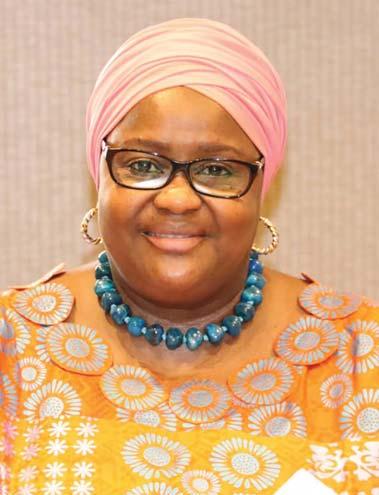
the Yoruba-Igbo-Hausa three major ethnic dances and Nigerian cuisines to be brought into China. We encourage more Chinese students to come and study in Nigeria, and we hope that more Nigerian students will be able to cross the mountains and seas to learn about a real China through the Chinese Bridge project.
“We support Chinese enterprises and Chinese community in Nigeria to carry out charities and give back to the society. The charity program “Renewed Hope, Rebirth from the Light” financing cataract patients in Nigeria, initiated by me, is a case in point. The friendship makes the bridge between China and Nigeria wider.”
The Managing Director, PalmPay Nigeria, Mr. Chika Nwosu has said the on-going intervention process of the federal government on the activities of Fintechs in Nigeria, will further strengthen the Fintech ecosystem and boost customers’ trust for digital transactions across platforms.
Nwosu who said this during an interview on a local television station, explained that the directive of the federal government, which restricted Fintechs from on-boarding new customers, would make the Fintechs to re-strategise and come up stronger in a manner that would boost customers’ trust.
According to Nwosu, “Nigerian customers have nothing to be afraid
of concerning the government’s intervention because there are no issues. The truth is that Fintechs in Nigeria have grown so large within a short space of time and the government and the regulators felt that the time to address key issues with Fintechs is now, for the benefit of the fast growing Fintechs, their customers and the Nigerian economy.
“We have had several meetings with different government agencies like the Office of the National Security Adviser (ONSA), Economic and Financial Crimes Commission (EFCC) and the Central Bank of Nigeria (CBN). We have also had meetings among the Fintech players and the essence of all these meetings is to ensure better service delivery that will benefit customers and the Nigerian economy.
The separation of management and custody of pension funds between Pension Fund Administrators (PFAs) and Pension Fund Custodians (PFCs) ensures that consumers’ pension funds are safeguarded. All PFAs must comply with the regulation on Investment of Pension Fund Assets issued by PenCom, which is periodically updated to minimise investment risk exposure.
Consumers’ pension and personal information are protected by PFOs. This is not released to third parties without the consumer’s consent, except as required by relevant laws. In terms of data usage consent, PFOs are obligated to maintain the confidentiality of consumers’ personal information and ensure data privacy and security. They must obtain prior consent from Retirement Savings Account (RSA) holders before using their information for promotional offers via email, SMS, phone calls, and other channels. Furthermore, PFOs must ensure the privacy and security of consumers’ data when requests are made by third parties, including government agencies.
Appropriate data protection safeguards and security measures, including employee training, must be in place to prevent unauthorised access, alteration, disclosure, accidental loss, or destruction of consumers’ data. To ensure data security and access control, PFOs must implement policies and controls to protect consumers against fraud. These policies include the use of robust software and transaction monitoring systems. For example, segregation of duties ensures that no single individual can both initiate and complete a transaction. PFAs have established access control systems to restrict and monitor access to consumer databases, ensuring that
Promoting competitive markets is essential to providing consumers with a wide range of choices among PFAs and encouraging the offering of diverse pension-related products within the boundaries set by the Pension Reform Act (PRA) 2014. This approach fosters innovation and helps drive high service quality within the pension industry. Consequently, consumers should be able to search, compare, and switch between products and service providers to make informed decisions that best suit their needs.
Pension consumers have the option to move their RSAs from one PFA to another, choose a mode of withdrawing retirement benefits, and select their preferred investment fund within the scope of the PRA 2014. Encouraging a free-market environment is vital for effective service delivery. Therefore, PFOs are required to promote healthy competition while refraining from unethical and de-marketing practices, ensuring fair and beneficial outcomes for all consumers. Engaging in practices that tarnish the image or services of competitors is strictly prohibited.
For fair play, PenCom ensures that PFO advertisements align with approved product features. Advertisements must not mislead, misrepresent, or exaggerate the benefits of products and services. All advertisements should disclose full information about the products and services being advertised in clear and explicit language. When promotional materials refer to rates of return, PFOs must indicate all applicable charges and state the features of the products/ services.
In conclusion, the Consumer Protection Framework plays a crucial role in safeguarding consumer pension assets, data, and privacy. By enforcing strict regulations on PFOs regarding the management, investment, and confidentiality of pension funds and personal data, PenCom ensures that consumers’ interests are prioritised and protected. In Part 4, we will conclude our presentation on the key highlights of the Consumer Protection Framework.
In Nigeria today, Takaful insurance is a new model that is gradually penetrating the risk underwriting market with futuristic products and services, as the promoters remain innovative in their brand development strategies. In this interview with Kayode Tokede, the Managing Director/CEO of Crown Takaful Insurance Limited, Nasir Abubakar Song, shares his thoughts about the industry and what his company is out to offer to prove to the uninsured that Crown Takaful insurance holds immense benefits to them come rain or shine. Excerpts:
Can you give an overview of the performance of the Nigerian insurance sector over the past decade and its contribution to the nation’s growth?
The Insurance Sector is an important player in the Nigerian Economy, providing vital financial services, promoting economic stability, risk mitigation, capital mobilization, job creation, social security, and contributing to the overall growth and development of the country. On the contribution to economic growth of the nation, the insurance industry recorded more than N1 trillion gross premium for the year 2023 alone. I think this is a commendable feat in the industry.
One of the challenges the industry has contended with over the years is low confidence of the public. What do you think is responsible for?
In the case of Nigeria, several factors have contributed to low public confidence in the insurance sector, this majorly arise from poor perception to lack of trust, low awareness and understanding of insurance, as many Nigerians seem to have limited knowledge about insurance products, how they work and the benefit they offer. This lack of awareness has led to skepticism and reluctance to engage with insurance companies. However, it is worthy to note that the tide is changing because of strategic awareness programmes being initiated by the industry’s regulatory commission and professionals. This has led to a 27per cent growth of industry penetration in the year 2023.
Doubtlessly, the outlook for risk underwriting is getting brighter by the day due to increasing investments across the broad spectrum of the economy. Do you think this holds opportunities for insurers in terms of marketing drive for improved performance?
Yes, this gives the insurance companies

a lot of opportunities to market their products and services to these investors, because insurance is the most dependable financial recovery plan for any investor and, therefore, those investments must be protected.
Non-interest insurance model is very in new in Nigeria. Could you speak on why Crown Takaful Insurance is coming in at this time to champion the cause of ethical risk sharing model for businesses and individuals in the country?
and allow those participants who did not make claim from the Takaful fund to participate in surplus distribution once the portfolio generate profit at the end of Takaful period, which is usually one year from the inception of the policy.
“Crown Takaful Insurance is coming in to play its role in increasing the level of insurance inclusivity in Nigeria by way of providing alternatives risk mitigation financial services to businesses and individuals. The low level of insurance penetration in Nigeria is not good for a developing economy. That is why Takaful Insurance Companies will play a significant role in bringing the uninsured Nigerians into the Insurance sector.”
“Our products are designed to give participants the protection they need and allow those participants who did not make claims from the Takaful fund to participate in surplus distribution once the portfolio generates profit at the end of Takaful period, which is usually one year from the inception of the policy.”
Crown Takaful Insurance is coming in to play its role in increasing the level of insurance inclusivity in Nigeria by way of providing alternatives risk mitigation financial services to businesses and individuals. The low level of insurance penetration in Nigeria is not good for a developing economy. That is why Takaful Insurance Companies will play a significant role in bringing the uninsured Nigerians into the Insurance sector.
Critically appraising the insurance landscape, there is still low customer confidence that they can get value for every policy they subscribe to. What is Crown Takaful Insurance bringing to the market that you think will make customers to go for it as a preferred brand?
The Takaful Insurance model is based on mutual protection and shared responsibility among the participants of the Takaful pool. Our products are designed to give participants the protection they need
Crown Takaful Insurance is not just another insurance market entrant but a protection for all from the bike rider to the multinational companies and from the farmer in the rural area to the business tycoons in the city. There is a product tailored to confer excellence. Both Crown Takaful and our participants will be better off taking the Takaful Insurance contract.
Another big challenge in the industry is low awareness about the benefits policy covers for the insured, especially at the grassroots. How prepared is Crown Takaful Insurance Management in bracing the odds and pushing the brand into the frontline of Ethical insurance market?
One of the strategies of reaching out to Nigerians is through intermediaries and partnership with Affinity Groups and Cooperative Associations who will be our field soldiers. They will be in the nook and crannies of the country. They will be trained and equipped with the company’s flyers and products description, which highlights the benefits of every cover before the purchase of any Takaful policy.
Could you share your view on some of the marketing strategies
the management intends to adopt such that within the first year of being in business, many Nigerians can say boldly ‘we know Crown Takaful Insurance will deliver on its promise’? As a management, one of the key marketing and brand positioning strategies we intend to adopt is social media. We really want to create awareness through the social media platforms knowing fully well that young Nigerians and other value-driven professionals and investors explore the social media for innovative products and services and socioeconomic opportunities. In doing this, we will not overlook the Insurance Brokers and other intermediaries in the distribution channel to market our products.
For every industry or sector of the economy, the regulatory regime is very important. What is your view on the current insurance regulatory regime and where, if any, would you like the authorities to thinker with to make the environment more conducive for players, especially for new entrants like you?
National Insurance Commission (NAICOM) has done very well in trying to sanitize the insurance industry and work very hard to ensure the industry’s contribution to GDP improved over the years. I will like the new management of the Commission to encourage new product development and collaborate with other regulators, especially those in the Telecom industry, to resolve current administrative bottlenecks with a view to enabling insurance companies to market their products and services through the various service providers.
The recent N100 billion deal between the Enugu State Government and Pragmatic Palms Limited where the latter will provide finance for 60 per cent of the value of the transaction to revive the long-moribund state-owned United Palm Products Limited is a huge milestone towards Governor Peter Mbah’s effort to revive the state’s dormant assets and re-enact the Michael Okpara’s agriculture and agro-industrialisation revolution, writes Uche Anichukwu .
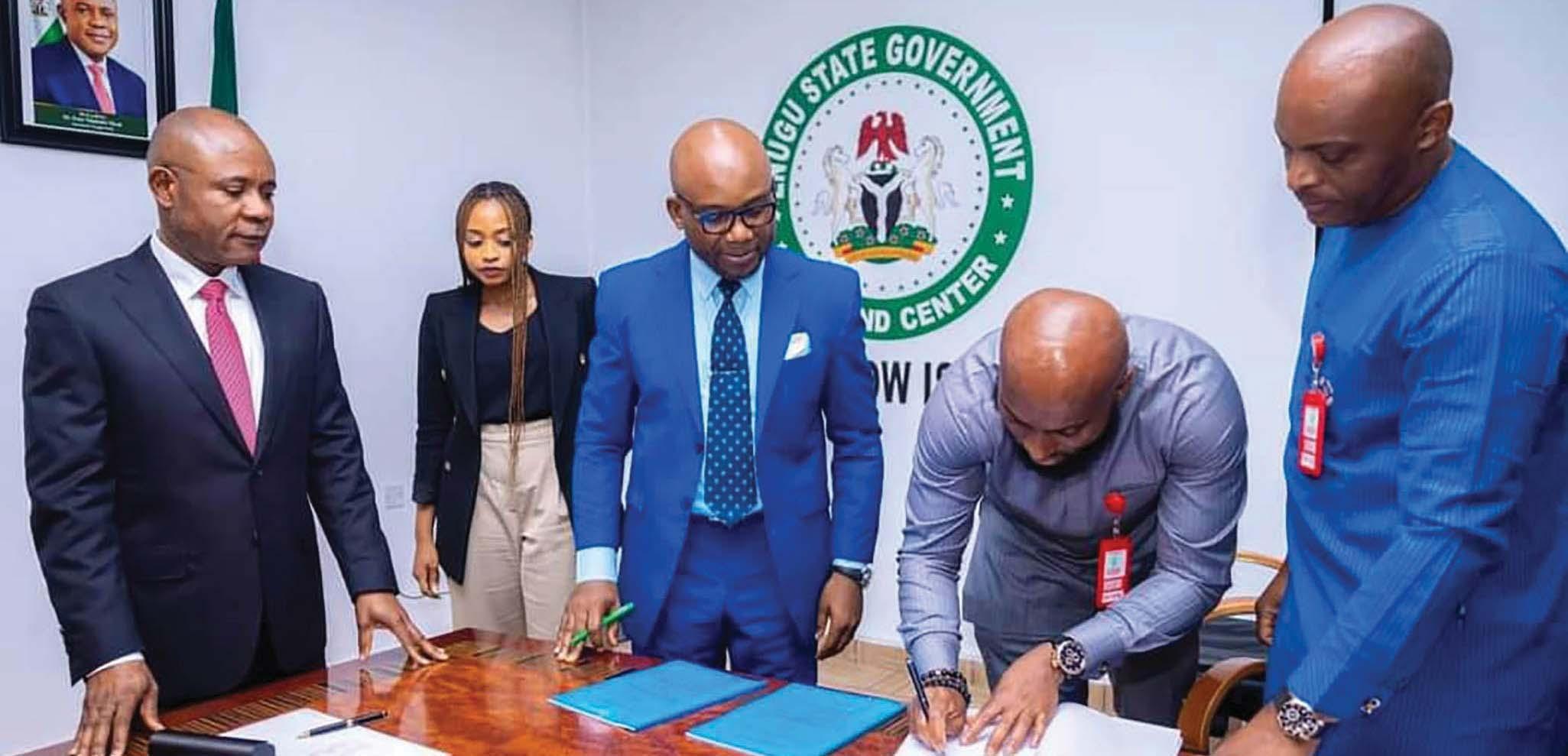
Gov Umba (left) looks on during the signing of the N100billion deal
It is no longer news that the economy of the defunct Eastern Region was rated as the world’s fastest growing and industrialising economy between 1954 and 1964. It was well ahead of the Singaporean, South Korean, Malaysian, and Indonesian economies.
The man at the centre of this phenomenal growth was Michael Okpara, the premier of the region. His driving philosophy was “Pragmatic Socialism”, and the vehicle was largely the Eastern Nigerian Development Corporation.
In a matter of few years, the Michelin Factory, Port Harcourt; NIGERGAS Company, Asbestos Cement Factory, and Niger Steel Company all in Emene, Enugu; the glass factory in Port Harcourt; the Presidential Hotel in Port Harcourt and Enugu; and the Golden Guinea Breweries in Umuahia were all built in a matter of a few years. There were equally the textile industries in the region and a shoe factory in Owerri as well as the Calabar Cement Company and a host of others.
However, at the root of Eastern Region’s economic growth was agriculture, as Okpara established farm settlements/plantations across the region. From Uzo Uwani in the present-day Enugu State to Abak in the present Akwa Ibom State, Ulonna in Abia State, Boki in the Ogoja area of today’s Cross River State, Ohaji (Adapalm) in Imo State, Igbariam in Anambra State; from Amaeke Abam to Ndioji Abam, Ikwu, Ozuitem, Arochukwu, Ubani Ibeku, and the Imo and Niger River deltas, Abakaliki, Obudu, etc., the defunct Eastern Region boasted of sprawling cocoa, rubber, oil palm, banana, cassava, and pineapple plantations and thriving poultry and animal husbandry industry for both local consumption and export.
Unfortunately, decades down the line, all these have virtually disappeared or been sold or abandoned or become moribund. No thanks to largely visionless and profligate successive leaderships, the civil war, and the oil curse that drained leaderships at all levels of the creativity of their First Republic peers and effectively turned the Nigerian system into a feeding bottle federalism. In the abundance of free money that they did not work for, it was only a matter of time before leaders turned their backs on agriculture and agro-industrialisation.
THE UNITED PALM PRODUCTS
One of the victims of such neglect is the United Palm Products Limited, also founded by Okpara and known today as Enugu State United Palm Products Limited, UPPL. It boasts of expansive lands at Ugwuoba in Oji River LGA, Umulokpa in Uzo-Uwani LGA, and Ibite-Olo in Ezeagu
LGA and measures 6,700 hectares of which only 2,000 hectres have been planted after nearly 60 decades.
Yet this is a country that is unable to meet its large palm oil needs and rely on imports mainly from Malaysia. While it is common knowledge that the Malaysian bourgeoning palm oil industry has its roots in Nigeria, the country, ironically, imported 304,043 metric tons (MT) of palm oil from the southeast Asian nation alone in 2023 as against 227,035 MT imported in 2022.
In view of this, it is difficult to fathom why the various palm initiatives of the late Okpara like UPPL were left to rot away. More so when millions of our youths prowl the streets in search of jobs and the states are in dire need of money to fund development. Many local industries are also in serious need of not only palm oil but other derivatives for their production.
It is against this backdrop that the wind of resuscitation of moribund assets blowing through Enugu State since Governor Peter Mbah’s inauguration can best be appreciated.
In his 64-page manifesto ahead of the 2023 governorship election, he promised to revive and transform moribund assets littered across the state to productive assets pursuant to his vision to eradicate poverty from Enugu State and exponentially grow the state’s economy from $4.4billion to $30billion in four to eight years, relying now on private sector investment.
From Hotel Presidential, Enugu, to the International Conference Centre where the administration awarded contracts for their revamping and completions, respectively; from the comatose NIGERGAS Company, Emene, which deal for its resuscitation it is almost concluded to the Aluminum Products Company, Ohebe Dim, etc. the governor is demonstrating the political will to turn things around.
However, the biggest one, not only in Enugu State, but also a massive landmark nationally, is the recently signed N100billion deal between the state and Pragmatic Palms Limited towards bringing United Palm Products Limited, UPPL, one of Okpara’s legacies, back to life.
THE N100 BILLION DEAL
Pragmatic Palms Limited, a Special Purpose Vehicle (SPV) for the partnership will provide finance for 60 per cent of the transaction value, while the Enugu State Government
will provide the plantations valued as 40 per cent equity. In other words, the government is not releasing N100billion or any dime to Pragmatic Palms Limited as mischievously misrepresented. Instead, Pragmatic Palms is funding UPPL’s revival.
Because several parties/investors are involved, it became imperative, as is the best international practice, to register a Special Purpose Vehicle (SPV) as the platform to transact the deal. Although Pragmatic Palms Limited was duly incorporated before the signing of the agreement; the deal would still have been very valid even if it was not incorporated ahead of the deal.
Section 96 (1) of the Companies and Allied Matters Act (CAMA), 2020, provides for pre-incorporation contract. It provides: “Any contract or other transaction purporting to be entered into by the company or by person on behalf of the company prior to its formation may be ratified by the company after its formation and thereupon the company shall become bound by and entitled to the benefit thereof as if it has been in existence at the date of such contract or other transaction and had been a party thereto.”
As demanded by the Enugu State Government, Pragmatic Palms Limited provided a guarantor, which is Diamond Stripes Ltd., a reputable and huge company that has done investments worth over $20billion spanning power and renewable energy sector, port sector, and agricultural sector since 2013. Diamond Stripes Limited is the sole investor in Onitsha River Port and has invested heavily in the agricultural sector where it is the largest owner of silo complexes in Nigeria. It was involved in the acquisition of 600MW Shiroro Hydroelectric Power plant in 2013, concessions of 30MW Gurara Hydroelectric Power Plant in 2019, and establishment of 300MW Shiroro solar power project in 2021.
Apart providing a corporate guarantor in Diamond Stripes, the state’s interest is further secured by the provision of bank guarantors from Pragmatic Palms. Importantly, performance targets and timelines were equally set in the Agreement for Pragmatic Palms Limited failing which the Enugu State Government is free to revoke the deal and reassume total ownership of UPPL. Thanks to Mbah’s experience as an investment finance
expert and an entrepreneur, who has handled multi-billion-dollar projects himself.
In addition, Pragmatic Palm’s Board is structured in a way that the state nominates the chairman of the seven-man board in addition to two members, while its partners will produce the chief executive officer and three board members.
Apart from the pedigree of the mother company, Diamond Stipes, Pragmatic Palm’s Managing Director, Prof. George Nwangwu, who is also the MD/CEO of Diamond Stripes, is a professor of Project Financing Law, who has led transaction teams that have participated in the consummation of over 100 privatisation of Public Private Partnership (PPP) transactions worth over $20 billion across Africa.
Nwangwu was the Head of Infrastructure Finance at the Ministry of Finance under the leadership of Dr. Ngozi Okonjo-Iweala, during which he led the team that delivered the Second Niger Bridge deal.
He has expectedly shown a very clear understanding of what is at stake – revival of one of Dr. Michaël Okpara’s legacies for the benefit of the people of Enugu and Nigeria.
Speaking during the signing of the N100billion deal, he said: “We realised the historical importance of this particular asset. We realised that one of Micheal Okpara’s key projects was the agricultural revolution in the Eastern part of the country and Enugu State is the capital of the Eastern region. His motto then was pragmatic socialism. That was what he used to build most of the palm resources that we had in the Eastern region today. So, we choose that name Pragmatic Palms (the SPV) for a particular reason to tie it to the spirit of what the current administration is the state is trying to do. We know the historical importance and it is a great weight. We realise that we hold this asset in trust for the people of Enugu State and the people of Eastern Nigeria.”
Obviously, with Mbah’s determination and humongous vision, it is a new dawn for not only the United Palm Products Limited, UPPL, but also all dormant, dead and forgotten assets to the benefit of the people of Enugu State after decades of rot and neglect.
It also underscores Mbah’s determination to wean the state from an agelong overreliance on federal handouts the path of wealth creation through innovative governance. This is the only assurance that the state can develop and grow its economy exponentially as promised by the governor.
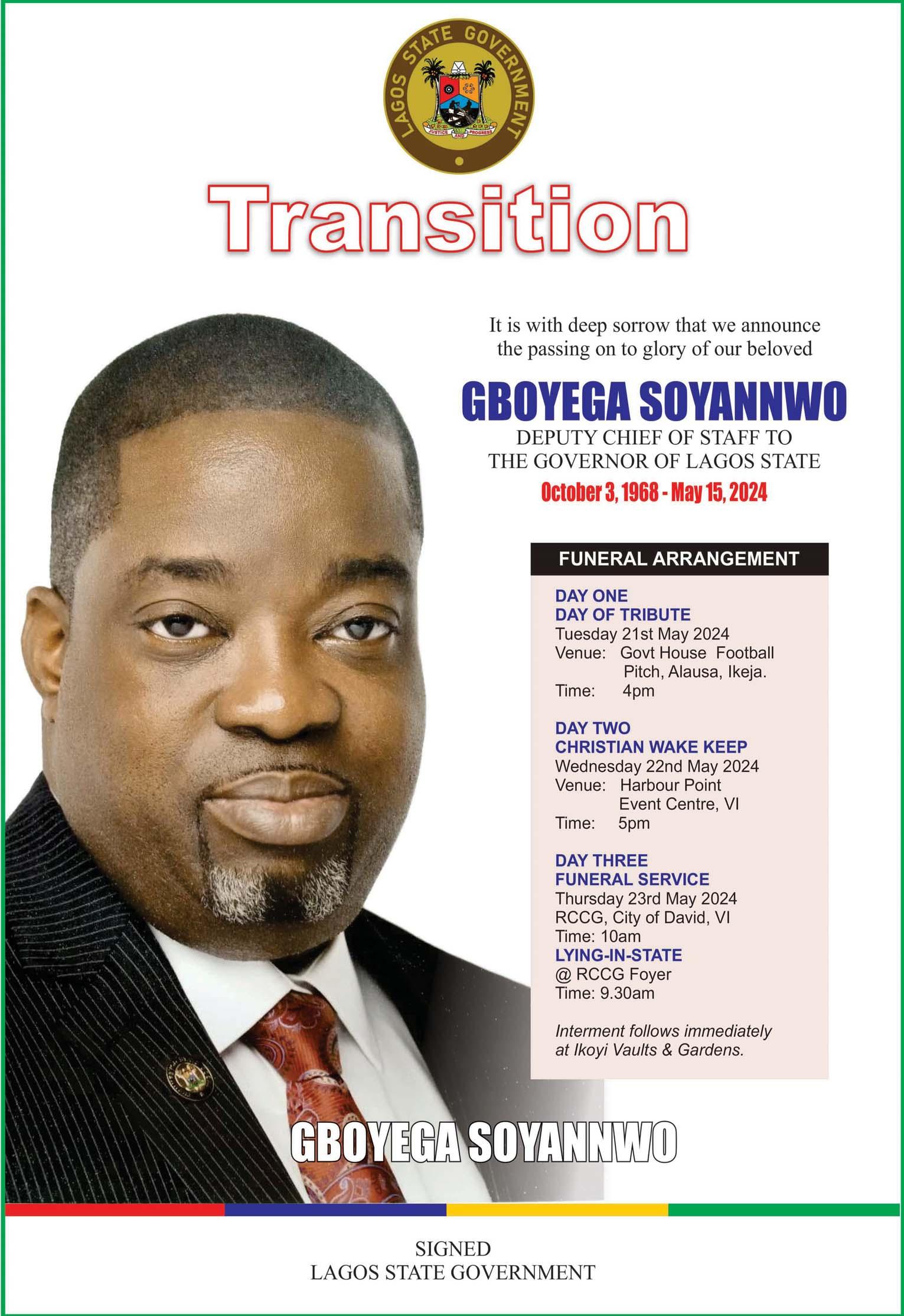
Baobab Nigeria’s Board Chairman, Mr. Rotimi Oyekanmi, has said that the financial service provider for micro, small, and medium-sized enterprises (MSMEs) is ready to expand its reach and unlock new growth opportunities by leveraging its national presence and international expertise.
During a press briefing in Lagos, Oyekanmi highlighted Baobab Nigeria’s commitment to innovation, collaboration, and customer-centricity to drive sustainable development and foster inclusive economic growth across the country.
“As part of the global Baobab Group, we are confident in our ability to navigate challenges and seize opportunities to empower entrepreneurs and build a brighter financial future for all Nigerians,” Oyekanmi said. He emphasised the com-
pany’s dedication to making a meaningful impact on the lives of millions of entrepreneurs in Nigeria and beyond, using the combined strengths of Baobab Group’s international reach and Baobab Nigeria’s local expertise.
Acting Chief Executive Officer, Eric Ntumba noted that since its inception, Baobab Nigeria has disbursed N229.66 billion in loans to support MSMEs, with women receiving about 56.3% of these loans compared to 40.4% for men.
“The company has issued 343,036 loans, with an outstanding loan portfolio of N40.95 billion as of April 2024. Loan amounts range from N1,000,000 to N150 million and above. In 2023, Baobab Nigeria achieved 112% of its loan disbursement target, 124% of its Gross Loan Portfolio (GLP) target, and 117% of its deposit target, “he said.
Board member, Christina
Reifschneider emphasized the company’s commitment to client proximity, with 38 branches across 16 states and Abuja. “We ensure entrepreneurs have easy access to financial services,” she stated. Reifschneider also underscored Baobab Nigeria’s commitment to transparency through its 7-pronged Client Protection Policy, which includes measures like preventing over-indebtedness and ensuring responsible pricing.
Reifschneider reiterated Baobab Nigeria’s dedication to empowering entrepreneurs and driving financial inclusion.
The company’s products and services, such as the MyBaobabApp, Jollof+ Savings App, and Point-Of-Sales machines, have created a niche in the market. This success is supported by robust IT infrastructure, high liquidity, access to funds, and strong, diverse international ownership.
Nigeria’s largest container terminal, APM Terminals Apapa has hosted the maiden edition of its “Exporters Forum”, with a promise to support the federal government’s drive to diversify the economy through the promotion of non-oil exports.
Speaking at the event, the Country Chief Executive Officer of APM Terminals Nigeria, Frederik Klinke, expressed appreciation to the exporters for the role they play in economic growth and advancement.
He said the Exporters Forum was created as an avenue to exchange ideas to eliminate obstacles facing the export business in Nigeria.
He noted that non-oil export remains an important aspect of the Nigerian economy and reiterated APM Terminals’ commitment to ensuring that exporters using the terminal are able to transact their business with little or no obstacles.
He assured the exporters of quick loading and offloading, fast positioning for Customs examination and prompt delivery.
Also speaking at the event, the Commercial Manager of APM Terminals Apapa, Ismaila Badjie said the terminal will continue to explore ways of facilitating non-oil exports at its facilities across Nigeria.
Chief Commercial Officer,
APM Terminals Nigeria, Caroline Aubert-Adewuyi said the terminal was already working with the Nigerian Railway Corporation (NRC) on using the new standard gauge rail line to facilitate the transportation of containers from Moniya, Oyo State to the port. She also expressed APM Terminals’ commitment to the use of barges to move boxes in and out of the port to facilitate both imports and exports, and reduce pressure on the road.
Aubert-Adewuyi assured the exporters of regular interaction. She said the Exporters Forum will be expanded and held bi-annually.
TAJBank Limited, Nigeria’s fastest-growing non-interest banking services provider, has won the Islamic Finance News’ (IFN’s) “Best Islamic Bank in Nigeria 2023”, beating other nominees from across the global geopolitical zones in the competition.
The IFN’s Organizing Committee stated that the award was conferred on TAJBank in recognition of its superior value-adding, world-class products and innovative service delivery to non-interest banking customers globally.
In his acceptance speech, the bank’s Founder/CEO, Mr. Hamid Joda, commended the IFN’s Committee for the global recognition, saying “the Board and management of TAJBank
are grateful for recognizing our bank as an emerging frontline player in the global Islamic banking landscape and my humble self for the IFN Award for 2023.
“As we keep saying, these awards and several others TAJBank had received in the past three years will further encourage us to do more in surpassing the expectations of our growing customers in terms of quality products and service delivery for invaluable value-addition to them and their businesses”, Joda added.
Also commenting on the IFN 2023 awards, the bank’s Co-Founder/Executive Director, Mr. Sherif Idi, lauded “the IFN for the award and our customers for their growing
confidence in TAJBank to deliver superior products and services with, in some cases, personalized touches to confirm to them that our only interest is in them.”
The IFN Organizing Committee commended the TAJBank for hard work, persistence, and innovative strategies that enables the bank to make giant strides despite the whirlwinds in the Nigerian economy.
The selection of winners for the 2023 IFN competition was conducted by the IFN Organizing Committee with support from the Redmoney Group, the foremost global provider of specialized Islamic financial media services across three core divisions of events, publishing, and training.
Visa, a world leader in digital payments, has shortlisted over 20 Fintech startups from across Africa to participate in the second cohort of its Africa Fintech Accelerator programme.
As part of Visa’s work to unlock financial innovation across the continent, the biannual programme offers 12 weeks of mentorship and personalised training, providing seed to series ‘A’ startups with exclusive opportunities to access funding, development, and resources.
Cohort 2 startups operate across 28 African countries, a 55 per cent increase from Cohort 1 where the representatives operated across 18 countries. Among the shortlisted startups for the second cohort, 65 per cent of them feature female leadership, rising from 43 per cent in the inaugural edition.
The selected startups offer a range of solutions, such as neobanking, merchant payments, credit scoring, risk and identity management, embedded finance, social commerce, escrow services, and more. They aim to address

the challenges and opportunities in the African Fintech landscape, such as financial inclusion, access to credit, cross-border payments, and digital transformation.
Vice President and Head of sub-Saharan Africa at Visa, Aida Diarra, said: “At Visa, we believe in uplifting innovation while driving access and inclusion across the financial ecosystem. Today, we are proud to say that participants for our second cohort represents more than 50 per cent of countries across Africa, up from a third during our first cohort.
The Securities and Exchange Commission (SEC) is set to partner with the Chartered Institute of Management Accounting (CIMA) to ensure compliance with reporting on financial statements by public institutions.
Acting Director Gen -
eral of the Securities and Exchange Commission, Dr. Emomotimi Agama s tated this during a meeting with a Team from CIMA led by its President and Vice Chair, Board of the Association, Sarah Ghosh in Abuja on weekend.
He stated “It is a great time that you
have come to Nigeria, SEC is saddled with the responsibility of making the initial decision of ensuring that what is right is done and transparency in reporting financial statements by public companies is ensured. It is now law to do so and there are consequences for breaking
the law.”
The Ag. Director General disclosed that the Commission would continue to emphasise that public institutions do what is right using the opportunity of being members of the association to bring innovation to the capital market in Nigeria.
Agama assured that
the SEC would continue to propagate what a CIMA qualification can have for its members so that they can partake of the benefits thereof.
In her remarks, the President of CIMA, Sarah Ghosh stated that the association is centered on innovation, sustainability, and inclusion.
Ghosh said CIMA is approaching more regulatory bodies to ensure that everyone is given the opportunity to understand what the association stands for and its contribution to enhancing reporting on financial statements of public companies.

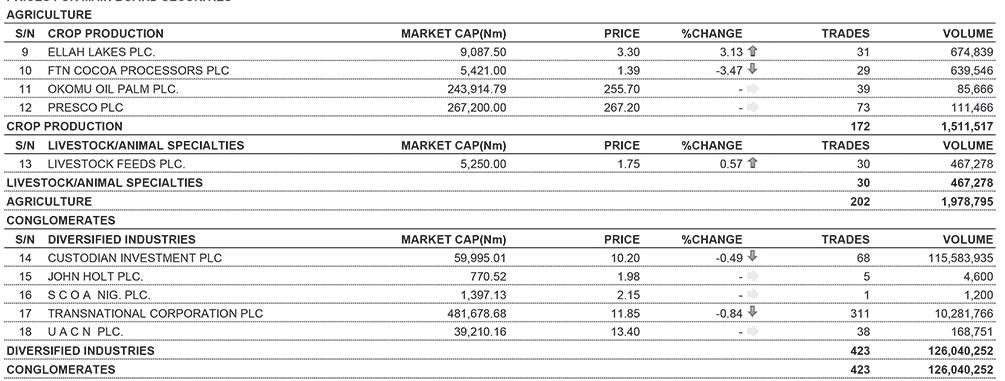
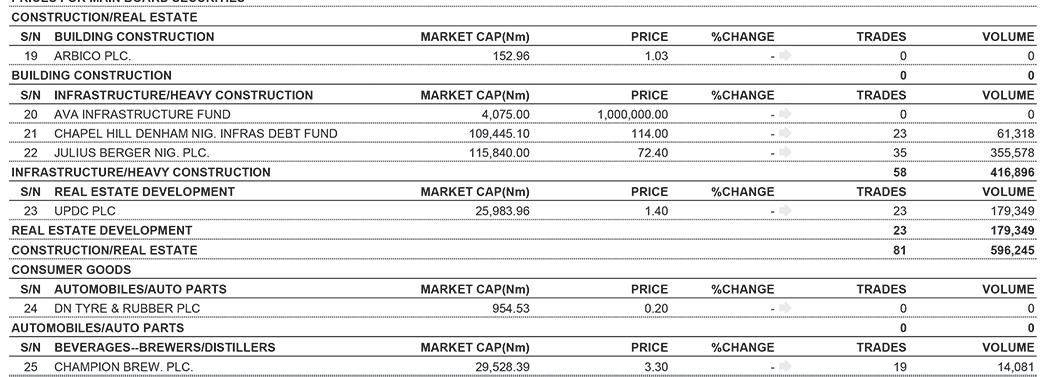


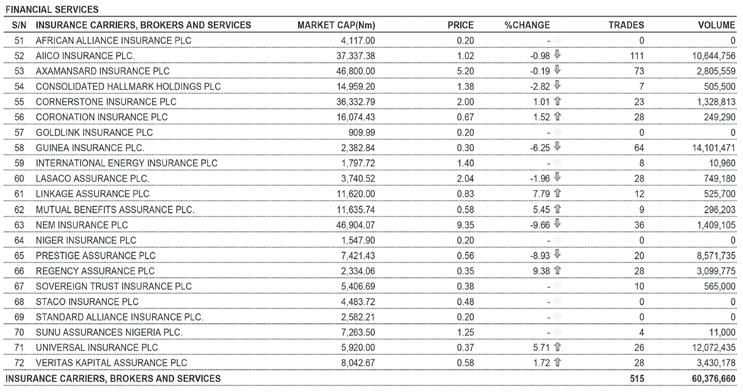


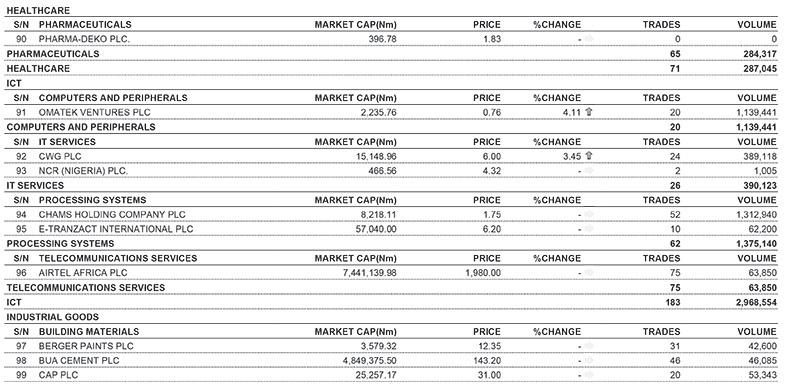

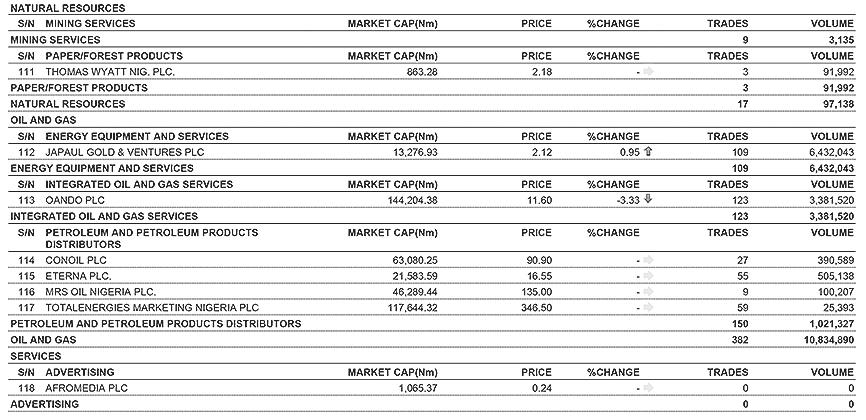




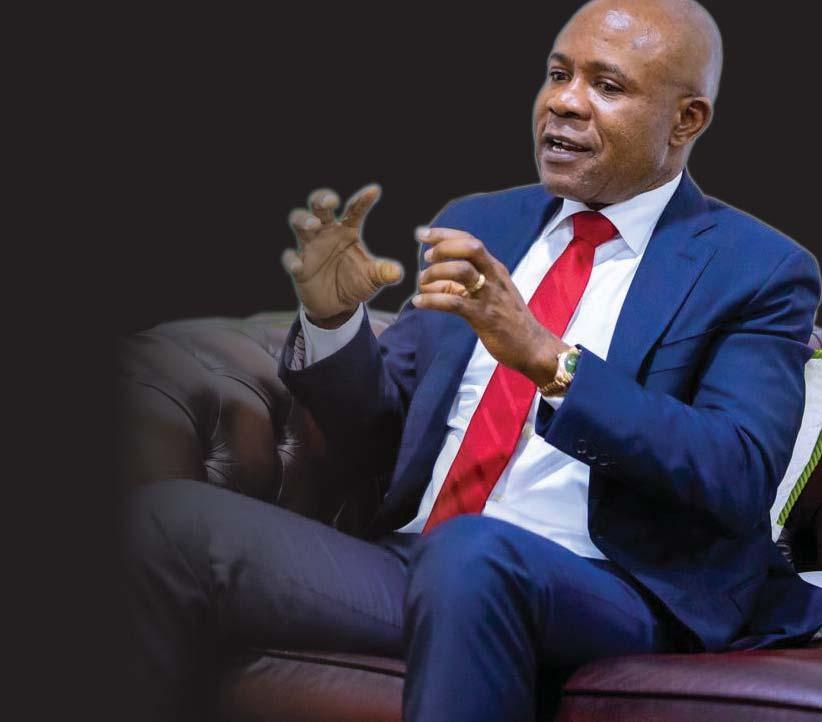
Enugu State Governor, Dr. Peter Mbah’s vision and mission are both unmistakable and irrefutable. He exemplifies the essence of governance without politicking. Imbued with corporate and entrepreneurial experience, coupled with expertise, Mbah’s exploits in the Coal City show that the sky could be the starting point of any state reaching for greater heights in Nigeria. A poster boy for technocrats in politics, more so with a second address, Mbah, within 180 days of assuming office, has delivered on several election promises, including the economy, security and infrastructure. He shares this and more in an interview with THISDAY. Excerpts:
What has the journey been like from a private sector individual to an elected governor?
For me, it was always going to be a journey of greatness, development and growth. When we were out there, talking to our people to give us their mandate to serve them, we also enjoined them to join us in this journey of greatness. So, we were quite deliberate in the journey that we embarked on. We knew with a high degree of specificity the programmes we wanted to execute. We had taken time to look through the challenges and pressure points.
When we developed our manifesto, which promised great things across all the sectors, it sounded like we were trying not just to overpromise. It felt like we weren’t even appreciative of the things we were seeing. It felt like these guys were coming from a strange location and into a new terrain without appreciating what the terrain entails. We understood the naysayers.
We also understood the critics and the doubters because otherwise, how would you explain a vision to grow the economy from a level of $4.4 billion to $30 billion in four to eight years? If you do the mathematics, let’s even take a horizon of eight years, that translates to a 27 per cent compounded annual growth rate; it doesn’t happen. I haven’t seen an economy where it has happened.
On top of that, we said we would not just grow this economy. We recognise that poverty is endemic. We have a 58 per cent poverty rate, and I said give me eight years, and I will achieve a zero per cent rate in our poverty headcount index. So, I think that got them paranoid. They could not understand where these guys were coming from. But the other thing we did, which is quite interesting, is that we didn’t just make a big statement or express those humongous promises.
We were also deliberate in terms of our timelines
because it is one thing saying you will do this, you will do that, and you leave it open-ended. But because we wanted to be held to account, we said, ‘Look, these are timelines for these things. Give us this period, and you will see this.’ So, we provided measurable indicators so that we could be measured by the people we were serving. They could look at our scorecard and say yes, this social contract we have executed with you, you are keeping your part of the bargain. So, the journey for us has been quite breathtaking.
We hit the ground running, conscious of those specific promises. Even before swearing-in, we recognised that, for example, in the water sector, we promised our people that within 180 days of assuming office, we would ensure that water runs in all the homes in our city. We are
thinking about water running in our cities. We are also thinking about the rural areas. And so, at the time we made this promise, we knew that we had pressures on the three streams of water delivery - the upstream, midstream and downstream.
At the upstream, our production capacity before we came in was barely occasional two million litres. So, we have now moved that volume from 2 million to 120 million litres. Our daily consumption in Enugu city is about 80m litres daily. But what we can produce today is not just enough to service our people. We also have a 50 per cent buffer so that if we have some pumps or machines that are down, we would not still have supply issues.
On our production side, we provided a buffer
We were very deliberate before we took office that a lot of the growth we are going to achieve will come from private sector investment. What that meant to us was if we must attract the private sector investment that we desire so badly, we must address the issues of insecurity. So, we set forth at dawn. Forty eight hours after the swearing-in, I convened a security council meeting where I made consequential pronouncements
for electricity generation. We put in place a 4.4 megawatts in our water scheme location at 9th Mile so that even when the grid fails you, you still would not have shutdowns because you step in your turbines, and the megawatts are gas-powered. We addressed squarely the issues concerning upstream.
Then the midstream, which concerns the pipelines that you move from the production point to the storage where you now deliver, to the reservoir. We also had to work on that. We are currently expanding that line to build buffers. Again, we are going to have a second midstream line that will be able to take another 80m litres because the city is expanding (and we are now doing the new Enugu City). We expect that our supply will be coming from the scheme that we currently have today.
There have been some challenges. There are three lines in the midstream, and of course, they extend downstream. You have the primary line, which is the mainstream line, that transport water from the production to the reservoir. But you have the secondary line. So, what we have achieved essentially is to make sure that we have taken water to all the secondary lines. The challenge we are dealing with constantly and treating as an emergency is making sure that the tertiary lines are all functional.
The tertiary line is where you now take from the secondary to the various households you have in the city. What we have realised is that people have built on those lines over the years. We notice that when you try to give water to a particular household, the pipe that transports water has already been built on and destroyed by lots of construction work. We have zoned the state into Abakpa, Coal Camp, GRA, Trans Ekulu, Nza Street, and UNEC, etc. We are dealing with the tertiary lines, and that is what we are
doing day and night because the objective is to go into your house, regardless of where you live, turn on your tap, and take water.
We were very deliberate before we took office that a lot of the growth we are going to achieve will come from private sector investment. What that meant to us was if we must attract the private sector investment that we desire so badly, we must address the issues of insecurity. So, we set forth at dawn. Forty eight hours after the swearing-in, I convened a security council meeting where I made consequential pronouncements.
The first was to ban the so-called illegal Monday sit-at-home. We did not just believe that we could possibly ask anybody to come into the state to invest if we still had non-state actors dictating to us the days of the week that we go to work and the days that we sit at home. We just felt that it was unacceptable and inexcusable. First, our primary purpose of being in government is to provide security and ensure that the well-being of our people is taken care of. It would put into question our commitment if our primary reason for existence is not addressed. It was almost like we were obsessed. We gave it everything.
First, to we made our people realise that the people we are dealing with are criminals, who profit from the so-called sit-at-home and that we cannot accept it. We had a series of town hall meetings, exposing the consequences, both for our work ethics and also for our children, who sit at home on a very important day of the week. We also recognised its challenges, even for our children whose learning hours were compromised. They were affected when the days for external examination fall on a Monday, they are excluded. It was unacceptable.
For decades, there was no water. When you promised that you would deliver in 180 days, people had reasons to doubt. But it happened. It was a signature achievement. How difficult was it to bring that to fruition?
First of all, nobody took us seriously. On one occasion, when I was interviewed on the radio before the elections, and I was still going on about the 180 days, asking the people to give me their mandate and in 180 days, I would provide them with water, I had a couple of people, who phoned in and dismissed everything I said, even when I was able to drill down, in terms of my execution strategy. It was still not conceivable.
Many people, especially teenagers, have never experienced tap water running in their homes, so it sounded strange to them that somebody was coming with a promise that if they turned their taps after 180 days, they would get water. There are a couple of things we did to achieve that. Even before making the promise, we recognised that there were several procurements that had lead items, and those lead items, if we did not plan, may impact our delivery timeline.
So, what we did was to pre-order. Given my background and exposure, I had to begin to talk to the Original Equipment Manufacturers (OEMs) way ahead of our swearing-in and get them to begin the production of some of the long lead items that we need because most of the procurement items are not off the shelf.
They are things that will be designed and built based on order. They have a minimum lead time, some extending to six months. How could we have possibly delivered in six months if some of the procurement items were not on the ground? We did quite a number of pre-orders, and from the day we were sworn in, I made efforts to deliver on our promise.
How did you stabilise the security of the state?
It was quite interesting because it was almost like an anathema even to pronounce that. How dare you even come out to say you are banning sit-at- home? But for me, it was a realisation that we had the mandate of the people to serve them; and under our constitution that we swore to uphold, the provisions under the Directive Principles and Objectives of state policies, you see that the key objective of governance is for you to provide security and the well-being of the people.
So, security was a major thing, and there were two things we had to contend with: our oath of office, which imposes on us obligations, including the provision of security. Also, we realised that if we must achieve the growth level that we have proposed we must address insecurity. This is because there is just no way on earth the public sector alone will shoot up our GDP exponentially as we have proposed. A lot of this growth had been planned to come from the private sector and of course, we know that the private sector doesn’t know how to de-risk insecurity. They can derisk finance and commerciality. But when it comes to insecurity, that is your responsibility.
Those two reasons were quite fundamental and compelling for us. We said that if we fail in this, we might as well resign. So, it meant so much to us that we provide security, and our work is not done yet because as you are hitting these guys, they are also coming up with their strategies. But we
For us, we believe that education is one of the strongest, if not the strongest weapon to fight against poverty. We know that the opportunity we give to the kids today will help us live in a sane society tomorrow, one that is safe and secure. What we essentially did was to have smart schools across the wards in Enugu state
have also taken some radical measures. Right here where we are seated is our Command and Control Centre where we will monitor activities in the state.
We are able to sit here and monitor what is going on in the entire state, starting from the Enugu metropolis in the first phase and it will be inaugurated soon. There are five key local governments that we consider dark spots, which we have also included in the first phase. The surveillance systems all have artificial intelligence embedded in them. You can have facial recognition of the people you capture on the camera and the number plate recognition. It is quite robust and a major leap in our fight against insecurity.
Most of your development projects are ward-based, like your 260 smart schools and healthcare projects. Why did you choose this as your model of development?
Our intervention in the education sector is unprecedented. I have not found anywhere where on the continent or elsewhere where the steps we are taking have been taken by one government within the timeline we set for ourselves. When we came in and saw the state of things, we could have decided to work on these things marginally or incrementally, like renovating schools and providing tables and chairs in areas where they were lacking.
But no, we felt that it was beyond infrastructure and that we had to announce a new dawn for the school children in Enugu. Firstly, we said that we needed to make sure that every child in this state had access to quality learning. If we achieve that, we want to have smart schools and make sure that these schools are in locations where every child can
have access to them. It is not an elitist thing.
Could that be the reason you devoted a whooping 33 per cent of the 2024 budget to education?
Yes. This is far higher than even the UNICEF standard of 15 and 20 percent recommendation.
For us, we believe that education is one of the strongest, if not the strongest weapon to fight against poverty. We know that the opportunity we give to the kids today will help us live in a sane society tomorrow, one that is safe and secure. What we essentially did was to have smart schools across the wards in Enugu state.
In each school, we introduced early child learning because basic education in Nigeria and globally demands that you have at least nine years of free education. But what we have done in Enugu state is going beyond that and providing 12 years of free and mandatory education.
From age three, we pick the index child and put that child through a pipeline of learning. So, they go through nursery, pre-primary 1 and 2 before they start their journey through primary school. From age three, the child is still very impressionable, and you can pour all the civic habits you want the child to grow with, teaching them personal development.
We have redesigned the curriculum. We also have experiential learning, migrating from the old method of teaching to what we refer to as experiential learning. We are setting up a Centre for Experiential Learning and Innovation where we have to get smart teachers. There are soft things you must put in place to be successful in the delivery of smart schools because it is not just about doing the infrastructure.
With the schools, these kids go through three years of early child learning, and what that also

helps us to do is that the child will have the opportunity to be profiled. We do the health profile of the child because each school has a clinic and a resident nurse. After all, we are dealing with our rural poor. And this is the interesting thing that excites me about the smart school because it is a leveller; you are providing quality learning to those who have nothing.
We believe that taking the kids through this high level of quality learning can allow them to become the best versions of themselves. We hope to produce our own Elon Musk and Mark Zuckerberg from the children because the skills we teach them are what they need to compete across the globe: robotics, artificial intelligence, and mechatronics.
They are 260 and and in each smart school, the classroom has an interactive smart board with camera. The board is quite instructive because it has all sorts of learning instruction materials embedded. The teaching and learning aids that the teacher needs are all contained in the smart board. From primary 1, the kids have access to their tablets provided by the government. They also have access to one balanced diet meal every day, over 300,000 of them. That is huge, but that is our future; if we don’t do it today, we will pay heavily in future. So, we have to decide to spend the money today and pay less for security tomorrow or pretend to be saving money and pay 100 times more to deal with security tomorrow. No child is left behind. We are collapsing all the mushroom school blocks we had. Each smart school can take as many as 1,000 students. We are also providing two school buses for each smart school. Every child comes through the smart school.
We have done some analysis and discovered that in some wards, we may have to do more than one smart school just to accommodate the students because we know the number each school can take. Our goal is to make sure that no child of school age is left behind and not just that. We are making sure that no child of school age is denied access to quality learning. It is a world of difference.
You seem to be setting ambitious and farreaching targets for your administration and challenging the people to hold you to account?
Let me say this, I understand when we have these doubts and when we have people express them and also criticise the way that we have expressed ourselves. But I am not so much worried because some of our followers may be going through some trauma, and the doubts may also be a function of that trauma, where they have come over the years to expect the barest minimum from their leaders. Now, hearing a leader say to them, ‘I am not just interested in taking you to where you want to go, I am interested in taking you to where you ought to be.’
And in my opinion, you are no less a person than a child in the UK or the US. It is the same thing with those who give instructions to the kids. If you are not qualified to teach my child, it will be unconscionable for me to still have you teach other children because the day I took this job, I became a father to millions of children. So, for me, education is a life-long thing, and I also know the power of education. And most of the things we are dealing with today are because we have young people, who have no reason for hope and do not also have skills, and that is why they take to criminality as a venture. So, if our children go through the system, we will not have an 18-year-old, who does not have a skill. You cannot go through the quality of training we want to give to you from age three and at 18 you start looking for what to do. You can compete with your peers across the globe. So, even if you don’t have a job, you have reason for hope because you are equipped with the right skills to face the future.
Training of the teachers who will impart knowledge to these people is equally important. How about that?
We are doing it in critical mass because we know that we have to churn out a minimum of 6,000 to 8,000 teachers in the next one year that are smart school teachers.
So, are you recruiting them?
We are not just recruiting. We are training them aggressively. In fact, over six months ago, we developed a curriculum. By the way, we are getting a lot of support from overseas as well, in some of these future skills like mechatronics, robotics and all that. In fact, I have an SPA on education, who is an American. You can see that this support is enormous; she’s actually heading our drive on experiential learning, and that’s her expertise, she took a sabbatical to be able to help us with the work we’re doing here, and so we are quite deliberate.
This is not a kneejerk thing:’Oh, it is fanciful to do smart school, so go and start putting up the infrastructure without looking at the other details’. No, we have thought through it to the minutest details: the kids, and even the various activities to complement the curriculum we developed. We’ve also built all that, so if you go to the smart school that is functional and you see the kids, you will be amazed at how they have transformed within a period of six weeks, you will just be amazed.
So, when you see this transformation, whatever it takes you to find money to do this, you know that this is the future, investing in these kids. If these are the only thing we’ve done in the eight years of governance, we will be leaving with our heads very high.
Some people fear you are overpromising. You promised 10,000km of road in eight years, 1,000 per year. Is this possible, given the struggle of several states, and even the federal to keep up with road infrastructure needs? If they are able to do 1,000 in eight years, they will roll out the drums.
It is a challenge. The challenge may not even necessarily be with the funding, it will be with the number of factors, and we are pushing it. Look, in less than two months after our swearing-in, we awarded the contract for 71 city or urban roads and 10 rural roads and all those projects are going on. About 90 per cent of the city roads are almost done.
The rural roads are in different stages of completion, some of them still 65, 45 per centbecause they are quite a long stretch. We have one that is about 80km, we have another one 41km, we have 23km, 22km. These are quite some stretch. It takes some time to do these roads. As I said, the challenge with the execution, however, also has to do with the type of weather we have.
You know, I am now struggling to push the contractors to their limits to see how they think outside the box, how they are able to still do some minimal work even during the severe weather seasons like the rainy season. Unfortunately, we have to live with that six months in a year, which leaves us barely six months to deliver some of these things, but the strategy for us to accomplish as much as possible is to spread.
So, we’ve awarded the contract with quite spread, but the risk with that again, is that you are now faced with the construction risk. So, you need to increase your monitoring and quality assurance cost. You have to get in a lot of your team, who are meant to be doing other stuffs to now do the monitoring. So, they all come with their challenges, but are we determined.
You talked about strategy. We are working with the contractors. We are sitting down with them to talk about strategies on how we can help, so in some cases, you notice that we tend to pay the contractors more than the normal thing you will pay contractors as mobilization because there are two things we are trying to achieve: we want to avoid variation.
Secondly, we want them to procure all funds so that the cost is frozen. So, you don’t come tomorrow and tell me, ‘I have a cost overrun.’ We frontload some of this payment and say, ‘Look, mobilise as much as you can, get this thing done. If you are meant to do it in 18 months, do it in 12 months instead. How can we help you?’ In some cases, they say, ‘Pay us 70 per cent or so’, and we will give you a performance bond. We will give you a bank guarantee so that you have comfort that we will deliver, and if we don’t deliver, you call upon us.’
We are devising a different strategy to ensure that we accomplish a lot within a short space of time, and given all the challenges we have with the weather.
Tell us how much of the 1,000 kilometres’ target per year you have achieved in your nearly one year in office
Right now, we’ve done over 500km of road. Some of the challenges we had included the length of time it took to design these roads. Again, it is not off the shelf. You don’t just pay the contractors and they move in. First of all, your team will design the road. You would go through the the process of detailed engineering design process, and then, of course, you would get a quantity surveyor to quantify those designs before you now invite bids. So, for all those processes, and given the time we had left, we would still push to achieve our target in that area. You recently awarded the contract for the rehabilitation of Hotel Presidential. Why are you reviving it? Why not just sell it to private business people? Is it the place of government to be running businesses?
On a lighter note, when we were campaigning, we didn’t tell the people to elect us that we would sell all their assets. We told them to elect us, that we would revive more moribund assets. That
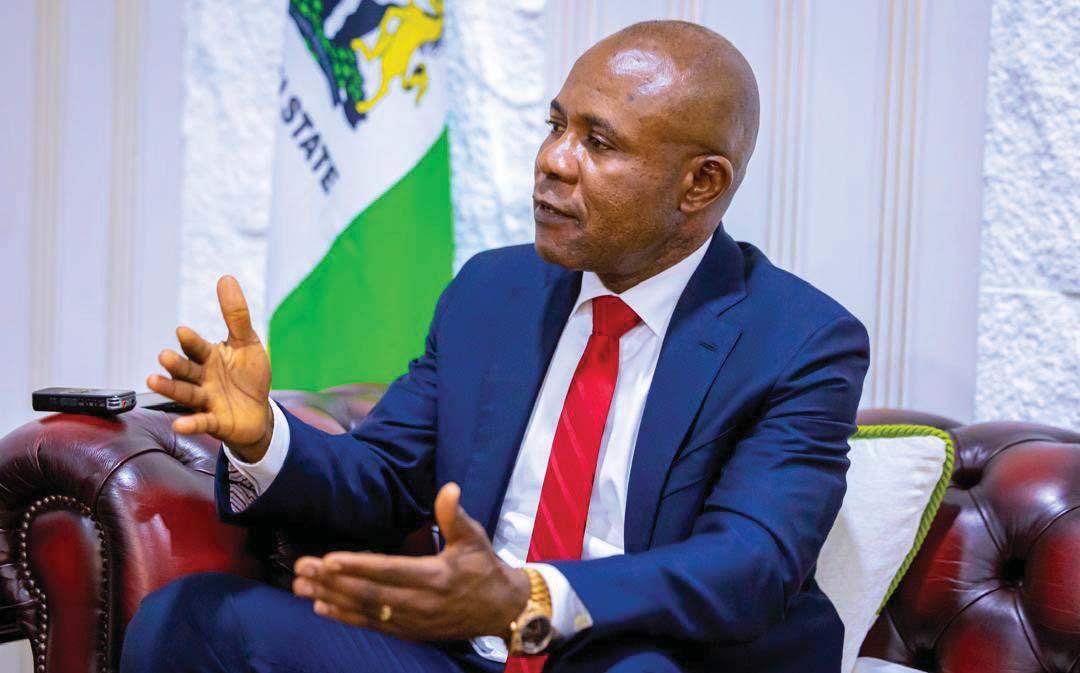
You cannot go through the quality of training we want to give to you from age three and at 18 you start looking for what to do.You can compete with your peers across the globe. So, even if you don’t have a job, you have reason for hope because you are equipped with the right skills to face the future
was a commitment we made to them. Therefore, if we have to change that, then we need to be able to explain to them. Why did we then promise?
It would mean that we didn’t even do our basic research. So, we were quite deliberate.
A lot of these assets we are talking about are quite historical assets and they are of great economic and historic importance. We felt that even if we wanted to sell them that they would have absolutely no value because whoever is coming to buy them would be thinking about just buying them, stripping them off and just selling them as scraps. Consequently, for us, it was not a strategy at all.
I agree with you totally that government has no business running businesses; but we do have a responsibility to enable the private sector to come in, hence our strategy has always been a government-enabled but private sector-driven economy. But because of the state of some of these assets, if you bring in the private sector, they see all sorts of risks, and you are also faced with the risk that if you concession them at the stage that they are now or if you privatise them at the state that they are right now, they would all be just stripped off. They will not have the economic benefit that we will want them to have. What do we then do? We then took the decision consistent with the promises we made to our people. We basically started investing in those assets to revive them. So, we’ve done the Hotel Presidential contract; that construction is ongoing; we hope that in the next 10 months, it will be fully operational. We can then begin to talk about perhaps finding investors and whatever we have spent most likely, we are going to double it, because it now has value.
You are not just assessing it as a building, you are assessing it as a business because it is now a going concern, unlike what you would have done initially if we had gone into privatisation or concession straight away. They will just be looking at the asset valuation. But once we have it up and running, you will assess it not just based on the valuation, but also on the business value.
We’ve done the same thing for the International Conference Centre. In less than six months, that too will be operational. They all tie into this whole module of enabling the environment and having the private sector to drive them. So, if you look at
our airport, we are also interested in reviving the international wing of the airport. We are aggressively working with the Federal Government and it will soon be operational as well.
The cargo side of things too, we are trying to build a brand-new cargo terminal where we can take cargos. Therefore, you have warehouses and all that. Now if you are going to have your international wing of the airport working, you are going to have the ICC (International Conference Centre).
So assuming you have 5,000 people coming into Enugu for a conference, do you have standard 5,000 keys that these people can use? So, if you followed up our activities today in our Executive Council, we have also just awarded a contract to build a five-star hotel by the Conference Centre, outside the Hotel Presidential, 380 rooms. That one is also ongoing because ultimately if you are going to bring in all these other airliners to fly to Enugu, you need to be able to show that you have hotels where their crews can stay. So, everything ties together.
You signed a N100 billion deal with Pragmatic Palms Limited to resuscitate the moribund United Palm Products Limited in Enugu. How does it tie into your economic plans for the state?
It is in line with the revamping of these moribund assets. Incidentally, the United Palm Products Limited has an asset of oil palm plantations that span across 6,700 hectares, and this was built by Michael Okpara. They were structured because we also had what used to be known as the Anambra Vegetable Oil Production Company today known as Enugu Vegetable Oil Production Company. All of those are not functional, and we do not think it is acceptable to have these humongous assets built by our forebears lying in waste.
Today, our deficit in terms of our consumption needs for palm oil is over 500,000 metric tons, which we have to import, and we are the fifth largest producer of palm oil in the world. Yet we still have a deficit. We are not producing enough to service our market. We are talking about an industry of over $70 billion.
Some countries like Indonesia make over $26
billion from the export of palm oil alone. This is more than half of what we generate from crude oil exports as a country. It is a big market out there. When we saw the opportunity to partner with the company and their business and investment plan, we felt that this was an opportunity worth exploring, and we went straight into it.
The discussion started in 2023, and I am glad that we have finally put pen to paper. We got a deal that was a win-win for both the state government and the company. The state provided their plantation and land assets and got 40 per cent equity for an investment size of N100 billion, and the company will provide both equity and debt financing for the other balance of the money, and will have 60 per cent.
The governance structure also took care of the state’s interest because we are to nominate the chairman of the board whereas the company produces the CEO. It is going to be a seven-man board where the state has three members, and the company has four. It is a well-structured deal, and I am glad we could get that for the state.
But there were reactions that the company was only registered a few days before the signing of the deal and that the deal didn’t smell right.
That is a pathetic misconception, and that is because people express themselves without having a basic understanding of how transactions of this nature are designed. For businesses like this, the best strategy for getting into them is to have a Special Purpose Vehicle (SPV) where all the investors subscribe and then have their interest recorded. Sometimes, you could have signed the contract before the SPV was even set up, and it does not invalidate the contract that you have signed or the fact that the SPV was just set up.
Even the Company and Allied Matters Act (CAMA) made provision for pre-incorporation contracts, and it is perfectly in order. It absorbs the contract for the company as though it existed before the incorporation. It is the best and most structured way of getting into transactions like this. The company in question is not a portfolio company. It has played and invested hugely, even in the space they are coming into now. They have about the biggest silo complexes in the country. They are the sole investors in the Onitsha River Port. They have invested in the hydropower project. We looked at their background and did advanced due diligence before we got into the agreement stage.
Where are you getting the funds for all these projects, or do you now print money?
No, we don’t print money. Ours is disruptive innovation. We said that we are going to disrupt the status quo. So the key disruption when we talked about disruptive innovation and all that was in two areas that were quite key. We knew that if we must achieve anything, we must disrupt our revenue module. So, we kept saying that we are going to disrupt our revenue module, we are going to be creative with our financing model, and we are going to think outside the box.
Therefore, what we have done is to truly disrupt that revenue module. Before we came in, the revenue of the state focused largely on revenue from the federation so the budget and a lot that happened were largely based on the flow of funds from the federation. They simply worked out how much they were expecting from the federation in any given year and everything then revolved around that. Therefore, we took a different view, we took a bold view of what we could achieve in terms of our revenue, so what we did was to look at how to enhance our internally generated revenue, what are those things we need to do. So, first of all, we looked at how to block the leakages. We realised that quite a lot of leakages existed with the payment structure where people accept cash and all that. So, we made sure that payments are only made through the government payment platform and to the TSA. Then we started looking at how to enhance our revenue, how do we expand the revenue net. Therefore, we also began to introduce electronic payment across different sectors. So if you take for example before we came in, some sectors where we generated about N100 million, today we are talking about billions.
For example, in the transport sector, before we came in, the revenue from that sector was barely N140 million annually. Today ,our budget for transport is over N13 billion, so imagine from generating a paltry N140 million to N13 billion. It is not magic. Also from land, before we came in, our revenue was anywhere around N801.2 million annually and was like that over the years. Our budget, our projection for land this year is over N100 billion. So, it is not that we are printing money, we are just making sure that we capture these revenues from wherever they are coming from and making sure that they are spent in the interest of the people.
Consequently, we are just spending the people’s money in their interest, first of all, capturing, making sure we amalgamate the funds wherever they are, making sure they get into the system so they are all captured and then we spend them prudently in the interest of the people.
How much was the internally generated revenue before now and how much are you generating today?
Before we came in, we were doing anywhere between N25 billion and N30 billion annually. So, the highest the state did before we came was N30 billion. But our projection this year is N287 billion, and we hope to hit that target.
Are you on the path to achieving that?
Yes. We have put a lot of things in place. So, we’ve moved from doing N1.5 billion monthly IGR to doing well over N5 billion now. The impact of the real things we’ve put in place, the impact will start being felt from May/June because they require planning, and we are doing all these NG now. We have the Enugu Geographic Information System. You know we just set up the agency. We are now setting up all the platforms.
The Land Use charge demand notices that were issued before we came in, was about 5,000 household units, but today, we have lined up to issue well over 800,000 demand notices. But you needed technology to drive these things. So, if we didn’t set up this Geographic Information System and property information system, you wouldn’t be able to know this thing. Those things will automatically generate this demand notice because you programmed them to do so, they are not human-driven. They are driven by technology.
You immediately took advantage of electricity deregulation. You were one of the first to set up your electricity commission and get NERC’s approval to devolve electricity supply. There are concerns that states should be cautious in rushing into that. What exactly was the motivation?
It is not rocket science. First of all, we welcomed the idea when the Electricity Act was signed into law in June last year. We knew that decentralising
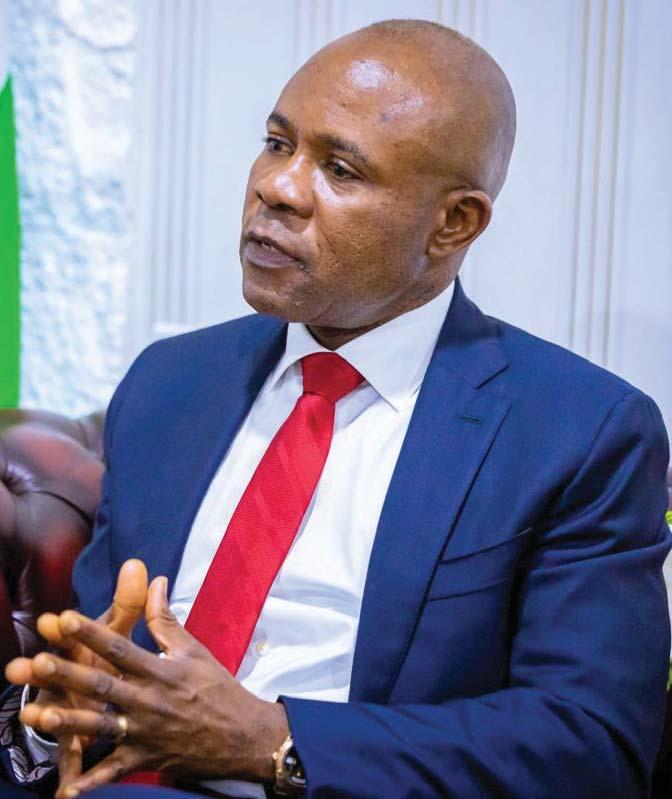
electricity production would be in the country’s best interest because the top-bottom approach we have used over the years have not really worked. What the act essentially did was to say we can actually build electricity from the peripheral, from the states, and that is essentially what we have taken advantage of.
To do that, there were some legal frameworks that we needed to put in place. For us, we enacted our electricity market Law and then, under the Law, in line with the Act, we needed to set up the Enugu Electricity Regulatory Commission. Under the Act, NERC is meant to devolve power to the commission. But the question is, what is the objective of this decentralisation of power generation and the entire value chain of power generation, transmission and distribution?
The whole essence is for us to say that it is unacceptable that a country of 230 million people has a generation capacity of 12,000 megawatts, and we are not even able to evacuate more than 6,000. You cannot service the London underground with just 6,000 megawatts. The New York Subway needs 11,000 megawatts to function, and we cannot boast of that as a country. That is why this Act is very good because I cannot complain as a governor.
It is now within my power to think through how I want to make sure that my people have a 24-hour power supply because I now have the right power to play in the generation, transmission and distribution. I can do an audit of the power needs of Enugu and say the state needs 1,000 megawatts of power supply to have reliable and sustainable power supply across the state. Then, we begin to think about the investment, and a number of these investments are bankable. We think about the generation, transmission,and distribution to the last man to ensure that all
When it was time for the elections, we believed that we had given it our best and told them the truth as we knew it, and we just left everything to God and asked for the will of the one who ultimately makes a leader, to be done. It was a hard fought one, but we are glad that our people gave us their mandate to serve them
are using education and skills. For us, it is education, education and education, and that will put the final nail in the coffin of poverty. By the time we have these young minds all skillfully equipped, they will not come to beg you for money. Even the problems we have today will be fixed because we would have invested hugely in them.
What is the need for the New Enugu City?
Enugu is choking. This is the Enugu we have had since the colonial masters designed it. Enugu has been the administrative hub of a lot of governments, beginning from the Eastern Region to the East-Central region, the old Anambra, and when we were with Ebonyi. Enugu hasalways played the role of an administrative headquarters. So, there are quite a lot of people outside the indigenes who have Enugu as their home.
We have always said that outside Lagos, Enugu is the most cosmopolitan city in the country, housing people from all ethnic groups. Some of them are fourth and fifth generation, who do not see themselves as coming from any other place outside Enugu. They all see home here. Now, Enugu needs to breathe. So, we are trying to extend the city. The difference is that we are going to have a new city, a modern and smart city. If it is worth doing at all, let us do it well.
I don’t see anywhere in the country that will compare to what we are doing there. It is going to be a serviced city; you don’t need to come in with your generator. Twenty-four hours of power will be provided; water, internet, and gas pipeline will be provided. Your sewage and everything will be taken care of. You just plug and play.
This interview can’t be rounded off without talking about the election. 3,000 votes made the difference during the Enugu governorship election. How did it go down so close, and what was going on in your mind?
the gaps in the federal structure do not exist. It is a welcome development, and I don’t think we are rushing it because the timelines were specified when you set up your regulatory commission; you have between 30 days for NERC to devolve power to them. From when that power is devolved to them, you need six months of transition. All that is built in. So, we expect that by October, we will have been fully transitioned into a full state regulatory commission. So, there are safety measures that are built into the Act to be able to stop you if you try to run too fast.
You promised a zero-poverty headcount in Enugu, some people are like i that possible? Now, tell us how do you plan to achieve that?
There are two measures we have taken. One is in the immediate and short term, while the second is in the medium to long term. In the immediate and short term, we are increasing our productivity in the agriculture space. We have built a land bank of over 300,000 hectares, and we are enhancing the productivity of our farmers. We are encouraging them to produce more, and we are not just producing, but also getting into partnerships with several processing companies.
We are in discussions with a private investor who is coming to set up an Integrated Produce City. We are also talking to one, who is coming to set up a Modular Processing Plant, and then again, we are one of the states that have been picked for the special agro-processing zone. We have gone far with that. We want to be able to guarantee food security. For us, agriculture is beyond food. We also see it as business and that is why there is huge investment in the agro-industrialisation schemes that we have. We are doing quite a lot.
We are also procuring a lot of tractors and implements to support our farmers. 300,000 hectares is massive, and that is what we have been able to put together to enhance productivity and with the sort of activity going on in every ward where you have an investment of about N1 billion in the smart school and primary healthcare centres. What we are doing with the schools, we are also doing with primary healthcare through the construction of 260 type II primary healthcare centres, including the staff quarters. There will be water, hygiene and sanitation. But let me finish with how we intend to achieve the poverty eradication. In the immediate to short term, we are enhancing our productivity, increasing our production level and supporting our farmers. In the medium to long term, we
We had always believed that our people would make the right decision. When we came out, we were very open to them. We told them in clear terms and challenged them to look at our backgrounds and not take our word for it; go and interrogate what we did for a living, and look at the intentions. The only way you can assess the veracity of what I am saying is by things that you can validate. So, we asked the people not to take my word for it. I asked them to go and probe into my past and look at how I was able to grow a business from zero point to a market leader. Look at my source of wealth, all I have done, and the disruption I have made in the oil sector. We came in through a mature sector and a marketplace where you already had the incumbents and market leaders. Even getting some market share was a difficult thing.
For me to displace the incumbents and become the market leader would not have just taken a routine or incremental thinking model, but a disruptive innovation. We told our people that we would replicate the same thing we did in the private sector in the state and disrupt the status quo.
When it was time for the elections, we believed that we had given it our best and told them the truth as we knew it, and we just left everything to God and asked for the will of the one who ultimately makes a leader, to be done. It was a hard fought one, but we are glad that our people gave us their mandate to serve them
Reforms always elicit resistance from those who benefit from the status quo. Tell us what fightbacks you have experienced and how you are dealing with them?
I think our people are coming to terms with what we are doing because this disruptive innovation is not just something they hear but also touch and feel. Of course, you will have some pushback from people, who do not think this is in their best or personal interest. They naturally will push back. But I think that the more we move, they will see that we are committed; that we are not about to be distracted; the fact that every day is a new thing that is touching lives, and not about Peter Mbah. But it will be uncomplimentary to conclude this interview without underscoring the fact that a lot of these things that we have been able to accomplish would not have been possible without my team. I feel eternally grateful to the kind of team that we have assembled to work with. As laudable as my vision and dreams can be, if we do not have the right people to execute with, we would still not be able to make the progress we have made. I give credit, a lot of it, to the team I am working with. They also get the pushback. But again because what keeps us awake at night and gives us our kick is the people, we will continue with it.

The Central Bank of Nigeria (CBN) yesterday announced the withdrawal of the controversial circular on the implementation of 0.5 per cent levy on all electronic transactions value as part of measures to tackle the rising threats of cybercrime in the financial system.
The withdrawal was conveyed in a circular dated May 17, 2024 and addressed to all commercial, merchant, non-interest and payment service banks; other financial institutions, Mobile Money Operators and Payment Service Providers - and jointly signed by CBN Director, Payments System Management Department, Chibuzo Efobi, and Director, Financial Policy and Regulation Department, Haruna Mustafa.
The brief circular read, "The Central Bank of Nigeria circular dated May 6, 2024 (Ref: PSMD/ DIR/PUB/LAB/017/004) on the
above subject refers. "Further to this, please be advised that the above referenced circular is hereby withdrawn. Please be guided accordingly."
On May 6, 2024, the central bank ordered the implementation of of the levy followed the enactment of the Cybercrime (Prohibition, Prevention, etc) (amendment) Act 2024 and pursuant to the provision of Section 44 (2)(a) of the Act, which provided for the rate deduction. But followed sustained public backlash, the presidency had earlier order the withdrawal of the policy in a statement.
The apex bank further explained that the deducted funds are to be remitted to the National Cybersecurity Fund (NCF), which shall be administered by the Office of the National Security Adviser (ONSA), a decision that had been contested by stakeholder who queried the legality ONSA receiving unappropriated funds with the approval of the National
Assembly.
Accordingly, all banks, Other Financial Institutions and Payments Service Providers are required to implement the new provision of the Act as directed.
The central bank noted that the levy shall be applied at the point of electronic transfer origination, then deducted and remitted by the financial institution.
The deducted amount shall be reflected in the customer's account with the narration: "Cybersecurity Levy".
The CBN further clarified that deductions shall commence within two weeks from the date of the circular for all financial institutions and the monthly remittance of the levies collected in bulk to the NCF account domiciled at the CBN by the fifth business day of every subsequent month.
The apex bank further directed that system reconfigurations towards ensuring complete and timely
submission of remittance files to the Nigeria Interbank Settlement System (NIBSS) shall be completed within four weeks of the circular for commercial, merchant, non- interest and Payment Service Banks; and Mobile Money Operators.
Also, Other Financial Institutions (Microfinance banks, Primary Mortgage banks, Development Finance Institutions) will be required to effect the completion within eight weeks of the circular.
The circular however, exempted some transactions from cybercrime levy.
They included loan disbursements and repayments; salary payments; intra-account transfers within the same bank or between different banks for the same customer; intra-bank transfers between customers of the same bank, and Other Financial Institutions (OFIs) instructions to their correspondent banks.
Exemption also applies to interbank placements; banks' transfers
Names 15-man presidential steering committee on project evergreen Ngelale is Special Presidential Envoy on Climate Action
President Bola Ahmed Tinubu has approved the appointment of the Infrastructure Corporation of Nigeria (InfraCorp) as the Lead Arranger and Developer of Evergreen City, Nigeria’s green industrial zone.
The move, according to a release issued yesterday by presidential spokesperson, Ajuri Ngelale, is in line with the president's commitment to ensure industrial development that meets the demands of the present and the future.
The appointment of InfraCorp as Lead Arranger and Developer, he said, is with the following terms of reference: “Selection of partners/ consultants to undertake critical development activities, including project design, environmental impact assessments, feasibility studies, financial modelling, and market engagement.
“Raising private funding for the development of the city and constituent projects. Coordinating with partners, development institutions, and other providers of capital and technical assistance as well as reporting to the Supervisory
Presidential Steering Committee on Project Evergreen”
The CEO of InfraCorp, Dr. Lazarus Angbazo, holds a first-class Bachelor’s degree in Mathematics; a Master’s degree in Industrial Engineering and Operations Research from the University of Iowa, and a Doctorate degree in Corporate Finance from the New York University.
He was President and Chief Executive Officer of General Electric in Nigeria, where he doubled GE's revenue.
He was also the CEO of General Electric Grid Solutions Africa and led GE's regional operations between 2008 and 2012 as President and CEO, West, East & Central Africa.
Tinubu also approved the establishment of a 15-man
Presidential Steering Committee on Project Evergreen, the supervisory technical working group, to oversee the pioneering endeavour.
The committee membership include: Ngelale, Special Presidential Envoy on Climate Action-Chairman; Lolade Abiola (UN SE4ALL), Secretary; Lazarus Angbazo (CEO, InfraCorp); Salisu Dahiru (CEO, National Council on Climate Change (NCCC); Aminu Umar-Sadiq (CEO,
Nigeria Sovereign Investment Authority (NSIA); Khalil Halilu (CEO, NASENI), among of others.
The president, according to the statement, expects absolute dedication and professionalism to drive the critical project with the clear objective of making Nigeria the leading manufacturing hub in Africa for renewable energy technologies, green solutions, and climate-adaptation technologies for the maximum benefit of Nigerians and Africans at large.
Separately, a statement issued yesterday by Director, Information & Public Relations, Office of the Secretary to the Government of the Federation, Segun Imohiosen, said Ngelale will serve in his role as part of a larger Presidential Committee, to be chaired by the President.
The Presidential Committee on Climate Action and Green Economic Solutions is to coordinate and oversee all policies and programmes on climate action and green economic development.
The statement said the committee will remove the constraints to coordination, foster a whole-ofgovernment approach to climateaction programmes, provide an
efficient governance architecture, and ensure that all relevant institutions in the sector are plugged into the President’s vision and are collectively implementing the Renewed Hope Agenda on climate action.
The Presidential Committee on Climate Action and Green Economic Solutions is to be chaired by President Bola Tinubu.
The presidential committee has among other functions to identify, develop, and implement innovative non-oil & non-gas climate action initiatives.
It shall also coordinate all activities of relevant federal institutions towards the attainment of all agreed climate action and green economic objectives and non-oil/non-gas ambitions of the federal government.
It will also collaborate with all relevant government, subnational governments, non-government, and civil society entities towards the attainment of the climate action objectives and ambitions of the federal government, collaborate with national governments and multilateral institutions towards the attainment of the climate action objectives and carbon market ambitions of the federal government.
to CBN and vice-versa; inter-branch transfers within a bank, cheques clearing and settlements; and Letters of Credits (LCs).
Others include banks' recapitalisation related funding only bulk funds movement from collection accounts; savings and deposits including transactions involving long-term investments such as treasury bills, bonds; and commercial papers; government social welfare programmes transactions e.g. pension payments; non-profit and charitable transactions including donations to registered non- profit organisations or charities; educational institutions transactions, including tuition payments and other transaction involving schools, universities, or other educational institutions.
Transactions involving bank's internal accounts such as suspense accounts, clearing accounts, profit and loss accounts, inter-branch accounts, reserve accounts, nostro and vostro accounts, and escrow accounts are also exempted from the levy.
The central bank warned that Section 44 (8) of the Act prescribes that failure to remit the levy constitutes an offence liable
on conviction to a fine of not less than two per cent of the annual turnover of the defaulting business, among others.
All institutions under the regulatory purview of the CBN are directed to note and comply with the provisions of the Act and the circular.
A report by Proshare had questioned the legality of the ONSA) to receive unappropriated funding for its activities, particularly the controversial cybersecurity levy aimed at tackling the growing threats of cybercrime.
It said allowing the ONSA access to funds without the approval of the National Assembly was not only unconstitutional but against global practice.
The report stated that the move tended to make account holders pay the government for a service already covered by financial institutions in their digital transfer charges.
Specifically, it argued that the levy was needless and amounted to double-taxation of bank customers since depositors’ funds up to N5 million are already covered by the Nigeria Deposit Insurance Company (NDIC).
Sunday Ehigiator
The School of Media and Communication, Pan Atlantic University (PAU), has nominated THISDAY Newspaper’s Group Features Editor, Chiemelie Ezeobi, among participants, for the third edition of the MTN Nigeria, Media Innovation Programme (MIP-3), scheduled to begin on Monday, May 20, 2024.
The six-month-long fellowship programme, which is in partnership with PAU, is a fully funded fellowship for Nigerian media practitioners, designed to support the sustainable development of the nation’s changing media scene.
According to MTN, the course is designed to give participants a greater understanding of Nigeria’s technology sector and the nexus between media and technology.
“It will also leave participants better able to adapt to changing realities. Fellows will also have access to professional resources and mentorship from the SMC
faculty.
“We are driven by our belief that everyone deserves the benefits of a modern connected world and are driving accelerated growth by leading digital solutions for Nigeria’s progress.
"Thus, it is only fitting that we support developments in the Nigerian media space with our infrastructure and enable capacity-building initiatives to enable innovation in media practice,” it said.
The PAU admission letter addressed to Ezeobi, from read thus: "We are hereby pleased to inform you that you have been selected to participate in the Media Innovation Programme (MIP), fully sponsored by MTN Nigeria, commencing on May 20, 2024, at the School of Media and Communication (SMC), Pan Atlantic University-Main Campus, Ibeju-Lekki, Lagos.
“The programme is for the duration of six weeks spread across six months from May 20 to October 23, 2024, and includes a study visit to South Africa in September 2024.”
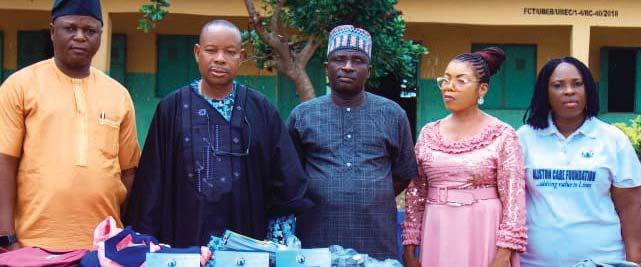
John Shiklam in Kaduna
Leaders and stakeholders of the ruling All Progressives Congress (APC) in the North-west, weekend, commended President Bola Tinubu
for tackling Nigeria’s challenges with courage and uncommon commitment. They, therefore, resolved to continue to support Tinubu’s administration to address the emerging challenges.
The position of the Northwest leaders was contained in a communique issued on Sunday in Kaduna at the end of the inaugural meeting of stakeholders in the zone.
The communique read by Kaduna
State Governor, Senator Uba Sani, said, “In view of Mr. President's undiluted support and assistance to the North-west, stakeholders called for continued support for President Tinubu's administration
John Shiklam in Kaduna and Adedayo Akinwale in Abuja
Speaker of the House of Representatives, Hon. Abbas Tajudeen, has called on the National Chairman of the ruling All Progressives Congress (APC), Dr. Abdullahi Ganduje, to address the turnover of National Assembly members and allow members with performance to return in 2027.
Speaking at a meeting of APC stakeholders in the North West Zone, in Kaduna, yesterday, Abbas, also urged Ganduje to set up reconciliation committees to unite party members across the country. According to him, “On the issue
service was activating its “rapid response mapping service in view of the helicopter accident”.
Raisi was heading to the city of Tabriz, in the north west of Iran, after returning from an IranAzerbaijan border area, according to local media, when the accident happened.
The United Arab Emirates also offered support and said it stood by Iran. Turkey sent a mountain rescue team to Iran, and earlier, Turkish President Tayyip Erdogan said he was saddened by the accident, Writing in a post on X, Erdogan said: "I hope to receive good news from Raisi and his delegation as soon as possible"
US President Joe Biden had been briefed on the incident, according to a White House spokesperson.
Antonio Guterres, UN Secretary General, said he was following updates on the crash. "He hopes
of the high turnover of members of the National Assembly, this is a golden opportunity under your tenure to ensure that you do everything humanly possible for current (APC) members of the National Assembly and States Houses of Assembly to return in 2027. Some people may say there are others waiting.
“But I need to emphatically mention that the National Assembly is an institution where the older you are in the system, the better you become. Today, the Northwest, based on the 2023 elections, is worse off.
“That is the reason, perhaps, we did not get the kind of prominence we should have gotten. So, let's
ensure that only the worst of us do not get reelected. We should give the competent ones the opportunity to return to the National Assembly."
Discussing the state of the party, the speaker said peace building would bring more successes to the APC as one big political family.
“I want to call on the National Chairman and our party executives to ensure peaceful coexistence among all party members.
“As previous speakers have said, we are bedeviled with many issues in different states, in every local government. It is time to draw a line. Elections are over; this is time for governance,” Abbas said.
He added that: “We should
forget what has happened. Let's forgive one another, let's embrace one another.
"I want to suggest to the National Chairman, and by extension the National Vice Chairman, to, as a matter of urgency, constitute reconciliation committees for the zone and for every state to constitute the same reconciliation committees so that we can make peace and bring those that we may have offended back to the party.”
Abbas commended President Bola Tinubu for appointing people from the north-west zone into some key positions, stressing that the zone should appreciate him by redoubling its efforts in 2027.
as he strives to steady the ship of the Nigerian state.”
The communique stated that the stakeholders took a critical look at the state of APC in the North-west and activated its internal dispute resolution mechanism to resolve pending issues.
They also charted the pathway to a more formidable zonal structure that would ensure victory for the party in future elections.
The communique read, “The meeting commended President Bola Ahmed Tinubu, for his steadfast commitment to the fulfilment of his campaign promises to the Nigerian people.
“The meeting noted the decisive steps so far taken by the president in tackling Nigeria's multitude of security and developmental challenges, and the far-reaching reforms he has initiated to reflate the economy and combat soaring inflation.
“The meeting observed that Mr. President's Development Agenda has positively impacted the Northwest Zone, especially in the areas of human capital development, agriculture, education, poverty alleviation, and infrastructural development.
“The meeting equally commended the various security agencies working tirelessly to
maintain and enhance security in the zone.
“The meeting further stated that in view of the enormity of the developmental challenges facing the North West, stakeholders from the zone will continue to seek the gracious support, assistance and intervention of Mr. President.”
The communique noted that the challenges facing the country were enormous, “But Mr. President is tackling them with courage and uncommon commitment.”
The meeting commended Speaker of the House of Representatives, Rt. Hon. Tajudeen Abbas, Deputy Senate President, Senator Jibrin Barau, and Senators and Members of the House of Representatives for the passage of the North West Development Commission Bill.
The communique urged members of the National Assembly to give the bills expeditious handling in the interest of national cohesion and even development. While acknowledging efforts of the political leaders from the zone in promoting development in the region, the communique urged them to put more efforts to further enhance the political fortunes of the zone to maintain its dominance in Nigeria's political landscape.
for the safety of the president and his entourage," a UN spokesperson said in a statement
Ayatollah Ali Khamenei, Iran's leader, expressed hope that the president and accompanying officials will return safely to the nation. He requested prayers for them and assured the Iranian people not to worry, as there will be no issues in running the country.
Raisi is one of the most conservative presidents Iran has ever had and is very close to the supreme leader. He is also one of the serious contenders to succeed as Iran's supreme leader.
However, instability could certainly affect the economy.
Following the announcement of the news, the Iranian Rial plummeted against the US Dollar.
Specifically, Raisi was returning from an area near the IranAzerbaijan border, where he
opened two dams with his Azeri counterpart Ilham Aliyev, before reports of an accident emerged.
Iranian state media used the phrase "hard landing" to describe the reported crash of the Iranian President’s helicopter.
Hard landing is a phrase often used by authorities in Russia to describe incidents when aircraft crash. It is commonly used by the Russian Defence Ministry when reporting incidents with military aircraft.
Earlier, a spokesperson for the Red Crescent said three of the group's rescue workers had gone missing during the search for the crashed helicopter. The organisation later said that none of its workers were missing.
"All official updates about rescue operation will either come from the task force in charge of these operations," a spokeswoman added.
Azerbaijan's President Ilham Aliyev said he was "profoundly troubled" after hearing reports about a helicopter crash involving Raisi.
Aliyev was with the Iranian president earlier yesterday to open two dams around the IranAzerbaijan border.
"Today, after bidding a friendly farewell to the President of the Islamic Republic of Iran, Ebrahim Raisi, we were profoundly troubled by the news of a helicopter carrying the top delegation crash-landing in Iran," he writes on X.
"Our prayers to Allah Almighty are with President Ebrahim Raisi and the accompanying delegation, he added, stressing that Azerbaijan was ready to offer any assistance needed.
The crash comes at a time of growing dissent within Iran over an array of political, social and economic crises. Iran's clerical
rulers face international pressure over Tehran's disputed nuclear programme and its deepening military ties with Russia during the war in Ukraine.
Since Iran's ally Hamas attacked Israel on October 7, provoking Israel's assault on Gaza, conflagrations involving Iran-aligned groups have erupted throughout the Middle East.
Raisi, 63, was elected president in 2021, and since taking office has ordered a tightening of morality laws, overseen a bloody crackdown on anti-government protests and pushed hard in nuclear talks with world powers.
In Iran's dual political system, split between the clerical establishment and the government, it is Raisi's 85-year-old mentor Khamenei, supreme leader since 1989, who holds decision-making power on all major policies.
For years many have seen Raisi as a strong contender to succeed Khamenei, who has endorsed Raisi's main policies.
Raisi's victory in a closely managed election in 2021 brought all branches of power under the control of hardliners, after eight years when the presidency had been held by pragmatist Hassan Rouhani and a nuclear deal negotiated with Washington. However, Raisi's standing may have been dented by widespread protests against clerical rule and a failure to turn around Iran's economy, hamstrung by Western sanctions.
Raisi had been at the Azerbaijani border yesterday to inaugurate the Qiz-Qalasi Dam, a joint project. Azerbaijan's President Ilham Aliyev, who said he had bid a "friendly farewell" to Raisi earlier in the day, offered assistance in the rescue.
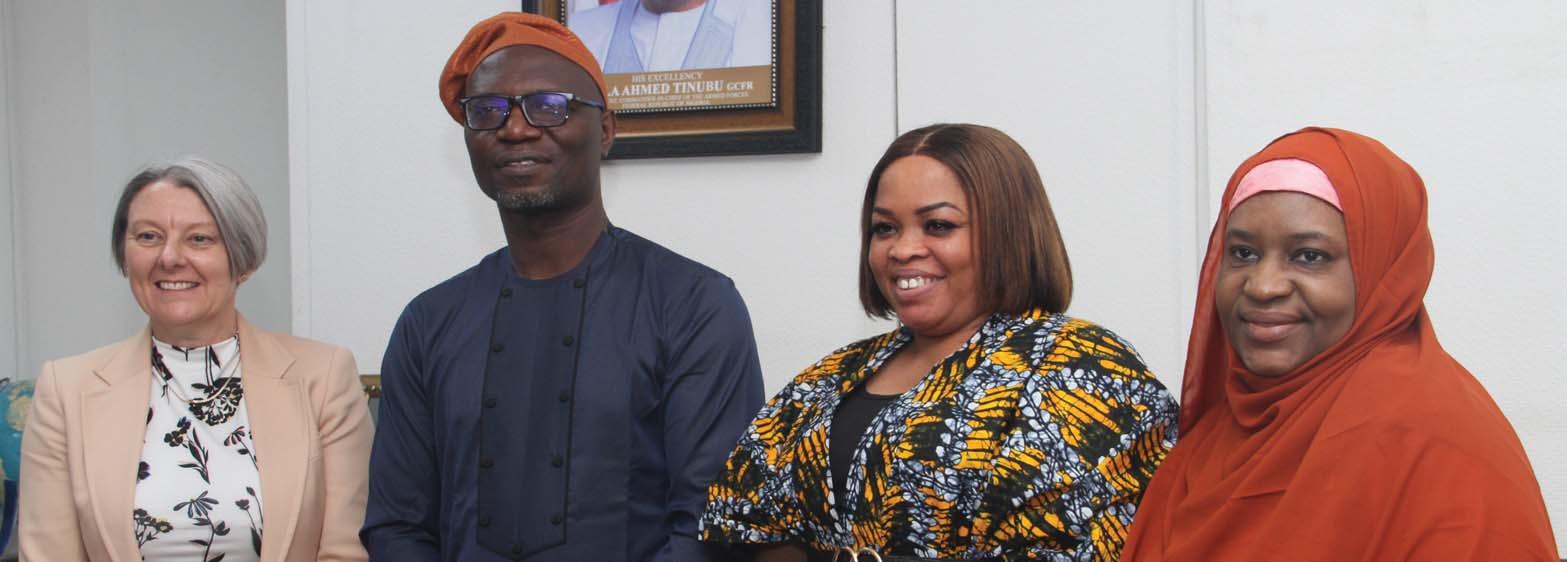
L-R: President, Chartered Institute
African Foundation for Justice, a non-profit organisation dedicated to promoting justice and accountability, has offered a N50 million reward for information leading to the arrest and conviction of the killer of Nigerian singer, Ilerioluwa Oladimeji Aloba, popularly known as Mohbad.
This came eight months after Mohbad's tragic death, which sparked outrage and disbelief in the entertainment industry and beyond.
Mohbad's death on September 12, 2023, was initially attributed to complications from an ear infection.
However, alternative reports alleging that he fell victim to an act of voodoo, locally known as 'juju,' during a performance in Ikorodu, Lagos, sparked intense debate and raised more questions than answers.
Through its media arm, African Television, the organisation has been at the
forefront of advocating justice for Mohbad and supporting the efforts of the Nigerian police in investigating his death.
During a chat with journalists soon after a corona inquest on the death of Mohbad at the Ikorodu Magistrate Court, last weekend, the CEO, Larry Omodia, emphasised the need for justice and urged anyone with credible information to come forward.
“We believe that DNA testing should be conducted as part of the elimination process of the possible motives of Mohbad's death. We encourage anyone
with information to help Nigeria, help Mohbad, and help mothers and fathers crying worldwide. Let's ensure we give Nigeria and Africa the justice needed," Omodia said.
The foundation also plans to organise a “Sing for Mohbad” tribute concert in September to
keep his memory alive.
“As the quest for justice continues, the African Foundation for Justice remains committed to supporting freedom of the press and redeeming Nigeria's image as it encourages Nigerians and the world to join the movement and
demand #JusticeForMohbad.
“If you have any information, no matter how small, please come forward. Together, we can give Mohbad the justice he deserves. Send all useful information to the African Foundation for Justice,” Omodia added.
Gaming regulators from 23 Nigerian states have raised concerns over the Federal Executive Council (FEC) recent decision to grant a 15-year concession to Messrs Yuan Resources Limited for deploying a revenue assurance platform in
ANALYSTS WARN CONTINUOUS HIKE IN MPR DETRIMENTAL TO ECONOMY AS MPC MEETS TODAY
in order not to create a different impression, especially when the Bretton Woods Institutions are urging the bank to do more.”
Uwaleke said, “If I were a member of the MPC, I would vote for a hold position, as the aggressive policy rate hike is taking a toll on output. Production is stifled because of very high cost of funds.
“Moreover, the seeming over reliance on the MPR as a tool to tame inflation does not appear to be making any meaningful impact due to the significant non-monetary factors driving inflation in Nigeria, such as high cost of energy, transport as well as insecurity in the food-belt regions of the country.”
Managing Director/Chief Executive, SD&D Capital Management Limited, Mr. Idakolo Gbolade, also said, “I expect the MPR to be further increased by the MPC because the committee believes that raising interest rates is the solution to tame inflation.
“However, I believe the committee should put a hold on the prevailing interest rate and tackle other factors fuelling
inflation, like high cost of goods and services, skyrocketing costs of food items, high energy cost and insecurity that has raised cost of agriculture production and reduced agricultural production due to inability to access the farm.
“Continuous increase in interest rates is hurting major manufacturers and SMEs who must pass high production cost to consumers.”
On his part, Managing Director/ Chief Executive, Dignity Finance and Investment Limited, Dr. Chijioke Ekechukwu, said, “If I were part of MPC, I would vote to hold the MPR. This is because the CBN needs to observe and see the impact of the 400 and 200 basis points raised, respectively. They need to profile and isolate the impact of other factors outside the monetary policy.
“Food inflation cannot be reduced by tightening monetary policy, for example. High petroleum prices have their own effects on inflation.
“Exchange rate volatility also contributes to the woes of the economy. In Nigeria's case, the more the policy rates, the more inflation.
the lottery and gaming industry.
The decision, made on May 14 and 15, 2024, comes under a Design, Finance, Build, Operate, and Transfer (DFBOT) arrangement.
The Federation of State Gaming Regulators (FSGR) warned that the development might be sub judice, as the Supreme Court is currently handling a related case, Suit No. SC/1/2008, between the Attorney General of Lagos State and the Attorney-General of the Federation.
The case, it said, seeks to interpret Section 4(7) of the
1999 Constitution regarding gaming regulation authority in Nigeria.
The FSGR emphasises the constitutional right of State Houses of Assembly to regulate lotteries and gaming activities. Section 4(7) of the 1999 Constitution grants states legislative power over any matter not included in the Exclusive Legislative List.
Furthermore, the constitution's supremacy is underscored by Section 1(1) and (3), stating that any law inconsistent with the Constitution is void to the extent of the inconsistency.
The FSGR called for the federal government to acknowledge the constitutional and judicial positions on gaming regulation.
It urged President Bola Tinubu, the Senate President, the Speaker of the House of Representatives, and other key officials to uphold the rule of law and suspend any actions related to the concession until the Supreme Court delivers its verdict.
Despite proposing solutions like adopting the South African Gaming Regulatory Framework to the National Lottery Regulatory Commission
(NLRC), the FSGR said it had yet to receive a response.
“The FSGR’s member states continue to stress the need for federal compliance with the constitutional provisions and respect for state legislative powers to ensure stability in the gaming industry,” it added. The signatories included regulators from states such as: Abia, Akwa Ibom, Anambra, Bayelsa, Benue, Cross River, Delta, Ebonyi, Edo, Enugu, Ekiti, Imo, Kogi, Nasarawa, Ogun, Ondo, Osun, Oyo, Plateau, Rivers, Taraba, Lagos, and Kaduna.
Aibe Emenyonu in Benin City
The John Odigie Oyegun Public Service Academy (JOOPSA), has announced the training of no less than 10,000 workers since its inception in March 2023.
Managing Director of the academy, Mrs Precious Ajoonu who said this in a statement in Benin City, yesterday , added that the workers were not just trained but equipped with the necessary skills to support the effective implementation of government's transformational policies.
She listed the tools as Public Finance Management, Ethics, Artificial Intelligence, Machine Learning and Basic Computer Appreciation Skills and other
soft and hard skills.
According to her, the academy leveraged on internal and adjunct faculty made up of top subject matter experts, to be able to deliver on its mandate of training a workforce that is sensitive to innovations in a changing environment.
Noting that JOOPSA is a well-structured and strategically positioned flag ship on the venture to secure an intelligent and forward-thinking work place in public service in Edo state, Nigeria and in Africa, she said for the academy to succeed, it took a look at series Z of corrective actions.
She listed them as: "Creating a change coalition, called the Inter-Ministerial Counterpart Team (IMCT), made up of all
the Directors of Shared Services and set up a government innovation hub/tech lab to promote digital upskilling within the service.
She stated that they also created a Course Catalog made up of foundational courses such as Public Service Fundamentals, Project Management, Change Management, Professional Etiquette for Public Servants, Building High Performing Teams, Leadership skills training, Public Finance Management, Ethics, Artificial Intelligence, Machine Learning and Basic Computer Appreciation Skills -and other soft and hard skills.
Besides, Ajoonu said JOOPSA was also passionate about diversity and inclusion and
had created courses intended particularly for women inclusion in public service, an aspect designed to champion gender equality.
"While JOOPSA’s impact continues to grow, focus is now on developing mechanisms towards its sustainability. As the Pioneer Director General, I recognise this as the opportunity of a lifetime, which has potential to change the trajectory of the public service and how citizens interact with government.
“We are in the process of developing and drafting a competency model for Edo State, together with our technical partners Development Alternatives Incorporated (DAI)," she asserted.
Onyebuchi Ezigbo in Abuja
The candidate of the Labour Party (LP) in the last Imo State governorship election, Senator Athan Nneji Achonu, has said that he almost lost his life to gunmen during the election.
Narrating his ordeal to journalists shortly after a special family thanksgiving at the Holy Trinity Catholic
Church in Maitama - Abuja, Achonu said his was attacked by some gunmen suspected to be policemen during one of his campaign trips around the state.
According to him, “We went through a lot in the last governorship election in Imo State. I survived an assassination attempt, and until now, the people involved in the alleged crime -some
Yinka Kolawole in Osogbo
Climate experts drawn from the University of Lagos, Lead City University, Ibadan, and the Nigerian Institute of Social and Economic Research (NISER) are set to tackle climate extremes in the country.
The landmark collaborative research code-named ‘A PanAfrican and Trans-disciplinary Lens on the Margins - Tackling the Risks of Extreme Events (PALM TREES)’, was jointly conducted by Research Teams in an efforts to beam searchlight at climate extremes.
Speaking at a stakeholders’ meeting over the weekend, one of the researchers, Professor Mayowa Fasona of the University of Lagos, noted that such extremes include floods, droughts, heat waves and their impacts on the marginalised rural and urban populations.
The don stressed that PALM-TREEs research project is funded under the Climate Adaptation and Resilience (CLARE) Programme of the UK International Development and Canadian International Development Research Center (IDRC).
Omon-Julius Onabu in Asaba
Indications of a fresh wave of ethnically related tension have emerged in Warri North Local Government Area of Delta State over who, between Ijaw and Itsekiri, should produce the next council chairman in the election fixed for July 13 by the Delta State Independent Electoral Commission (DSIEC).
This followed warnings of readiness to disrupt the council election by an Ijaw pressure group, alleging that Itsekiri political leaders
from the area have perfected plans to impose an Itsekiri candidate as the next local government council chairman, a plan reportedly presented to the state governor without consideration for Egbema Ijaw that produced the immediatepast council chairman for the first time in the history of Warri North.
Specifically, what has sparked the latest division is the alleged nomination of an Itsekiri, Mr. Festus Asima, as the PDP chairmanship candidate for Warri North council in the coming election.

policemen from the Tiger Base - are roaming the street free.
“In addition to the beating that was meted out on our
party leaders from Mbaise during the election as well my two collation agents, Ihitte Uboma collation agent, Emeka
Nwameru, was kidnapped and later released.
“My cousin, who was my Ehime Mbano Local
Government Area collation agent was kidnapped before the election and up till now we have not seen him.”
The Niger Delta Development Commission (NDDC) at the weekend inaugurated the reconstructed 9km ObehieOkeikpe road, a hitherto abandoned project, in compliance to the presidential directives on abandoned projects. It also flagged off the second
phase of the reconstruction work starting from Akwette to Ohambele leading to Akwa Ibom State.
President Bola Tinubu had directed the new management of NDDC to ensure the completion of all abandoned projects scattered across the nine mandate states of the Commission before undertaking fresh projects.
Speaking at Obehie, Ukwa West Local Government, Abia State, the Managing Director of NDDC, Samuel Ogbuku, said that the management of the Commission has taken the presidential charge to heart and “we have started” the implementation.
He said that “it wasn’t easy” to resuscitate and complete the road project due to due to
inflationary trend since 2022 when the project was started and abandoned by previous management. However, Ogbuku commended the contractor, People’s Concept, for conceding to do the job without cost variation thereby demonstrating that “he is a patriotic Niger Deltan” thereby becoming “.the flagship of our local contractors.”
Ibrahim Oyewale
Kogi Police Command yesterday reassured the residents that the operatives are committed in their efforts to combat all forms of crimes including armed robbery , kidnapping and banditry to ensure the State issave
The Police Public Relations
Officer, William Aya, made assurance while reacting to the allegation that police are accomplice to the kidnappers in Kogi State.
Aya disclosed that there is no iota of truth in the allegation , stressing that the mandate of the Nigerian Police is provide adequate security of lives and property and
tackling of insecurity challenges.
On the operations of the Kidnappers in Kogi State, the PPRO pointed out that there is no specific area that is prone to kidnapping in the State, adding that it is not as if it is happening frequently in particular area because it is a pocket of Kidnapping and when police adopted a strategy to secure the affected area they move to another location.
“They have many modes of operation as investigations revealed .While police are networking along with other security agencies to ensure to nip the it in the bud and contain the their activities in the State”
Dipo inMinna
Niger state Governor, Alhaji Mohammed Umaru Bago, has directed the immediate employment of 1,000 medical workers to fill the wide gap existing in availability of personnel in both the tertiary and secondary health sectors of the state.
This is just as more women have embraced the family planning in
Gideon Arinze in Enugu
10 local governments of the state.
The state Commissioner for Primary Healthcare, Dr. Ibrahim Dangana, disclosed this in Minna at the weekend while speaking at the dissemination meeting of Niger State Family Planning/DMPA-SC performance of the Delivering Innovation in Self-Care (DISC).
Dangana said the administration of Governor Bago, after giving autonomy to the Primary Health
Ministry, has vowed to make the ministry functional with adequate staff and equipment because it is the health facilities closest to the people.
Represented by the Permanent Secretary in the Ministry, Dr. Abdullahi Imam, the commissioner applauded the efforts of DISC for carrying family planning campaign to the rural communities in the 10 local governments of the state,
saying that the Programme is being carried out in conjunction with the state government. He said the state supports any family planning method or solutions that can improve the lives of our women, adding that the essence of family planning is to allow women to space their children and this does not prevent them from having as many children as they desire to have.
Human rights group, the International Society for Civil Liberties and the Rule of Law, (Intersociety) is advocating the complete elimination of judicial technicalities from post-election dispensation of justice.
The group is advocating a complete reformation of the Nigerian electoral court and
voting process, including the detachment of electoral courts, their processes and procedures from those of regular courts.
Addressing newsmen in Enugu State yesterday, the Chairman of the Board of Trustees of group, Emeka Umeagbalasi, said that judicial technicalities have been found to be responsible for over 80 per cent of “brutal judicial
subversion of the electoral wishes of Nigerians.
“The standard practices in developed and developing democratic countries’ Electoral courts are to fundamentally determine the field winners of the valid majority votes cast from among the total lawful cast votes emanating from pulling centers,” he said.
He noted that the the
reformation will also include the provision for independent candidacy from presidency and governorship to state and federal legislative seats.
“It is also important to note that the time has come for general and codified use of electronic and manual voting side-by-side to ensure that citizens are not denied their constitutional rights of electing their leaders.
Okon Bassey in Uyo
Worried by the shortage of hostel accommodation in Nigerian tertiary institutions, the federal government is to build 1, 600-bed capacity hostels for students in tertiary institutions.
According to the Minister of Finance and Coordinating Minister of the Economy, Mr. Wale Edun, the federal government has
earmarked N98.2billion for the provision of modern 1,600-bed capacity hostels for students in tertiary institutions across the country this year.
He disclosed this at the foundation laying ceremony for a 1,600-bed capacity hostel initiated by African Plus Partners in partnership with the Tertiary Education Trust Fund (TETFUND), at the Akwa Ibom
State University, Ikot Akpadem, Mkpat Enin Local Government Area of the state.
Edun, who was represented by his Permanent Secretary, Mr. Udo Ekanem, said the project which would be replicated in 36 tertiary institutions across the six geo political zones of the country is aimed at tackling deficit in hostel accommodation for students.
The minister stressed that the
facility will improve reading and learning culture among students, and lauded the Akwa Ibom State Governor, Umo Eno for his commitment to educational advancement in the state. Eun equally lauded the partnership between the Family Plus Partners and TETFUND, pointing out that the engagement led to the initiative of providing the facility.
A federal high court in Lagos has dismissed a four count-charge of fraud instituted by the Police Special Fraud Unit (PSFU), against an oil marketer, Aleem Suleiman Olaitan. Justice Abdulaziz Anka, in his judgement ordered the Police Special Fraud Unit (PSFU), Ikoyi, Lagos, to release him immediately alongside his properties seized by the police.
The judge held that the prosecution failed woefully to prove every ingredients of allegations beyond reasonable doubt. The defendant, (Olaitan), was first arraigned before the court on March 8, 2016, on two counts charge of alleged false pretence and fraudulently obtaining the sum of $100, 000 USD, from a foreign company, Topkings Partner
(HK) Limited, under the pretence of supplying petroleum product.
The allegations, which he vehemently denied and pleaded not guilty to the charges.
Following his not guilty plea, the prosecution opened its case and called a total of seven witnesses, and tendered some documents, which were admitted as exhibits by the court.
Upon conclusion of the
prosecution’s case, the oil marketer, opened his defence and maintained his innocence on all the charges. At the resumed hearing of the matter on January this year, the prosecutor, Mr. Emmanuel Jackson, an Assistant Commissioner of Police (ACP), who is also Head of PSFU’s Legal and prosecution Section, informed the court of the amended charge against the defendant.
Sabiwork, a pioneering startup based in Nigeria, is poised to transform the landscape of the nation’s construction industry with its innovative service to bridge the gap between project owners and highly skilled professionals.
In response to the pressing shortage of highly skilled workmen in the sector, Sabiwork is introducing a cutting-
edge solution that provides construction stakeholders including developers, engineers, architects, homeowners, and construction companies with highly trained workmen to meet their needs.
With a mission to empower artisans and elevate the quality of construction services nationwide, Sabiwork serves as a comprehensive
one-stop service that not only trains artisans, but also connects them toconstruction stakeholdersseeking their expertise.
Through a user-friendly interface, the platform streamlines the process of hiring experienced craftsmen, ensuring seamless communication and efficient project management.
“At Sabiwork, we recognise
the critical role that skilled artisans play in driving the success of construction projects,” said Olatayo Ajiboye, Founder and CEO of Sabiwork.
“Our service is designed to empower artisans by providing them with greater visibility and access to opportunities, while simultaneously meeting the evolving needs of construction stakeholders in the industry.”
in the Lake. It was about the disastrous American military involvement in Vietnam in the 1960s and early 1970s. Sometime in 1967 or so, with the war going on badly for the Americans and with student-led anti-war protests reaching new heights, US President Lyndon Johnson asked a well-respected Harvard University professor to undertake a tour of South Vietnam and to submit to him a “progress report” on the social and political effort “to win Vietnamese hearts and minds,” as a corollary to the military effort to defeat the Viet Cong Communist insurgents and their North Vietnamese backers. With ample logistic and security support from the American military, the professor undertook the tour and studied such things as the “strategic hamlets program” which the American military built all over the South Vietnamese countryside. When he returned to Washington, he submitted an upbeat report to Johnson and listed in detail all the progress that had been recorded.
President Johnson was very happy. After receiving the report, he asked the professor to brief the ever-cynical White House press corps on his findings. This the Prof did, but as he recounted his optimistic assessment of the Vietnam effort, one cynical reporter shouted, “Come on Prof! You know very well the situation is not as rosy as that!” The Prof’s face suddenly darkened and he said, “Listen! The President asked for a progress report. He did not ask for a situation report! He asked for a progress report, and that is what I gave him. Who is talking about
the goddamn situation!”
Next week, let’s keep our eyes and ears open for progress reports. The brand-new Governor of Kogi State has already kick started this year’s round by widely publishing his 100 days in office report two weeks ago. While he detailed in it the many meetings he attended with fellow governors and with the President’s National Security Adviser, some critics said he did not mention his biggest achievement yet, which was to spirit former Governor Yahaya Bello through the dragnet that EFCC agents spread around his Abuja house.
Many of the progress reports we are going to read this week are likely to list, for example, the number of hospital wards that were built, how much money was spent in providing drugs and dressings to the hospitals, and how many big hospital equipment were imported. Now, that’s a very good progress report, but it is not a situation report because a giant hospital block may have been built that has no running water, electricity or beds and dressings. Or maybe it has all those, but it could be that there is no doctor in the hospital, or maybe there is a doctor but all the drugs supplied had been diverted to private pharmacies.
Similarly, many of the progress reports we are going to read this week about the education sector are likely to enumerate the number of classroom blocks built, the thousands of furniture pieces procured, maybe the number of teachers employed and the millions of naira spent on laboratory chemicals,
limitless taxes, tariffs, and charges on the things that people spend money on daily. The impact of excess tax is on everybody, but the burden is more on people experiencing poverty whose purchasing power has been eroded by inflation. The government cannot tax itself out of our economic predicament. Increasing personal income tax is one way government reduces disposable income to curb demand pull inflation, but the inflation in Nigeria is not because of increase in household income, but caused by cost induced factors. So tax on people whose income have not increased in the past year is a recipe for hardship. Other factors also imperil government efforts to curb inflation. Imported inflation has been the bane of Nigeria, given the number of raw materials and goods imported into Nigeria from countries with high inflation rates. This is not helped by the new exchange rate regime that has seen the Naira fall to its lowest value in a generation. The government has been trying to control the erosion of the value of Naira to no avail. Increasing cost of energy has pushed some businesses to pack up. These factors have exacerbated the rise of inflation, and unless the government starts tackling them, it cannot effectively win its fight against runaway inflation. The consequences of inaction are severe and far-reaching. The system requires a set of anti-inflationary measures to relieve the people and companies so that livelihoods can improve, and real incomes recover from shock to encourage people to live and save. Savings and prosperity will fire up investment, production, supply, and consequent demand. If inflation worsens, the economy will, at best, go into stasis, further regression, and possibly a depression. More manufacturers will quit, and unemployment will worsen with even more crime and insecurity. The picture I painted above is not far from us.
Recent statistics about the hunger level in Nigeria occasioned by food inflation are alarming. There is a deteriorating food security and nutrition crisis in Borno, Adamawa and Yobe (BAY) states this lean season between May and September 2024. According to the Government-led Cadre Harmonise analysis released in March this year, in Borno, Adamawa, and Yobe states, some 4.8 million people
textbooks and school equipment. This is also a good progress report but it is not a situation report because it will never mention that many classrooms are still overcrowded, or that many pupils still sit on the floor, or that many pupils run round for hours because there is no teacher to teach them. Or perhaps there is a teacher, but he is not qualified to teach because he did not pass his own Grade II or NCE examinations. Or maybe he is qualified to teach, but does not do so because he is poorly motivated and the old arrangement of the much-feared Visiting School Inspector no longer exists today.
One of the most misleading elements in progress reports is that government officials put too much emphasis on amount of money spent. A report will state, for example, that so many billions were pumped into health care, on scholarships, on school feeding programs, on infrastructure etc but all that is nearly meaningless given the level of waste and corruption in our government agencies. One of the most discredited government programs in modern times are poverty alleviation schemes. They are often so opaque and so disorganised that officials in charge greatly enrich themselves, instead of alleviating poverty. It is apparently a world-wide problem; the right-wing American writer George F. Will once wrote in Newsweek magazine that “if all the money voted by New York City for anti-poverty programs actually went to the poor, they will be rich by now.”
Hehe! If all the money voted by our
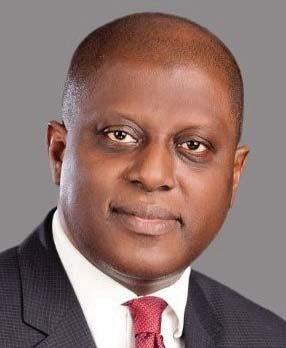
are estimated to be facing severe food insecurity, the highest levels in seven years. Children, pregnant and lactating women, older persons, and people living with disabilities are among those who are most vulnerable. About 2.8 million of these people need urgent interventions. The prices of staple foods like beans and maize have increased by 300 to 400 percent over the past year because of a cocktail of reasons. Inflation is outpacing the ability of families to cope, making essential food items
unaffordable. Furthermore, the report stated that "malnutrition rates are of great concern. Approximately 700,000 children under five are projected to be acutely malnourished over the next six months, including 230,000 who are expected to be severely acutely malnourished and at risk of death if they do not receive timely treatment and nutrition support." The Acting Representative of UNICEF Nigeria argues that "this year alone, we have seen around 120,000 admissions for the
governments at all levels for fertiliser subsidy, tractors hiring schemes, provision of improved seeds, irrigation schemes, mass housing schemes, poverty alleviation, skills acquisition, Anchor Borrowers, transport subsidy, rural water and electrification schemes, decongestion of ports, revival of railways, new national carrier, mass literacy, hajj subsidy, Ramadan feeding, school feeding, clean-up of oil spills, mass vaccination, erosion control, National Identity Card and public enlightenment programs to mention but a few, had been properly channelled in the last five decades, governments would be happy by now to provide Situation Reports instead of misleading and halftruth Progress Reports.
Since what all the governments will be publishing are Progress Reports, we must leave it to Civil Society Organisations, trade unions, the mass media and opposition political parties, where they exist, to fill the gaps with Situation Reports. If a state governor says he has built 5,000 classrooms for example, remind him that 40% of school age children in his state are still out of school. If CBN says the naira is the best performing currency because it rebounded from 1900 to the dollar to 1200, a CSO should remind it that it leapt from 750 this time last year. If the Minister of Women Affairs says she successfully went to court and stopped a mass wedding of allegedly underaged girls in Niger, an NGO should remind her of the number of out-of-wedlock partnerships and births that took place in Nigeria this month alone.
treatment of severe acute malnutrition with complications, far exceeding our estimated target of 90,000". This statistics are for only 3 states in the Northeast Nigeria. Imagine what it will be for the whole 36 States in Nigeria. There is real fire on the mountain!
This rising hunger is not peculiar to the Northeast. From my knowledge of street economics, hunger and poverty is pervasive across all six geopolitics zones. Increasing poverty is directly linked with more severe economic outcomes. Increasing poverty can result in a more divided society, Issues with housing, homelessness, limited access to healthcare, nutrition poverty and poor living conditions that have a detrimental effect on one's health. Children living in poverty have less access to education, which will reduce their chances in the future. More families facing poverty will experience conflicts, stress, and domestic violence. Poverty can set off a vicious cycle in which the effects of it act as catalysts for additional episodes of poverty. Increasing inflation and poverty are bad omens that blow us no good. They are bad for our economy. They are bad for our people. The government must pay attention to these factors and be more sensitive in our economic policy choices.
Only some anti-inflationary measures that comprehensively capture the macroeconomic dimensions and provide solutions may work. Poverty alleviation measures are barely temporary and, at best, work in the short run to cushion the effect of heightened inflation and food insecurity. The government should provide solid medium- to long-term solutions to tackle these problems. They should re-evaluate some of their policies to see whether they are inflationary and jettison them to allow good policies to thrive. We can only imagine the unintended consequences of allowing poverty and inflation to fester. The increasing inflation and poverty are creating desperation among a portion of society, which is increasingly becoming despondent and seeing itself at the fringes of society. The implications of this are plausible. Many ordinary citizens are burdened by poverty, hunger, and severe inflation, which have made their lives miserable. The government must take action to alleviate this scourge and help Nigerians lead meaningful lives.
Pep Guardiola wins six out of the last seven EPL titles, Arsenal falter again
Imperious Manchester City beat
West Ham 3-1 at Etihad Stadium to become the first team to win the English league title four seasons in a row.
With City needing a win to be sure of holding off Arsenal, who started the final day two points behind but with a better goal difference, Phil Foden put Pep Guardiola’s side ahead after just two minutes.
The England star added another before the break and although Ghanaian Mohammed Kudus pulled one back for West Ham, midfielder Rodri restored the home side's two-goal cushion with a shot from the edge of the area after 59 minutes.
City survived a late scare when West Ham had a second goal ruled out by VAR for handball.
However, their victory was never seriously in doubt.
The win completed a staggering run of 19 wins and four draws since their last defeat in the league, at Aston Villa on 6 December.
City have now won six out of the past seven Premier League titles. Last term, they joined Huddersfield, Arsenal, Liverpool and Manchester United, twice, in winning the top flight three years in a row.
Now Guardiola’s team have achieved something no other
men's side has managed since the English league was formed in 1888, 136 years ago. On 25 May they will aim to
become the first side to complete the domestic double in successive seasons when they face Manchester United in the FA Cup final at
Wembley. It is 15 months since City were hit with 115 Premier League chargesfor alleged financial
irregularity, which they strongly deny. Earlier this season both Everton and Nottingham Forest were charged and deducted
points over breaching profit and sustainability rules. But there is, as yet, no update on when City's case will be heard.

City
Super Eagles duo of Taiwo Awoniyi and Ola Aina escaped relegation from the Premier League following their 2-1 win over Burnley at Turf Moor in the season's final game last yesterday.
However, coach Nuno Espirito Santo left the Nigerian stars on the bench when they travelled to Turf Moor for their final game of the season.
Before the final game, Nottingham Forest were just three points above Luton Town but with a far healthier goal difference. It would have taken a twelve-goal swing for Luton and a Forest loss to Burnley for them to go down.
However, before Burnley could get their acts together, Nottingham Forest put two past them courtesy of Chris Wood.
The Tricky Trees took that lead into the break. Then, Josh Cullen pulled one back for Burnley in the 72nd minute to set it up for a frenetic end.
However, Luton, who were hoping that a miracle would happen in
their favour, were already down 4-2, meaning that Forest were comfortably safe.
Eventually, it ended 2-1 for Nottingham Forest, sealing their place in the Premier League for next season.
was introduced for Chris Wood in the 79th minute but failed
to score.
Meanwhile, Aina was an unused substitute as he sat out the final day fixture.
Aina’s future seems settled already, as there are talks that Nottingham Forest wants to hand him a contract extension after a decent first season.
Leicester City midfielder, Wilfred Ndidi, has expressed appreciation to Nigerians for their prayers and support during his trying times with the EFL Championship side.
Ndidi, who was part of the victorious Leceister side which won the EFL Championship and gained promotion back to the English Premier League (EPL), has been on holiday in Lagos.
Olawale Ajimotokan
Francis Epe successfully defended the eTranzact Golf Classic organised by Professional Golf Developmental (PGD) Tour after beating Andrew Oche Odoh by two strokes at IBB International Golf and Country Club, Abuja.
Epe hit 13 greens and nine fairways in regulation en route a third consecutive 71s that cushioned him to 2 under par overall for the tournament.
Ibrahim Ocheje grossed +4 over par 220 to place third, seven shots adrift the winner.
Odoh, the country’s erstwhile top player, struggled for accuracy off the tee on the front as he mounted a determined challenge to upstage Epe, but was undone by nerves and poor condition of the golf course.
Epe, who will be playing on a tour in Florida, US later in the year, went home with N3 million cheque.
He said playing against Odoh

However, Awoniyi could be on his way out, with West Ham touted as a potential destination. But they could be sceptical about signing him because of his poor injury record since he joined Nottingham Forest from Union Berlin in the German Bundesliga. and other top players brought the best out of him.
“I am so excited to win today because it was not an easy task playing with former Nigeria’s No.1 Andrew Odoh. It brought out my best, calmed me down and I played very well.
“From the first hole, I resolved not to miss the fairway because of the grassy condition of the golf course. So, I hit my ball- fairway-green. My second ball was on the green and I was taking my two putts. Anywhere I had a chance for a birdie, I went for it. Any shot I needed to save, I saved,” he said.
The Ikoyi Club 1938 player, also confessed having special feelings to win the tournament because the Chairman of Meristem, Oluwole Abegunde was his mentor, who assisted in his development, giving him access to the Meristem gym and his apartment both at Lakowe Lakes, Lagos.
Reacting on the tournament, the Managing Director/CEO of eTranzact, Niyi Toluwalope, said the event surpassed the expectations of the organisers.
“We are happy that the investments we made to partner with and support this venture has paid off.
“We are looking forward to next one where we will provide additional resources and ensure the quality remains consistent and get quality feedback like we have received so far,” he said.
He has also paid courtesy visits to the Chief of Staff to the President, Femi Gbajabiamila, and the Minister of Sports, John Owan Enoh in Abuja.
The Super Eagles midfield enforcer posted photos from his visit on social media, appreciating the government officials and Nigerians for their support to him and other Nigerian athletes.
“I wish to thank all Nigerians who supported and prayed for me during my injury and long layoff
when I missed the Africa Cup of Nations Cup," Ndidi wrote. The midfielder missed the 2023 AFCON in Côte d’Ivoire due to an injury he suffered in December while playing for Leicester City. He also extended his heartfelt gratitude to Gbajabiamila for encouraging him during difficult times.
Ndidi also thanked the minister of sports for checking up on injured and sidelined Nigerian athletes, and for his help at a crucial point in the footballer’s life.
Ndidi said he was proud to be a Nigerian player. “I am greatly encouraged to participate in sports development and to wear the green and white jersey of this beautiful country," he stated. Ndidi is expected to be part of the Super Eagles team for the World Cup qualifiers against South Africa and the Benin Republic.
Nigeria’s top long jumper, Ese Brume flew into the country’s team yesterday with her 6.87m jump at the adidas Atlanta City Games, in USA.
Brume began her campaign with a 6.68m in the first round and 6.58m in her second round jump before leaping to a personal season’s best mark of 6.87m, one centimetre above the 6.86m qualifying mark set by World Athletics
In the men’s sprint, South Africa’s Akani Simbine ran an incredible 9.90 world lead to win the 100m event at the adidas Atlanta City Games. It sent a warning to his rivals that the South African sprinter was back . African record holder and reigning African and Commonwealth champion, Ferdinand Omanyala came in second in 10.00 while Nigeria’s Udodi Onwuzurike ran
a 10.12 personal season’s best to placeFavourfourth.Ofili is Africa’s fastest woman in 150m after the Nigerian ran a blistering 16.30 seconds at the adidas Atlanta City Games on Saturday at Piedmont Park in Atlanta, Georgia, USA. The 21-year-old has thus supplanted Cote d’Ivoire’s





Okonjo-Iweala Disowns WhatsApp Message
“It's been brought to my attention that another fake message has been manufactured and is being forwarded on WhatsApp in my name. I want to make clear that this fake message is not from me. I am pleased that those who know me instantly recognised this as fake" -Director General, World Trade Organisation (WTO), Dr. Ngozi Okonjo-Iweala, debunks allegations that a post circulating onWhatsApp originated from her.

In nine days from today it will be May 29, the biggest political anniversary in Nigeria when the Federal and most state governments will be marking the first, fifth or in one case, the last anniversary of their stay in office.
On Wednesday next week, President Bola Tinubu’s federal administration will be marking its first full year in office. So, in the North West zone, will be the Governors of Sokoto, Kebbi, Zamfara, Katsina, Kaduna, Kano and Jigawa. All of them, that is. In the North East corner, the Governors of Borno, Yobe, Gombe, Bauchi and Adamawa will all be celebrating their fifth full year in office. The JJC among them is the Governor of Taraba, who will be marking his first anniversary. In the North Central axis, first anniversary celebrations will be on in Plateau, Niger and Benue while the Governors of Kwara and Nasarawa will be marking their fifth full year in office. The Governor of Kogi, who is the baby governor in the country, has just celebrated his first 100 days in office and does not have anything to mark on May 29.

In the South West region, unless the Yoruba Elders’ renewed clamour for restructuring drowns it, Governors of Lagos, Oyo and Ogun will be marking
their fifth year in office. However, off-season elections have disorganised matters in Ekiti and Osun, so May 29 is not an anniversary date in those two states. Nor, over in the South East, is it an anniversary date in Anambra or Imo, both of them thrown off balance by off-season elections. In Enugu, Ebonyi and Abia however, governors will mark their first full year in office. In the Niger Delta too, May 29 will be celebrated as the first anniversary mark in Cross River, Akwa Ibom, Delta and Rivers, but not in Edo, where the governor is already packing his bags to leave in November, or in Bayelsa, where the governor has just started his second term in office. It is a long-standing tradition in Nigeria for federal and state governments to present reports to the public on the anniversary of their coming to office. Even the old military governments did that. In fact, some military regimes promoted their coup anniversaries above the October 1 Independence Day, such as the Babangida regime with August 27 and the Abacha regime with November 17. While the military regimes had no terminal dates of rule that we knew
BENEATH THE SURFACE
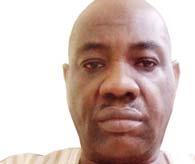
of, we now know that all the first term Federal and state administrations have chopped 25% of their four-year tenure while the second term state governors have already chopped 62.5% of their maximum eight-year tenure.
So, what are we to expect next week? Lots of reports, many of them published in the newspapers and online media, while the airwaves will be awash with them. The late Major General Joseph Garba said in his book Diplomatic Soldiering that when, as young officers they were being sent to Congo in the 1960s, the General Officer Commanding the Army, Major General J.T.U Aguiyi-Ironsi, told them at a departure parade that, “You must write reports, lots of reports, but reports are reports!” To our Presidency and our state governments, you must write anniversary reports but anniversary reports are anniversary reports!
What kind of reports should we expect? All of them will be described as Progress Reports. Which set me thinking about a passage I read nearly 30 years ago in Frances FitzGerald’s classic 1972 book Fire

An increasing number of Nigerians are being driven into poverty, not by choice, but by the current political and economic climate, shaped by stringent macroeconomic policies. These policies, such as subsidy removal, devaluation of Naira, and increase in electricity tariff, have had unintended consequences. For instance, removing subsidies has led to a significant increase in the cost of living, while the devaluation of Naira has made imported goods more expensive. These factors, combined with the high level of insecurity, have affected food security in Nigeria, and created a perfect storm of economic hardship. The signs of this unavoidable reality are readily apparent. The interventions to prevent this descent into poverty are either ineffectual or remedy the condition too slowly.
An unprecedented rise in inflation has destroyed households' disposable incomes and pushed many families
into poverty. Spiralling inflation is having a devastating impact on all, but especially on households in the lower rungs of the working class, who in their millions are joining the already over 133 million multidimensionally poor Nigerians struggling to earn a living because high inflation has eroded the value of their income. As shown by the NBS Consumer Price Index of April 2024, published in May 2024, the headline inflation rate rose to 33.69% in April 2024 compared to March. The headline inflation rate was 11.47% higher in April 2024 compared to the previous year. During the same period, inflation in urban areas was higher than in rural areas. Even worse, the food inflation rate in April 2024 was 40.53%, increasing by 15.92% compared to April 2023. What does this mean for the ordinary citizen? More money can purchase fewer goods and services.
We cannot dismiss the direct correlation between rising inflation and rising poverty in Nigeria. A household
with a monthly income of N300,000 in April 2023 would have lost 33.69% of its real purchasing power if it earned the same amount in April 2024. This means that the same amount of money can now buy significantly fewer goods and services, putting a strain on the household's budget. Imagine this household struggled in 2023 to make ends meet; how will it cope with less than 33% of its value in goods and services this year? It is little wonder many Nigerians are in despair and are calling on the government to tweak its policies and salvage the situation before it is too late. Families in the earning bracket mentioned above are even better than many whose total income is less than N100,000 if both parents in the household earn minimum wages per month.
The government intervention so far, with the best of intentions, has yielded little result as inflation continues unabated. The monetary policies of increasing base interest rates to above
22%, improving the cash reserve ratio by banks to above 40%, and constantly engaging in the money market to mop up excess liquidity have yielded less than the expected result in curbing inflation. More is needed, and my little knowledge of street economics shows me that the Nigerian economy often defies some fundamental economic concepts that work in developed countries because of our economy's informal and unregulated nature. The Nigerian government must creatively use other bespoke and practical fiscal and monetary measures to tame our raging inflation.
Paradoxically, there is compelling evidence that inflation continues to rise because of critical government policies. Instead of providing more concerted anti-inflationary measures, the government has added more inflationary steps to the economy. The government cannot confront inflation while imposing